Weekly Writing Summary For The Week Ending 6/20/2024

Claude Monet:
On the Bank of the Seine, Bennecourt (1868)
This One's No Exception
My first great-grandparents had an asparagus farm on what would become The Hanford Reservation. In 1940 or so, the War Department bought their farm and their neighbors' farms, even the nearby town. For my great-grandparents, this sale was a godsend. They bought a small house on Pine Street in Walla Walla and retired in greater ease than they'd ever imagined experiencing. My mother remembered visiting their tarpaper shack where only the parlor had proper wallpaper, the other rooms were papered with newspaper to keep out the drafts. Nobody was ever allowed in the parlor. Today, Richland, Washington, where The Muse and I stayed last night on our way to the State Democratic Party Convention, to which we've been elected delegates, is part of the third largest metropolitan area in the state, with over 300,000 inhabitants. My mom remembered before Richland existed when adjacent Kennewick consisted of a single gas station/grocery next to the ferry. There were no bridges across the Columbia River. The Army used those former asparagus fields to centrifuge the plutonium used to blow this world to kingdom come, leaving behind a permanent superfund site that fuels this city's continuing growth. When I was a kid, we referred to this place as The Dry Shitties rather than their formal name, The Tri-Cities. There were good reasons General Groves chose this place in the first place, perhaps chief among them, the preexisting desolation. It's growing like a weed because weeds always grew best here. Every prior generation secretly believes their world's headed for Hell without the requisite handbaskets. This one's no exception. Thank you for following along through my Fambly Stories!
RaggedBegending

Josua van den Enden: Kaart van het oude Gallië
[Map of ancient Gaul] (1627)
"I might just have too much left to learn or too much left to forget …"
I introduced this Fambly Series ninety-two mornings ago, three full months. Since then, I have created a fresh installment every day. This story will forever be number ninety-three, the final one, a ragged ending and also a ragged beginning for whatever follows, a RaggedBegending. As those who follow my writing already know, I deliberately avoid deciding my route too far ahead of my present. Nature abhors tidiness even more than it abhors vacuums. It demands an uncertain orientation, a welcomed not-knowing rather than another clever plan. Life should properly feel disorienting, lest we lose some critically important facility. We can connect our own dots, thank you very much. We do not natively need anyone to tell us what their story means for that's for each witness to decide. As the writer here, I work hard to disclose what I'm coming to know. This series has been the most enlightening one I've created so far. Even now, though, I see better than when I started just how much story remains to discover and to tell.
Fambly seems everyone's proper occupation.
Protege

Jacob Matham, After Hendrick Goltzius:
Hendrick Goltzius, a famous Protégé (1617)
" … this series comes to you due to the steadfast patronage of The Muse …"
I am a kept man. Though this arrangement should seem shameful to both my patron and her Protégé, we've worked our way into acceptance of the way our lives have become. I was The Muse's Patron for a time, encouraging her to steal what was once my consulting company if she wanted to become a consultant. She succeeded in satisfying my injunction and ultimately succeeded me in managing that firm, much to the betterment of us and that firm. When the firm went bust in the not-so-great 2008 Recession, we were both thrown out of our profession. We were a month away from losing everything when The Muse was offered and accepted a job. As I mentioned earlier, her employer had no notion of how The Muse would engage when fulfilling that position, and she remained a surprisingly resourceful contributor until after that hiring boss retired. She became the money earner and I became her Protégé, not that I was in training, mind you. Protégé is the proper term for anyone receiving patronage. Most of the greatest artists throughout history have received patronage and were also "kept," much to the benefit of succeeding generations of art appreciators.
Our economic notions lean heavily toward the Self-made Man theory of vitality, that success demands no less than economic viability.
Entrepreneur

Pierre-Auguste Renoir:
Portrait of Monsieur Choquet (c. 1875)
"She remained a puzzlingly successful handful …"
I fear that these final installments of this Fambly series might have become too confessional, though I suppose it might be acceptable to tell all in the interest of fuller disclosure. I wanted to avoid creating one of those silver-plated tin sculptures so often offered as family history. I aspired to include actual history and not simply the mysteries and highest points on the excursion. I might have shown both the best and worst of times and thereby come close to presenting as it actually was, given that we have no clear translation of the manners of living from century to prior century. I assume enough without trying to edit out inevitable dirty laundry.
That said, I eventually became an Entreprenuer.
Dismemberment

Meester van Antwerpen (I) (attributed to):
Christus predikt over scheiden
[Christ preaches about divorce]
(1485 - 1491)
"Some experiences just come to pass …"
The data seems straightforward: birthdate/place, marriage, birthdates of children, death date/place. Almost nobody got divorced in the old old days. The church forbade it. Monarchs would occasionally seek a pope's dispensation and sometimes receive it, though even kings were expected to show some restraint. The third time anyone pleads ignorance after they married another first cousin, even a pope might lose patience and insist that such close relatives should try harder to get along. I think of divorce as a more modern phenomenon, but it's almost as old as marriage. Several of my ancestors carried on with something like informal plural marriages, never working very hard to hide their mistresses. This practice, though, was publicly frowned upon as unseemly. One was expected to keep their dalliances private, especially when with a commoner. Infidelity among the upper classes might have been common, but the details were rarely considered to be worthy of common knowledge.
I call my first divorce my Dismemberment because it pretty much tore my life apart.
UrbanPioneer

Max Liebermann:
Dutch Village Scene with Hanging Laundry (1890)
Nearly three years later, I graduated from Portland State University with a BS Degree in International Marketing, a field I was neither qualified for nor deeply interested in entering. My University education sort of happened to me, my primary interest being to get through it in as short a time as possible and with minimal fuss. Betsy, my first wife, had grown increasingly impatient to start a Fambly of our own, and my education was standing in the way of realizing that goal. In the end, or near the next beginning, 'we' became pregnant and our son Wilder was born three months before I'd graduate with my BS Degree. The degree itself, though, worked its magic as I had already been promoted at the job I'd taken to pay for that education. I became a supervisor before I'd even graduated, overseeing a small unit of clerks responsible for processing unusual payments. I was in no way qualified for that position, either.
That final quarter of school was a challenge.
ThePotWizard

Randolph Caldecott: A dainty dish. (Undated)
"Me, eternally ThePotWizard …"
Everyone stumbles into and back out of different personas as they proceed through life. After I left The Old Home Place, I began to think of myself as David, the single acoustical performer, complete with an agent who would book me into inappropriate venues. There might not be any better way to master any skill than to attempt to deploy it in inappropriate venues, places where the audience is not particularly predisposed toward acceptance. Most would rise no further than indifference, reinforcing that nagging sense that I was an imposter pretending to mimic myself, a common notion among any budding creative class member. I persisted so that when my to-be first wife, Betsy, finished her university studies, completed her mandatory three-month practicums, and found her first professional job—In Northeast Pennsylvania—, I had convinced myself that I was a songwriter of some prominence. I hadn't hit it big yet, but success tends to be elusive in those contexts and should not be confused with anything other than ordinary. I accompanied her backward toward an Eastern Eden at the other end of our Oregon Trail.
After years of living in shared apartments in Sleezeattle, finding and renting our own apartment back east seemed terribly grown up.
Weekly Writing Summary For The Week Ending 6/13/2024

Ueda Kōchūex: Boy on a Bull (late 19th century)
Nothing Like Finished Producing
Something clicked as I worked my way into the part of this series that involved recalling my history rather than recounting my ancestors'. It felt as if I'd recovered some sense I'd misplaced along the way. I'd chalked that absence up to aging, considering that I might have been losing some cognition and had settled into attempting graceful acceptance, when there it was back again. I suited up and engaged in some chores I'd been too effortlessly procrastinating, understanding that I hadn't lost anything after all. Perhaps I'd just stalled. Maybe I'd needed a break from my routine if only to reassert some overt expectation again. Maybe I can still make my own decisions and choose to do what I probably would have expected myself to do anyway. There's ultimately never any running away from responsibility in this Fambly. I have considerable history to represent here in the present. I still have some history to create, too. I'm nothing like finished producing yet.
Becaming

Francisco José de Goya y Lucientes:
Boy on a Ram (1786/87)
"I had been Becaming all that time before."
I lived at TenFifteen for thirteen years, from when I was five until I was eighteen. I did not grow up there, certainly not completely. I continued growing up there. Mostly I was Becaming. Becaming occurs as a result of aspiring to become something. While still aspiring, you have not yet become whatever you aspire for. Later, you might surprise yourself to see that you achieved that dream, or some significant piece of it. Then, the effort expended might seem as if it was more than mere dreaming. Then you notice that you've changed and that you're no longer a mere aspirant, but that you embody an actual achievement. You had been Becaming. There was scant evidence that you were making much in the way of progress until you manifested the difference as if by magic.
Those thirteen years seem absolutely magical in retrospect.
TenFifteen

1015 Pleasant Street, Walla Walla, Washington 99362
46.06265478666864, -118.31136536454669
My Old Home Place
" … some curious cross between Tom Sawyer and Swiss Family Robinson."
My fambly moved into TenFifteen Pleasant Street when I was five. It seemed more like a haunted mansion than a home then, cavernous and grand. The yard, almost an acre, seemed bigger than the whole neighborhood around SixFortyFour. The back fence abutted onto a neighbor's horse pasture which featured actual horses that would nuzzle us through the wire. An enormous pipe swing sat in a side yard, near a large brick barbeque. Trees covered the upper two-thirds of the lot: an apricot, a pear, and an enormous ancient crabapple. A matched pair of birches framed the front yard along with a gnarly ancient locust and a silver maple beside the driveway. Spirea anchored a wide porch that stretched clear across the front. A huge mock orange and numerous ancient lilacs framed the left of the property, along with a sharp spruce and a triangular rose garden with the sweetest Peace rose I've ever smelled. Iris beds graced the front and back yards. A Mulberry tree shaded a long pipe clothesline between the house and the large detached garage. This house would amplify my sense of living in a Walt Disney movie to some previously unimaginable Nth degree, complete with a Tom Sawyer Island in every way superior to the actual one in Disneyland, California.
This would become my birth Fambly's Old Home Place.
SixFortyFour

644 N Seventh Street,
Walla Walla, Washington 99362
46.07182° N, 118.34825° W
Google Maps® Street View (2012)
"An older woman who remembered pioneer days lived across the street."
I grew up in a Walt Disney movie. After all those generations preceding me, I became the fortunate son of the inheritors of all that history, Bob and Bonnie Schmaltz (nee Wallace.) They met and fell deeply in love in Condon, Oregon, marrying in 1945 amid a controversy of their own making. Bob had been born Catholic. Under the ever-watchful eye of his grandfather and grandmother, he was raised Old Catholic, the kind tempered by ample suffering for the faith. His grandfather ruled with an unforgiving iron hand. Had he not died by then, he would have been appalled when Bob agreed not to be married by a priest in the Catholic church. My mom would not consent to catechism classes. After centuries of her family practicing what probably passed as Calvinist faith, she was indifferent, even skeptical of religion in general. The priest insisted that no Catholics attend the nuptials, which meant the groom's family could not attend. Nobody could go anywhere in such a small city without bumping into somebody. They began their married life in controversy.
They were doting parents, delighted with their fate.
Modernity

Henri de Toulouse-Lautrec: The Modern Worker (1894)
"Modernity always promised much more than it ever once delivered."
As near as I can determine, Modernity must be in the eye of each beholder. I suspect that every generation stretching back to before recorded history believed itself to be the very soul of Modernity, for how could that not have been? Each successive wave represented the most advanced one to date. There were, in fact, none more current than whichever one was present, even when The Dark Ages overtook previous pinnacles of civilization. Those apparent retreats, too, represented an alternative form of advancement. Progress only sometimes moves forward. Some failures seem like an inescapable part of success.
Most of the history I've been reporting here occurred in a world lit only by fire, an almost unimaginably primitive state for those who have more recently arrived.
Absence

Adam Willaerts: Ships off a Rocky Coast (1621)
"One can genuinely never return home again."
Absence was always a prominent part of my Fambly's history, for even when one of my ancestors fulfilled the role of Lair of some Scottish estate, he was frequently away on business. He might have traveled to Belgium or Holland to oversee the transfer of the wool he'd raised or off on some errand for his Lord or King, for most land was held in feudal trust, and the owner paid his rent in service as well as shares of crops, just like his serfs. Throughout most of The Middle Ages, wars raged in nearly endless succession. The Hundred Years War lasted almost three generations and was fought on the continent. English lords and serfs beat a steady path through Calais to battle away with the French, their first and second cousins. Even monarchs volunteered for Crusades, which could take them away from their homeland for years and often forever. It was no sign of sophistication when people traveled, but most often, a sign of simple obligation.
In my generation, my sister and I felt the need to leave our old hometown to create our lives.
TheStepMother

Eleanor Beauchamp, TheStepMother's Mother
Depiction of Eleanor from the Rous Rollc. 1483
"She was not beheaded by beserver Yorkist extremists."
TheStepMother's mother, Eleanor Beauchamp, Duchess of Somerset, was a fine lady. Married three times, she bore thirteen children in her fifty-eight years. Her first marriage to Thomas Ros, 8th Baron Ros, produced three children and ended when her husband, participating in the Hundred Years' War in France, fell into the Seine during a minor skirmish and drowned. Her second marriage to Edmund Beaufort, 2nd Duke of Somerset, produced ten children, including TheStepMother, their second child, and their second daughter, Joan Beaufort. Edmund Beaufort was a polarizing figure in war and politics. Henry VI assigned him to replace his chief political rival, the Duke of York, as head of all English forces in France. Edmund became notorious as the one responsible for losing all territory won there by the English, thereby ending the Hundred Years' War. He returned in relative disgrace, though the king held him in considerable esteem. Ultimately, the king could no longer protect him, and he was captured and killed by York forces in the first battle of St Albans, the opening volley in what would become The War of the Roses. This conflict would ultimately take two of TheStepMother's brothers, both killed on the same day. Eleanor's third husband, Walter Rokesley, produced no offspring. She died in Bayard's Castle in London, a known Yorkist hangout.
It would have seemed a wise move for TheStepMother to leave Old Blighty.
Weekly Writing Summary For The Week Ending 6/06/2024

Camille Pissarro: Woman Bathing Her Feet in a Brook (1894/95)
Must Be Worth Something
This has been an unusually cool and damp Spring here near the end of the Oregon Trail. It has been perfect weather to contemplate my place in this world. I understand that not everyone can trace their family's history back many generations and that I must be incredibly fortunate to have found traces of ancient ancestors. I admit that these discoveries have given me a radically fresh perspective on who I must be and a sobering realization that few of the characteristics commonly considered inheritable actually are. Still, even imagined inheritances might make some significant difference. The self-confidence I feel knowing I had powerful ancestors seems to be making some difference. My sense of self seems unusually elevated now. My usual sense of isolation has become a story I struggle to believably repeat. I feel less alien and more at home, neither in any way negative sensations. So, while these sensations might not result from inheritance or evolution, they still seem to make a real difference in the quality of my experience. This series has been the most enjoyable for me to write, and that enjoyment must be worth something in the larger scheme of things.
AfterEden

Russell Lee:
Child of Migrant Worker in Car, Oklahoma
(1939, printed later)
"If we're fortunate, we'll stumble into another …"
After The Muse and I went bankrupt in the not-so-great crash of '08, we were exiled into an unwanted but necessary adventure. The Muse found an unlikely job that required her (us) to relocate from what had been our Eden Near The End Of Our Oregon Trail to a suburb of Washington, DC. We didn't have to worry about mistaking there for any place near any Eden. It stood about as far from Oregon as anywhere on this continent could. It prominently featured many attributes that would motivate any half-witted emigrant to head out across any hostile continent, but there we were for that time as if working off some debt to society or ourselves. We got extremely fortunate in ways that never would have found us had we stayed safely ensconced in our Eden. Back there—for it certainly seemed as if we'd taken a giant step backward—gravity didn't work right, yet things seemed to turn out all right, or all rightish, from the outset. We found as close to a perfect place in what would turn out to be the ideal suburb for us. We found decent, helpful neighbors. That most un-Eden-like place came to feel like another Eden to us, especially when we compared it to where we might have ended up.
Throughout my lifelong migration, good fortune has dogged my paths.
EdenAtTheEnd
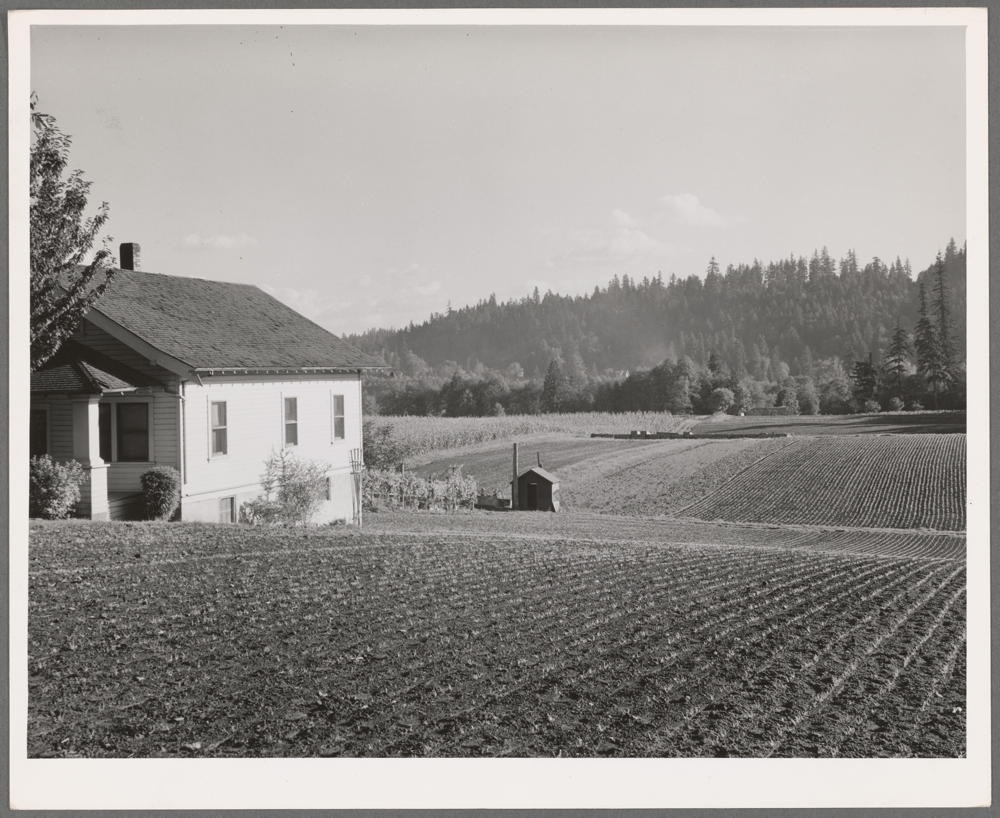
Russell Lee:
Fall spinach. Willamette Valley,
Clackamas County, Oregon (1941)
"We were guilty of a tenacious innocence …"
The EdenAtTheEnd of the Oregon Trail was both everything dreamed of and a severe disappointment. Despite all the focused aspirations, nothing about the underlying human condition turned out to be any different there. People continued to be born and retired at just about the historical rate. It didn't turn out to even distantly resemble Heaven on Earth, though it seemed plenty close enough after the centuries of trials required to arrive there. The weather offered more rain than most thought necessary, though it somehow avoided the deluges remembered from the Appalachians, Tennessee Valley, Missouri, and Nebraska. Tornados were gratefully unheard of there. Snowfall was rare, and the soil ranged from fair to absolutely heavenly. Roads were muddy, but enough unwanted trees stood that they could be harvested to create corduroy roads. Resources at first seemed infinite. Salmon in the Spring routinely came in enormous sizes; one fish would be the capacity of a buckboard wagon. We complained about having to eat fresh salmon more than a couple of times each week. It was readily available for seven in season.
The natives barely noticed our arrival, and those that did either died of our diseases or were quickly subdued and moved to reservations away from the more promising of these promised lands.
TheTrail

Carleton Emmons Watkins, Isaiah West Taber:
Mt. Hood and the Dalles, Columbia River, Oregon (1867)
"Those of us who were born in Eden …"
Few modern travelers could tolerate even a day's distance in a Conestoga wagon, especially on what passed for roads between 1840 and 1870. Especially in the earlier years, the so-called Trail was more rumor than actual, an asperation much more than a manifestation. The journey was challenging, even for those accustomed to traveling by Conestoga wagon. It was slow, even for those experienced driving oxen. It was dangerous, too, though not usually due to unfriendly Indians. The travelers themselves tended to be their own worst enemies. They insisted upon bringing heirlooms they could not bear to leave behind in the care of relatives. They brought too much frivolous stuff and not nearly enough of the essentials. They carried enough innocence to carry most more than two thousand miles across some of the most hostile and forbidding territory few of them had ever previously even imagined. They traveled The Oregon Trail.
Before 1880, every member of my Fambly that came West seeking their Eden at the end of TheTrail, came by The Trail.
Plantation

Print by anonymous artist: Tobacco plantation (circa 1745 - 1865)
"We Americans are nothing if not overflowing with contradictions."
The Plantation became the British means of colonization before Henry VIII's reign. He broadened and deepened the institution, employing it as the primary means for subjugating enemies and employing otherwise idle citizens. He began the large-scale use of indentured servants in the service of state-owned agricultural enterprises. Each Plantation was run like a stock corporation, with the labor considered just another commodity required for production and humanity at best a side consideration. At the time, England had laws that insisted anyone without a profession was required to labor for a better, a better being anyone of greater means. Part of the justification for chartering the Virginia Company, which oversaw Jamestown and other early Plantations, was to put idle hands to work. It was a strategy to subdue the rabble through forced employment.
All but one of my forebears arrived in this country as some sort of servant.
Scotch

G. Woolliscroft Rhead:
And last of all, they burned him to ashes at the stake.
Thus came Faithful to his end. (1898)
"I feel wealthy in stories, indeed!"
In my twenties, when I was imprinting on what would become my preferences in liquor, my peers chose everything but the Scotch I selected. The other choices never tasted right to me. Bourbon tasted like Sugar Corn Pops®, and not in any pleasing way. Vodka struck me as better used as a cleaning fluid. Brandy tasted far too sweet. Tequila fully qualified as horrid! Scotch offered exotic flavors with a caché of mystery. I preferred Dewars with a twist of lemon, an order that reliably raised one of the waiter's eyebrows in response. I presumed the eyebrow signaled a highbrow sign that he suspected I must know what I was doing. Honestly, I never knew why I'd chosen that one. It just seemed proper to me. Later, when selecting a Single Malt, I gravitated toward Dewars' offering, Abefeldy, without once suspecting that fifteen generations of my forebears had lived near Aberfeldy in Lanarkshire, on the Blackwood estate there. Several had been declared Laird of the place, fer cripes sake!
My last installment of this history followed Robert Weir from Ireland to Massachusetts and Oregon through his great-great-granddaughter, my great-great-grandmother, Elizabeth Lovelady Bounds.
Scotch-Irish

Thomas Frye:
Young Man with a Candle, from Life-Sized Heads
(1760)
My Scotch-Irish ancestory stretches back to House of de Vere, part of William The Conquerer's entourage in 1066. Scotch-Irish immigrants to the New World colonies resulted from failed immigration policies implemented by the British government in Ireland since at least Henry VII's reign in the first half of the seventeenth century. The English Civil War a century later served to exacerbate further the difficulty as both Oliver Cromwell and his successors fought to subdue the Irish and their infernal Catholicism. One continuing strategy had been the creation of The Ulster Plantation, a plan to overwhelm the native Irish chieftains by resettling their ancestral lands with Scottish Presbyterians. The Chieftains felt obligated to fight back, which they did with great ferocity, continually losing, resulting in The Troubles. Northern Ireland remained unstable and hostile, resulting in multitudes of fleeing Presbyterians. It would have to have been that some of those who would ultimately become my forbears would have come from the Ulster Plantation. No shortages of them came to this country during the early eighteenth century.
My Scocth-Irish forebears, Robert and Martha Ware, and family came to this continent under Rev. James MacGregor during Queen Anne's War to escape religious persecution in Ulster.
Weekly Writing Summary For The Week Ending 5/30/2024
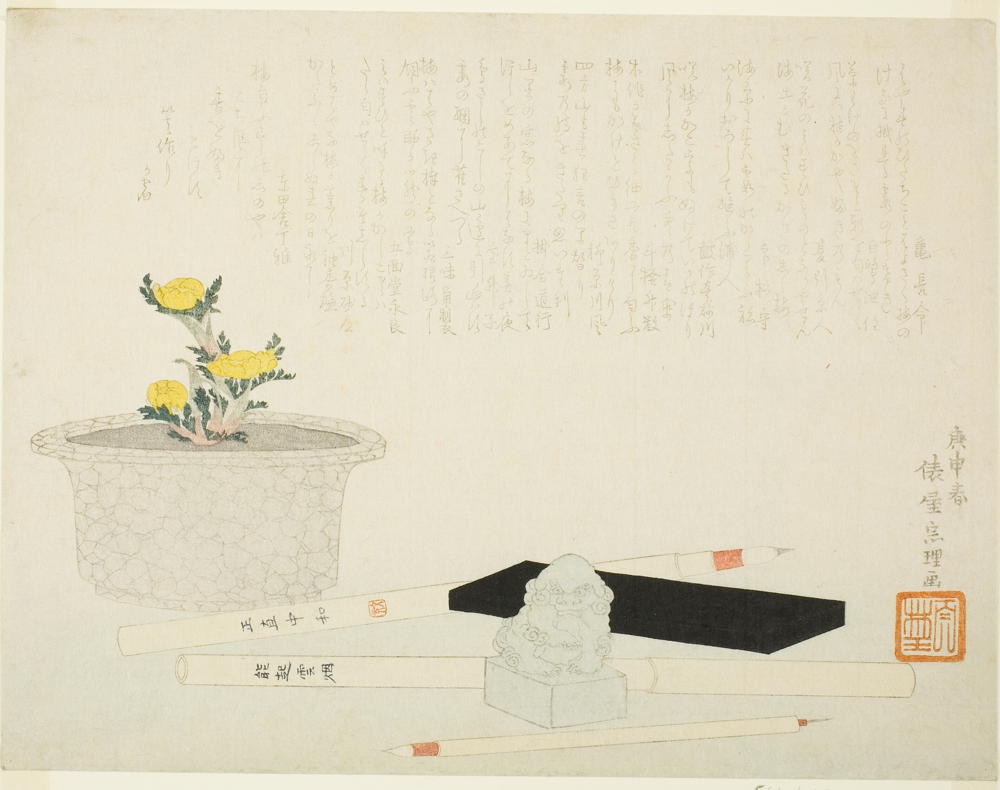
Hishikawa Sori III:
Potted adonis with writing implements (1800)
Delving Into History Insists
Delving into history seems like an inherently dangerous activity. While nobody can ever honestly foresee their future, the same holds for foreseeing their history, for it couldn't have possibly been as expected. The very nature of forebears seems mysterious, just like nobody ever understands the underlying nature of their parents' relationship’s covenant. It's not exactly a secret but of another context, not for anybody but the principles to ever profoundly comprehend. No amount of study will ever unwrap the underlying mystery, though even superficial study seems likely to uncover previously unrecognized elements. The same holds for distant ancestors as it must for immediate family. Dealing with more distant relatives erases the more closely shared context immediate relatives share. I have no possibility of anticipating the lives of relatives who spoke now derelict languages in places impossibly different than any surviving place in this world. Their motives must leave me clueless. Their morals simply must seem questionable. Delving into history insists upon me exercising my most generous possible interpretations.
Colonization
King Henry VII of England-
Lord Howth was his cousin by marriage,
and a reliable supporter of his Tudor dynasty
"We seem too stupid to survive."
I fear this story will contain little but venom, for I'm finally understanding the meaning of British aristocracy. It was traditionally a means for legally stealing property under various Might Makes Right Statues going back into antiquity. If people had been respectful and decent, they would have had no good reason ever to violate their neighbor's sovereignty with bogus claims of superiority. I'm afraid it became a habit inherited from antiquity. Those who didn't commit atrocities justified by some deity seemed to have been the rare exceptions. They produced little history due to the traditional difficulty of producing an acceptable story once your head's been separated from your body. Service in the Roman Army seems little different than service in the British or the French or the Spanish; it was all slash and burn, kill and eventually be killed, futility elevated to lifestyle. A few enjoyed great wealth, but only when it was possible to enjoy a celebration atop a mountain of moldering bodies.
Norman/British lords invaded Ireland in the late twelfth century under the justification that controlling the Eastern edge of Ireland would make it more difficult for a hostile power to launch an invasion from there.
KatherineSwynford
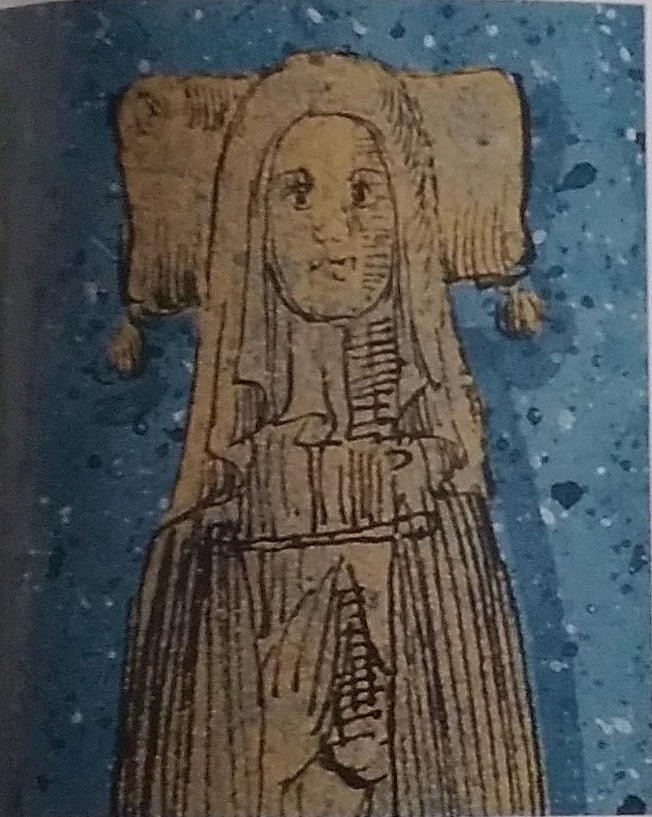
Unknown Artist: Katherine Swynford,
from her tomb, Lincoln Cathedral (1403)
"Swynford was an exceptional presence."
My eighteenth great-grandmother was born Katherine de Roet in 1349, in Hainaut, a territorial lordship straddling the current border of France and Belgium, the daughter of a knight. She came to England as a child when her father accompanied Phillippa, a daughter of William of Holland, when she married King Edward III. She was raised in the English royal household and reportedly started working there when she was ten, tending to the royal children. One of the king's sons, John of Gaunt, nine years Katherine's senior, knew her well. Katherine married Hugh Swynford, one of Gaunt's knights, at thirteen, a common enough age for noblewomen to marry then. Swynford owned a fiefdom but a poor one. Katherine dedicated herself to caring for the estate, Kettlethorpe, after Swynford died in Aquitaine in 1771 while on a military expedition with Gaunt, leaving her with four children.
Katherine was in and out of the King's and Gaunt's employ after that.
VisitingHistory
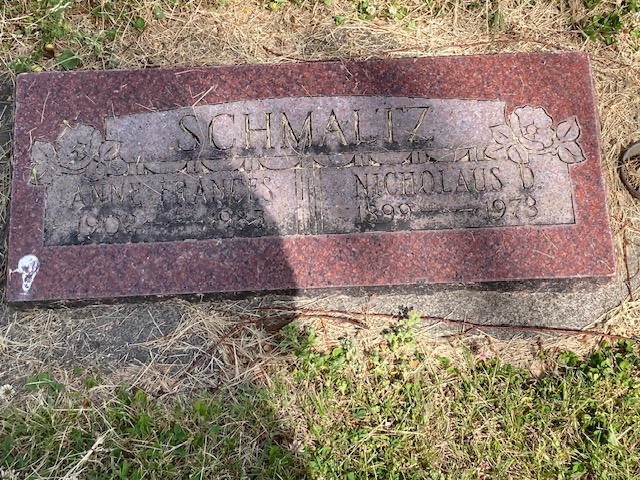
Gravestone of Nicholas Daniel Schmaltz,
my fraternal grandfather
" … grateful for the one day each year reserved for performing the obligatorily impossible …"
I didn't make the funeral. I was living in Seattle on an unheated sleeping porch with my to-be wife. Those days, I traveled by thumb, taking to an onramp or highway verge and sticking out my thumb. It took about half a day to travel back home that way and another half day to return. I begged off so I didn't see where they'd buried my grandpa Nick. We were not close. He and my father had a prickly history and a distant relationship, which rubbed off on the kids. When I was in high school, he and his second wife lived almost across the street from my best friend's house, but I rarely stopped by. Later, they relocated to be closer to her daughter’s family. Nick had been in failing health when he died, not unexpectedly, just a year older than I am today. He became history, but I was not there to witness his inauguration.
The Muse had been after me for years to drive up to visit his grave.
FakingHistory
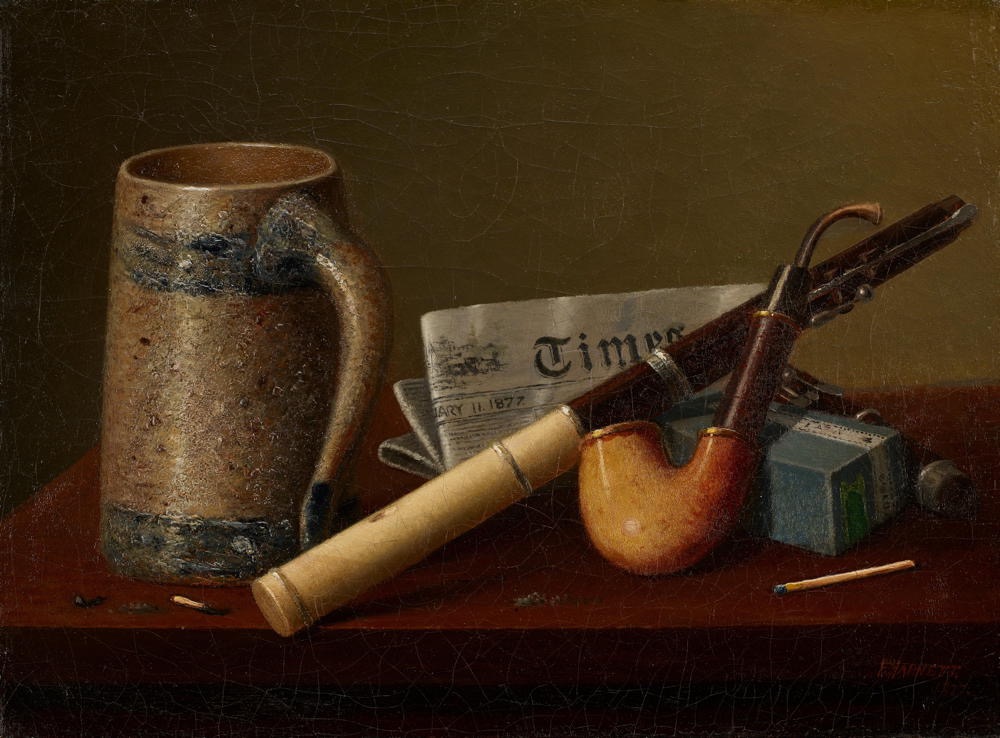
William Michael Harnett:
Still-life with Flute and Times (1877)
" … nobody has a better foundation than the notoriously unstable shifting sands of time."
Genealogy was never a precise practice. It always relied upon iterated approximations such that its research reliability inevitably degraded. Even the more recent entries can be subject to misinterpretation or faulty memory, and not even recent memory is likely to be all it was cracked up to be. Studies suggest that we interpret experiences even as they occur, replacing unfamiliar details with more readily recognizable ones. Most of this business can be the soul of innocence rather than malign intent or deliberate misrepresentation. Still, some of whatever's uncovered requires judgment to interpret, and humans have grown notorious for unconsciously laying their thumbs on scales. Given a choice between two interpretations, we're likely to select the one that preserves our narrative rather than one that contradicts it, even when we know that experience frequently contradicts precedent. We're usually more interested in maintaining coherence than disturbing it.
All this seems to be the very soul of innocence.
LivingHistory
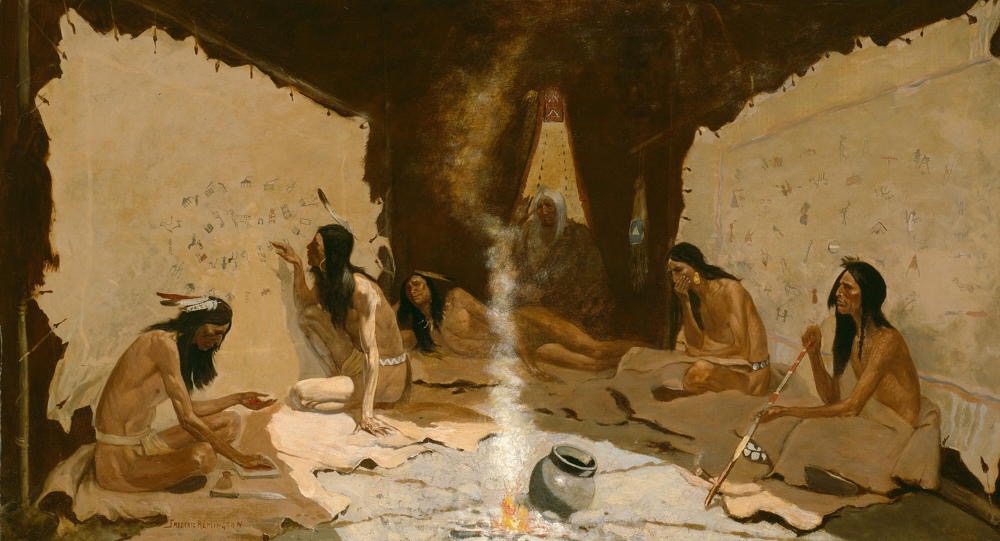
Frederic Remington: Historians of the Tribe (1890–99)
"Cicadas, like history, spend much more time in the ground than they ever spend making noise."
For most of my life, my history has lived in a series of loose-leaf binders, papers separated by surnames, compiled by my Aunt Colleen and her aunts and great-aunts. I occasionally visited these documents to refresh my memories before replacing them back in their basement banker's box repository. When I finally started trying to comprehend the stories, I quickly found nearly overwhelming additional evidence that considerably expanded what I'd always considered my history by centuries. Now, the volume of material should properly prove impossible to remember and also essentially impossible to chronicle. The material I've dredged up creating this series will never be subjected to my Aunt Colleen's scrutiny and organizing abilities since she has already been gone for more than thirty-five years: history.
I feel moved this morning to wonder just where my history resides.
Romance

Antonie Wierix (II), after Maerten de Vos:
Kerkvader Ambrosiusm [Churchfather Ambrosium] (1585)
" … even though my forebears just passed through."
When I entered first grade, I spoke as if I'd come from Missouri, close enough to Southern that I was immediately enrolled in a special speech class so I could learn to speak correctly. I had never lived in Missouri, though most of my Mother's forebears had at least passed through there on their way West. Several had initially considered Missouri their objective, but a short stay within that swampy, gray country convinced them that any place would be better than that fever-ridden territory, even Texas. Fortunately for me, they mostly eventually migrated on to Oregon, though they retained their twangs through the two or three subsequent generations. My grandfather, whose name was Elza, pronounced Elzie, spoke with a lightly amused drawl, mispronouncing many words to my ear. Those were the days before television, before the great homogenization of American English that came from tuning into Southern California every evening. Radio dramas still employed stereotyped ethnic dialects that would curdle my granddaughters' ears and even make me blush. Still, we were reared on Katzenjammer Kids German and Chef Boyardee Italian, whicha was good enougha fur me! I had been unaware that I had been pronouncing my words incorrectly.
I was exposed to properly rolled Rs and final syllables; neither had seemed necessary beforehand.
Weekly Writing Summary For The Week Ending 5/23/2024
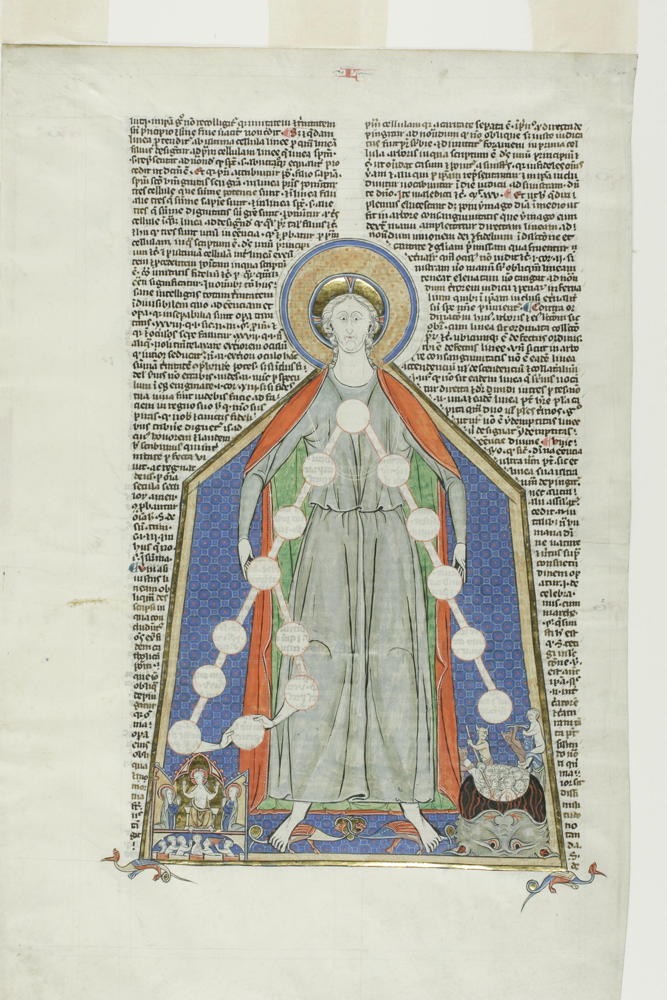
Text by Henri of Segusio, Artist unknown: Table of Bigamy,
from the Summa Super Titulis Decretalium Completa (1275-99)
The Only Other Option
I have become weary of my history. I've been too long at the fair. My investigation began as all investigations start, with that mixture of excitement and mystery and the promise of imminent discovery. The discoveries have come almost non-stop, but once I managed to bring together all the disparate threads to my birthplace, I lost impetus. I couldn't quite see the relevance of continuing further. I found some interesting sidelights and notable features here and there along the old timeline. Still, I felt like I had started gilding lilies and wondered how relevant my later discoveries could prove. Was I just muddying up my story with so many coda embellishments? Was I inadvertently producing a rococo history of a rather ordinary family? Very little of my history seems present in my generation. I cannot change anybody's past, though my Fambly's past might be in the process of changing me. I'm here on the pointy end of history where marriages, births, and deaths continue creating FreshHistory like volcanos create fresh territory. My past has inexorably changed me. I might just as well believe it has changed me for the better. The only other option would be worse, and there's no leverage in believing my future's worse than my past.
PowerfulWomen
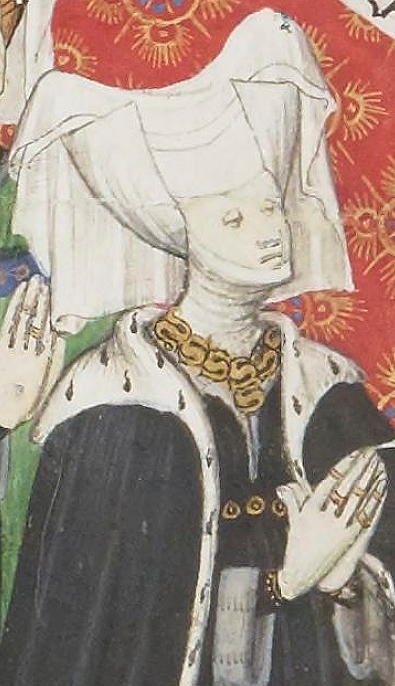
Meister der Münchner Legenda Aurea:
Joan Beaufort, Countess of Westmoreland as wife of Ralph Neville,
from an image in the Neville Book of Hours (1430-35)
" They created the new worlds their husbands just imagined."
No Fambly's genealogy could ever be understood without acknowledging the role PowerfulWomen played. The histories might be relatively thin on the details describing their influence, but they were just as crucial to creating history as the most noteworthy male. Charlemaigne's second wife (of four), Hildegarde de Vintzgau Herstal, was married at 12 or 13 and traveled with her husband on his military campaigns, dropping nine babies all along the way, including a set of twins and a future king of Italy. She thereby secured her husband's legacy. She died at 26 in childbirth. It's said that she was the grandmother of every subsequent king of England and France, not to mention that one of Italy.
Each generation featured equally PowerfulWomen.
ArcOfHistory
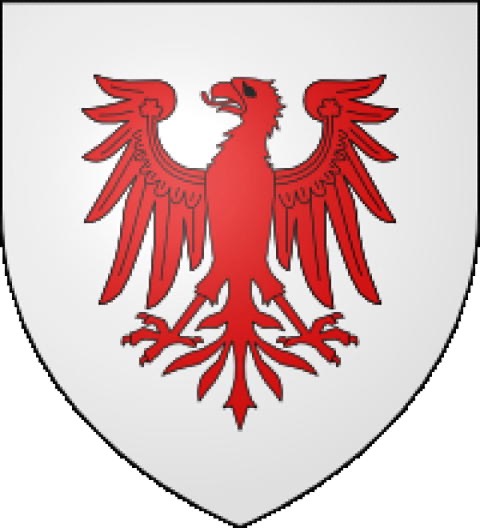
Shield of Ansbert Ansbertus Gallo De BRANDEBOURG,
supposedly my forty-fourth great-grandfather (circa 510)
If you struggle to follow my descriptions of my Fambly history, you're in decent company because I struggle, too. I cannot determine if the more ancient history amounts to truth or fantasy. Even the experts give mixed reviews. I have apparently been reporting the more popular history, the one that the experts find most suspicious. Early Frankish kings reportedly published lavish histories to legitimize their rule. Their ruse, if it was a ruse, largely succeeded in at least creating a ruling myth that convinced most that they were authentic, whether or not they were. I hold questions about how Romans managed to pivot into prominence within both the Carolingian and Merovingian dynasties, both precursors to more modern French and English rulers. The short answer should seem obvious enough. They succeeded by strategic marriages. Wed the daughter of a king, and you became the doted upon son-in-law, and certain avenues open that would have otherwise been closed. If my Fambly history was ever more than mythology, my forebears slept their way to the top, the most old-fashioned of the many old-fashioned ways.
And the top they did achieve.
Genetics

Pieter Serwouters:
An Allegory of Relations between the Generations (1608)
" … the historical record seems clear."
I imagine that one day, somebody will discover a way to reconstruct my Fambly's entire history by analyzing DNA. Then, the birth and death details and the Fambly Tree's intricate webs might become definite and unquestionable. Until then, though, reconstructing a Fambly's history remains relatively painstaking. Between transcription errors and superficial differences of opinion, any two researchers’ results might remain eternally unresolvable. After all, the original principles will never be here to settle any of the many inevitable differences. Who I am will remain a steadfastly subjective question with a slightly less than even any distantly objective response.
Still, science continues her inexorably stroll.
Cohorts
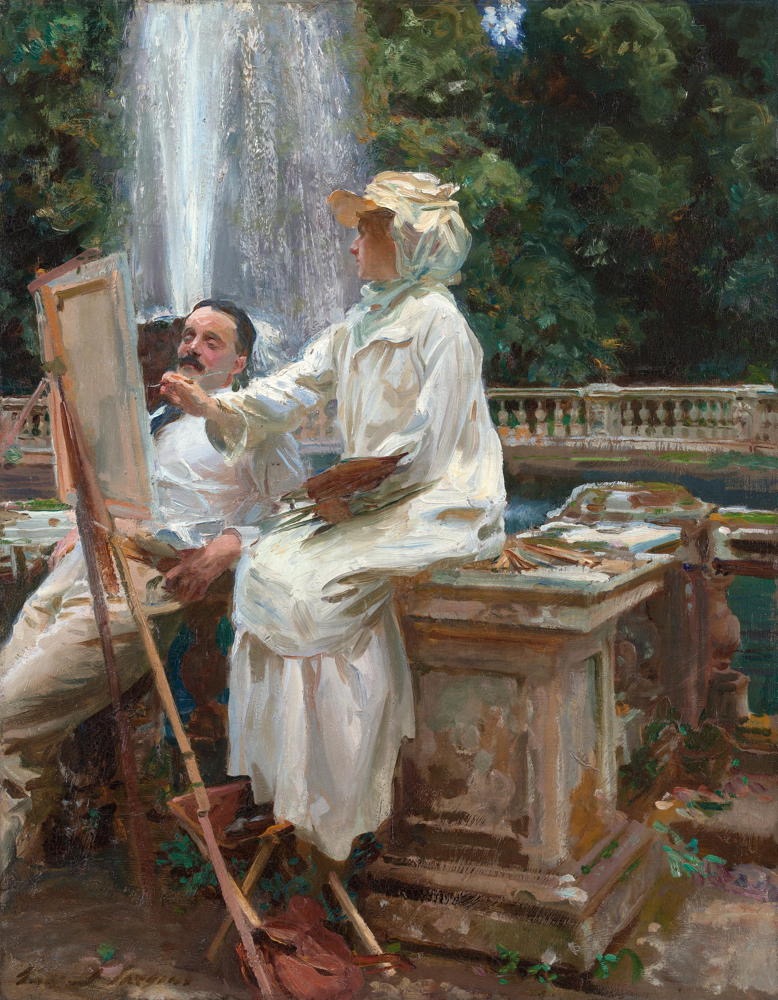
John Singer Sargent:
The Fountain, Villa Torlonia, Frascati, Italy (1907)
" … not merely as mythical rugged individuals."
The typical Fambly tree tells much less than half a Fambly's story, for family constitutes only part of anyone's usual Cohort. We're unavoidably rooted in Fambly, but most of us choose to stray from the founding fold into different country. We marry out of the Fambly, or most of my forebears did. We also often work far away, seeing even our closest blood relations perhaps only on holidays, a scant few days each year, if that. We usually most distantly relate with those to whom we're most closely related, once intimate but later almost strangers. We retain those traits and characteristics native to our Fambly. After all, we did learn the fundamentals together. We probably retain speech and behavior patterns we learned before we became aware of learning anything, our relations appearing in common quirks and similar phrasings.
We spend most of our time on this Earth with Cohorts: work buddies, acquaintances, friends, and neighbors.
DearlyDeparted
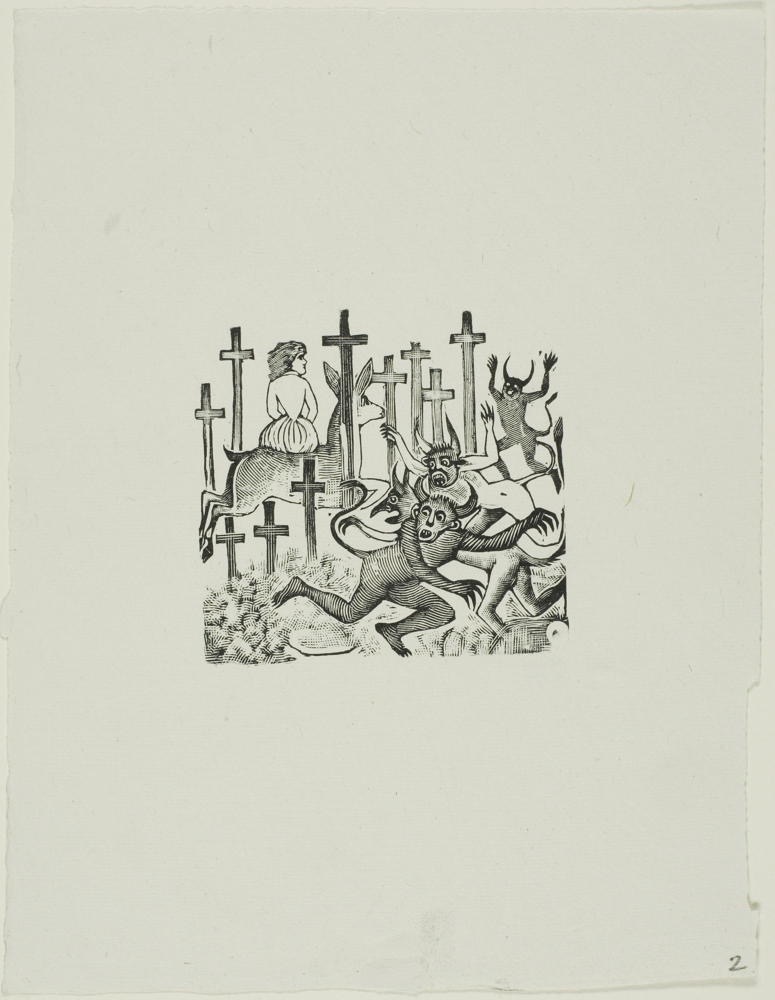
José Guadalupe Posada:
Devils in the Graveyard (n.d., circa 1871-1913)
" … not yet wholly history …"
I have visited few of my ancestor’s final resting places, though The Muse and I have tried to visit all we could over the years. We found traces of my earliest immigrant forebears in a well-weathered gravestone for my first Pilgrim great-grandmother preserved in a wall in Guilford, Connecticut. I found a fourth great-grandfather, Major George Currin's stone, in the town cemetery in Galax, Virginia, the one carved by his sons before they left for Oregon. I found Silvanus Seward, another fourth great-grandfather's stone, overgrown in an almost abandoned upstate New York cemetery. I never met any of these revered ancestors personally, though. In my life, I’ve met only the most recent tier of ancestors, most of them just before they became ancestors when they were still grand and great-grandparents, aunts, and uncles. I've even lived long enough now where I've known some contemporaries and their offspring who left before me, none of them ancients yet; I think of each of these as the DearlyDeparted.
Those who lived centuries ago might spark my imagination and even garner heartfelt admiration, but I never actually knew them, so my affection feels distant.
FreshHistory
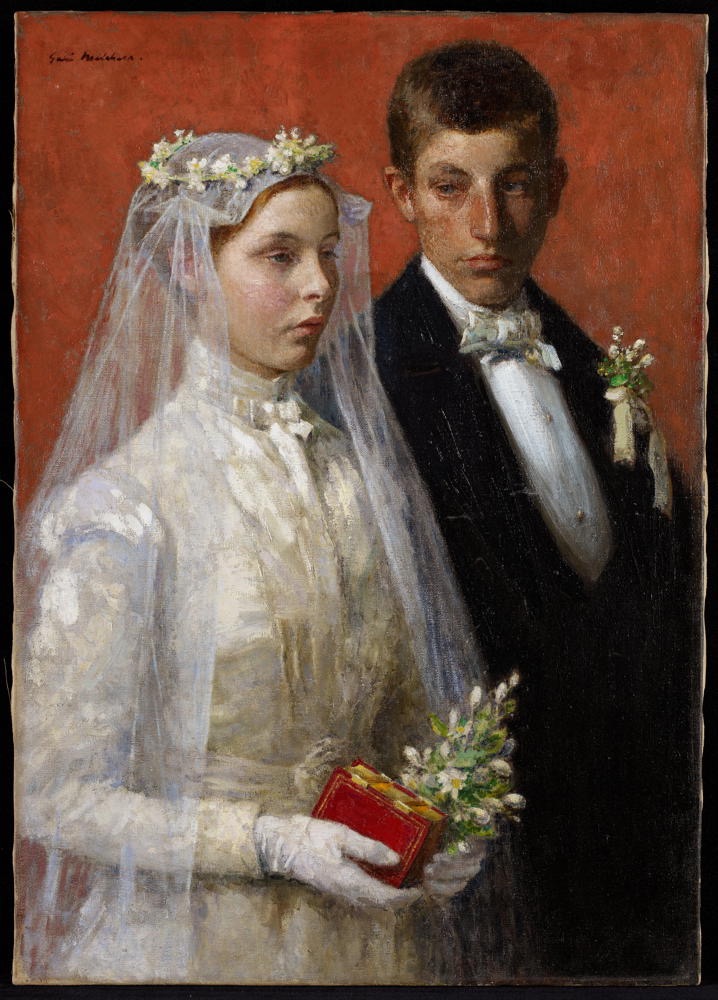
Gari Melchers: Marriage (1893)
" … we attemded a banquet."
Every present moment inexorably slips into some past, but not every past qualifies as history or aspires to. I might best describe much of everyday experience as maintenance, not in any way a similar substance to what might inexorably become history. Births, deaths, and marriages seem destined to become history, while the memory of Tuesday's supper doesn't seem likely to make it to the end of that week. Every moment might ultimately reek of significance. What wouldn't we give to have a portrait of a typical Tuesday supper from the Middle Ages? Events must have seemed as disposable and unimportant to our ancestors then as our odd Tuesdays seem to us now. That said, though, we occasionally engage in making FreshHistory, moments that seem likely to become posthumously noteworthy, worth remembering, and entered into the permanent record.
For The Muse and I and close Fambly, one of those events occurred yesterday with the marriage of our dear GrandOtter.
Weekly Writing Summary For The Week Ending 5/16/2024
Honoré Victorin Daumier:
“Sir… Sir… Siiiirrrr… Christ, it’s annoying to have a colic
when the supervisor is supervising,”
plate 13 from Professeurs Et Moutards (1846)
Some Statement of Gratitude
I carefully tot up the page views each of my postings receives through the week to create what I call my TotList. This one-page weekly writing summary serves as my analytics since the analytics others provide don’t work for me. I understand that my analytics would seem primitive to anyone in the actual business of analyzing web traffic, but my writing’s nobody’s business but mine, and I don’t care about making money posting it. I seek some confirmation that you, my audience, have been out there. Unlike many of my much more famous royal ancestors, I don’t seek fealty from my readers, and I’m proud for my writing to serve as no more than a mild, if regular, distraction from more troubling issues. I count views because I care that someone’s there, that these stories end up somewhere. Some weeks, like this last week, my stories produce far fewer hits than my other doings. One photo of a plate of oyster shells might receive twice the number of views as the best of that week’s stories, as if that mattered. What matters for me here must be the engagement. That’s what gets me up and writing even when I can’t quite decide what to write about. That’s what encourages me to produce these Weekly Writing Summaries, even though they’re by far the most difficult posting I produce each week. I delight in framing each writing week, however difficult, in some statement of gratitude. Thank you for following along.
FeepingCreaturism
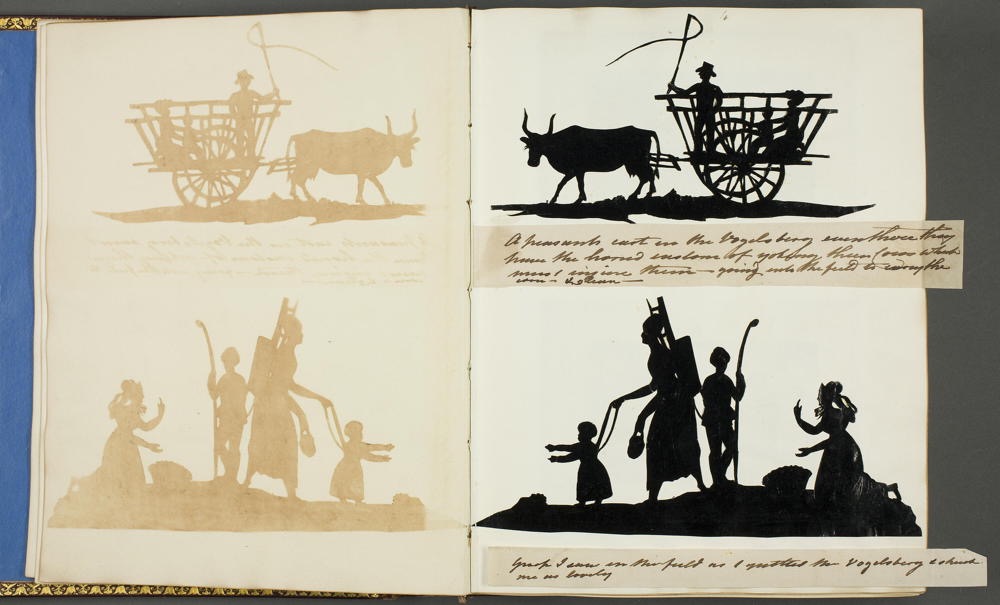
Various Unnamed European Artists (19th century),
compiled by Queen Adelaide of England:
Queen Adelaide’s Album (1823–1837)
" … something quite the opposite of an encyclopedic rendering."
The arc of history seems to trend toward the ever simpler. What starts as complexity resolves into simpler forms through extended iteration until it might almost seem routine. We eliminate apparent meaningless effort to focus activity toward producing results, dropping ceremony in favor of what we firmly believe to be ever greater efficiencies. Left to its own devices, genealogy would probably eventually smother itself with ever-greater detail, for every life has always been lived at one-inch-equals-one-inch scale, so every representation can be found to be wanting: another clever exposition, another sidebar comparison, another history lesson to better outline the then present context. The genealogist never rests. He's always looking for additional angles. Without care, any Fambly's history might mature to become precious, even self-conscious, when it probably should have remained in some much simpler forms.
Engineers use the term FeepingCreaturism to label this tendency for something to become ever more complex in development.
DeconstructingHistory
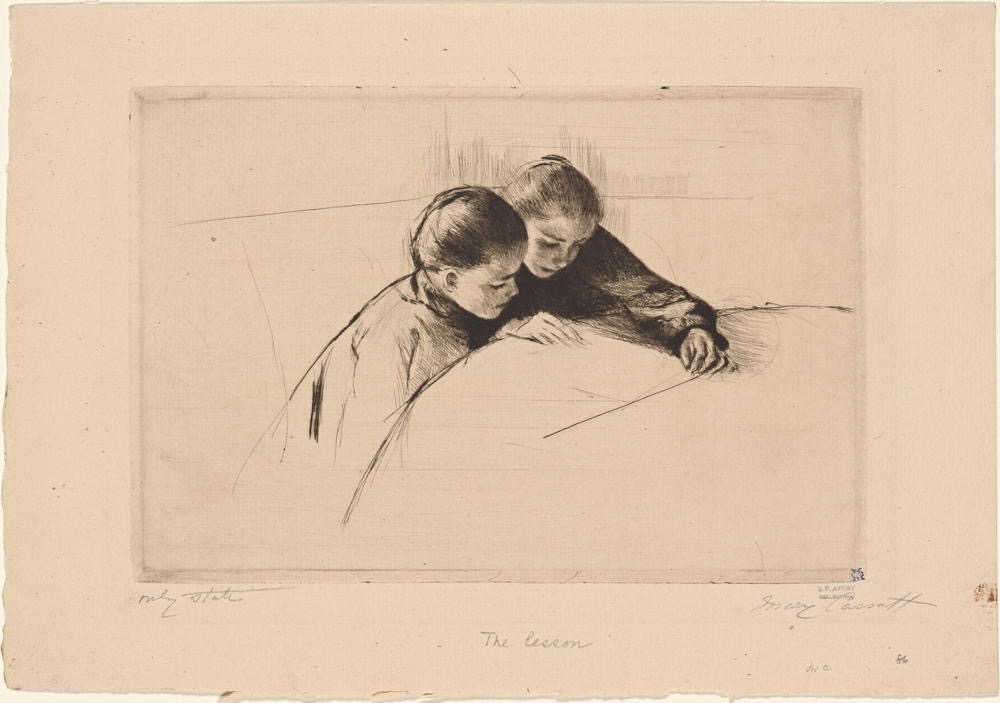
Mary Cassatt: The map (1889)
" … anybody interested in this Fambly's history will have to rediscover it for themselves …"
In the end, or nearing the end, I carry too many stories. Each seems especially important, even magical, for they represent discoveries. They were once lost, and now they're found, but in finding them, I overwhelmed my ability to retain them. What I initially complained about as clutter, I might have merely transformed into another form of clutter, open tabs rather than dog-eared loose-leaf notebooks, or open tabs and loose-leaf notebooks with fresh pieces of paper slipped in between the pages. I might have made the archive worse. This might represent the curse. We firmly believe that only we will make this world coherent before discovering that the best we mustered was a different form of the same old incoherent mess.
Maps hold some hope.
UnderConstruction
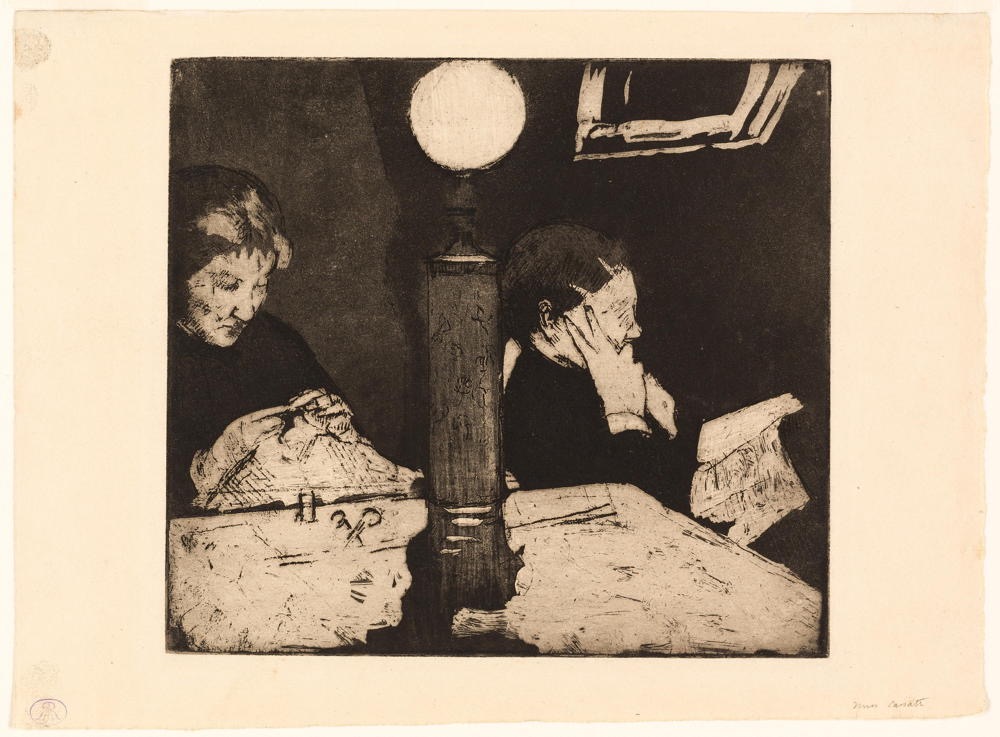
Mary Cassatt: Under the Lamp (c. 1882)
" … this series remains UnderConstruction and strenuously avoiding completion."
This series remains under construction. It might appear that I'm getting closer to finishing this series of stories with each installment, but each piece might be better considered preliminary. I've not yet decided where this series will end, for instance, so each fresh chapter probes in the hope of discovering where and how to finish it. Each story might stand on its own, but I intend that they be connected. I know my fifth-grade teacher also insisted that I should outline a work before beginning to avoid precisely this unsettling eventuality, except that I was never able to successfully know all I would have needed to know to outline anything before I started writing. The act of writing finds the way, not the other way around.
Consequently, I'm challenged to learn many things on the fly.
Visualizing
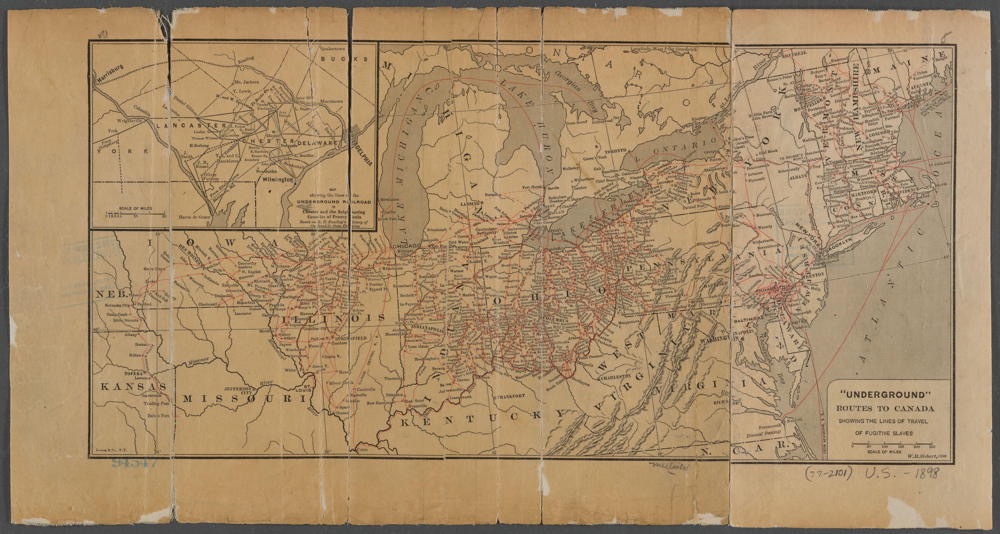
Wilbur Henry Siebert: "Underground" routes to Canada: showing the lines of travel of fugitive slaves (1898)
"Until then, I will be fueling renewed frustration."
"Trees" have become the traditional means for visually displaying a Fambly's history. They show the simple head-to-foot association of one generation to another as if each successive offspring stood on their parents' shoulders. These do not show geographical dispersion, but they aren't intended to. To display migratory paths, I must omit some information. Parent/child associations compete with physical locations to complicate any representation. Using layers, colors, and other graphic associations, I might produce a visualization too complicated for interpretation, so I must be extremely patient with myself.
One thread of my paternal grandmother's history involves the Bond into the Bounds line.
Transpositioning
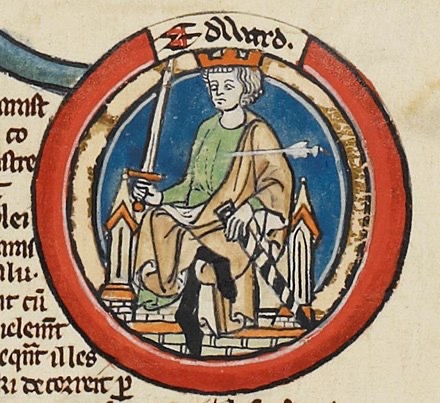
Miniature of Edward the Martyr
in a royal genealogy of the 14th century.
" … the terribly fortunate ones, the benefactors of almost endless Transpositioning."
A Fambly history might best be recognized as a permanent record of that Fambly's Transpositioning, for given broad enough horizons, it will encompass pretty much every possible human condition. Royalty will counterbalance laity, saints stand alongside sinners, and heroes hang with cowards. Deciding what the Fambly story means might well prove daunting, even impossible, because it might and could mean anything, everything, and nothing definitive at all. That history might not intend to mean very much of anything, anyway, but to demonstrate how everything tends to reduce to nothing and nothing to somehow represent anything at all. When I can see through the personalities and dates and shift my focus toward perceiving what none of the stories explicitly states, I might approach a better and higher purpose for telling those stories.
As I concluded a few episodes ago, history represents the most substantial possible evidence that we were each born equal.
THE

Ethelred the Unready, circa 968-1016. Illuminated manuscript,
The Chronicle of Abindon, c.1220.
MS Cott. Claude B.VI folio 87, verso, The British Library.
Scanned from the book The National Portrait Gallery History of the Kings and Queens of England by David Williamson, ISBN 1855142287., Public Domain, https://commons.wikimedia.org/w/index.php?curid=6639643
"I can't quite wrap my arms around the title Emperor THE Chuck."
Among the many, many distractions those of us with royal distinctions in our family history must contend, the presence of singularities ranks as one of the highest. It's one thing to have an Uncle Bob and quite another to possess an Uncle THE Bob. I've found innumerable instances throughout the records of someone like my long-lost something great-grandfather Ethelred THE Unready. Who could ask for a sorrier moniker? Ethelred was, predictably, a son of King Edgar THE Peaceful and survived the assassination of his older half-brother, King Edward THE Martyr, to take the English throne at twelve, thereby the unready designation. The unready designation was a play on words. "His epithet comes from the Old English word unræd meaning "poorly advised"; it is a pun on his name, which means "well advised" [Wikipedia]
He lived a suitably noteworthy life, as any half-decent monarch might, though the Danes deposed him after a particularly egregious and unnecessary attempt to slaughter every Dane in England.
Weekly Writing Summary For The Week Ending 5/09/2024
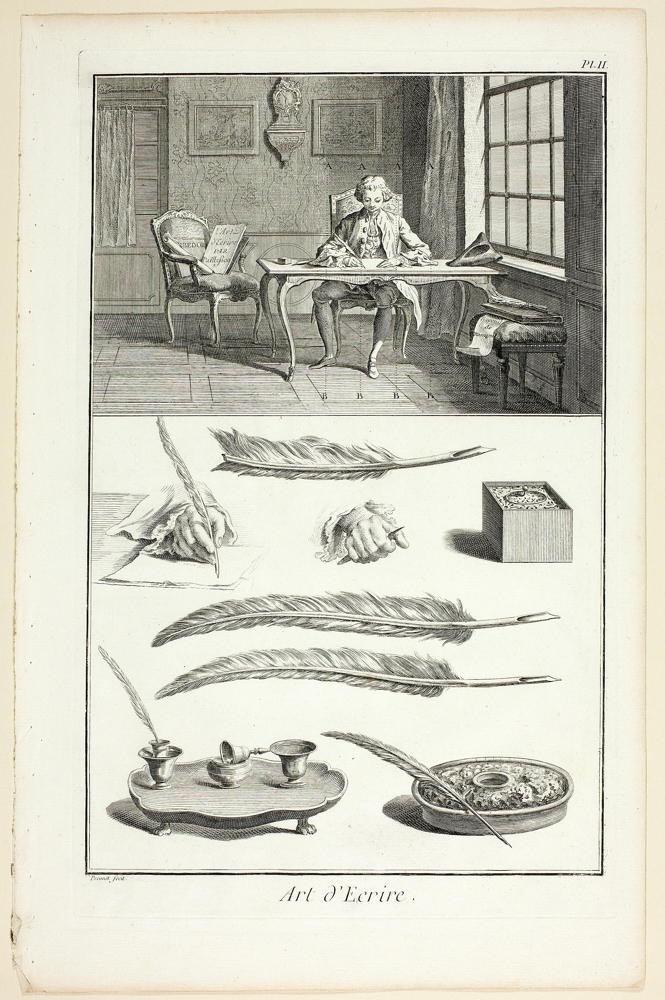
Benoît-Louis Prévost: Art of Writing, from Encyclopédie (1760)
Stand For Their Ambiguous Selves
I find it fascinating how failing to figure out what this life’s all about might prove to be what this life’s all about. Any notion that any of us might reach any authoritative conclusion seems lame in actual execution. Our questions might best exist unanswered, their purpose never actually being resolution but a representation of the inherent unanswerability of many of our questions. Go ahead and open up your Fambly history to public scrutiny. No amount of second-guessing will very likely resolve very much of anything. The significant questions might properly remain unanswerable. We rile. We stir the soup not to improve the flavor but to keep some of it from sticking and scorching on the bottom of the vessel. After all of this effort to tell these stories, I’m left believing that these stories probably always stood up for themselves. I’m no judge. I’m no master reinterpreter. I must have no idea what any of these stories ever meant. They have to stand up for themselves, indifferent to whatever you or I conclude. My purpose might have never been to conclude for my forebears. They might get to stand for their ultimately ambiguous selves. Just like us.
Fulk II of Anjou

Coat of arms of Hercule (François) of Valois, Duke of Anjou
By Carlodangio - Own work, CC BY-SA 4.0,
https://commons.wikimedia.org/w/index.php?curid=61574700
"I'm a dabbler …"
Though my heritage identifies me as a direct descendant of the kings of France, Spain, England, Italy, and what would one day become Germany, I do not feel very much like royal material. This condition might speak back to my high school years when my guidance counselor declared me not college material, a welcomed designation at the time, for it freed me up from concern about getting good grades or paying for college. I considered the declaration a Get Out Of Jail Free card in my early real-life Monopoly playing. Likewise, I can't see myself concerning myself with all the relationships necessary to maintain a halfway decent duchy, let alone a full-blown kingdom. It doesn't surprise me that royalty fought each other so continually and aggressively, for each seemed to be playing extended games of Suicide Chess, an unimaginably complex undertaking sure only to leave every player paranoid.
One of my lesser forebears, a full-blown Duke of Anjou, Fulk II, The Good, was known for his skill at negotiating strategic marriages.
Names

By Graoully - Self-photographed, CC BY-SA 3.0,
https://commons.wikimedia.org/w/index.php?curid=2770007
Vitrail représentant saint Arnould, chapelle Sainte-Glossinde
Stained glass representing Saint Arnould, Sainte-Glossinde chapel
(One of my 43rd Great-grandfathers)
"I could have been named after another forebear …"
I am blessed with a surname that sounds like a punchline from a Marx Brothers movie to most people. I believe that many immediately discount me due to my name's inherent joke quality. I admit to even discounting myself sometimes in the past. Why, oh why, couldn't I have been blessed with an innocuous name instead? Something even people with a lisp could comfortably pronounce? Something with more than one meager vowel?
Well, as sorry as my surname might seem, my super secret middle name seems exponentially more humiliating.
ClarissimaFemina
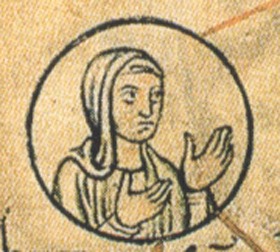
Detail from the Chronica sancti Pantaleonis:
Hedwig of Saxony - One of my 31st Great-Grandmothers
(12th century)
" … and sometimes even saints."
I have been delighted to discover that many of my Great-Grandmothers were famous or notorious enough to warrant getting their picture taken during their time. Before cameras, sketches were photos, and so were pottery, paintings, and sundry engravings. Almost every female in my Fambly tree between 500AD and the fifteenth century left some graven image ranging from pottery chard to Eleanor Crosses. None of these images were very likely true to their subject. I suspect that most were idealized and iconic, likely attempting to represent a most prominent attribute, be that an unusually large nose or blond hair, such that anyone who'd heard their legend might readily feel as though they recognize the image. Yes, most of these women also have some legend attached to them.
I think it is tragic that history continues primarily from a patrilineal perspective.
ANewCatechism
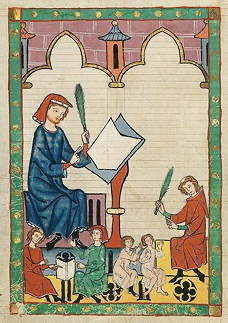
Master of the Codex Manesse:
Codex Manesse, fol. 292v,
"The Schoolmaster of Esslingen"
Der Schulmeister von Eßlingen)
(between 1305 and 1340)
" … reliably vanquishing dragons since before St. George."
How has the study and exposition of my Fambly's history changed me? It's probably too early in the transformation process to meaningfully begin to describe how I might have changed. I'll admit to feeling as though I'm changing without suggesting that I might know just how I will eventually be changed. I carry a strong sense of before and of since, of my understanding of my world having significantly shifted as a result of my recent discoveries. I plan to continue my studies to delve deeper into the histories that had previously escaped relevance. Suddenly, I'm curious about the late Middle Ages now that I have names, dates, and even some detailed personality sketches with which to personally relate. History's no longer just dates but personal causes and effects, real consequences, a present source of vanity, pride, and perhaps even more profound understanding. I seem to have acquired a greater stake in relating to the past.
I imagine future generations teaching their children this essential context, such that they might be able, as I have noticed myself suddenly able, to name my forebears in reverse sequence.
Bob

Grain Elevator, Condon, Oregon
" … the gods of geneology will decide."
It's probably always been the case that none of us really control our fate. With my family's history all spread out, I can see what eventually came about. I cannot imagine very many outcomes resulting from consciously deliberate choice. Sure, we each make decisions, mostly modest and a few monumental, but none seem to reasonably sum to produce any fate. Insignificant increments might conspire to finally sum up to something that might have been aspired to but couldn't really have been. Historians might ascribe to some specific decision whatever outcome ultimately resulted, but this world works more insidiously than that. Contrary to popular mythology, not one of us was ever really self-made. We were probably more crafted by ten thousand hands, most of which never imagined they were leaving a fingerprint or any sort of mark. We might manifest by less obvious means, and we likely create our explanatory stories to satisfy something other than reality. In reality, stuff happens, and however we come to pass rightfully remains mysterious.
That said, my father, Robert Clancy Schmaltz, an unwitting thirty-sixth great-grandson of Charlemagne, decided to move to Condon, Oregon, to help his dad.
Condon
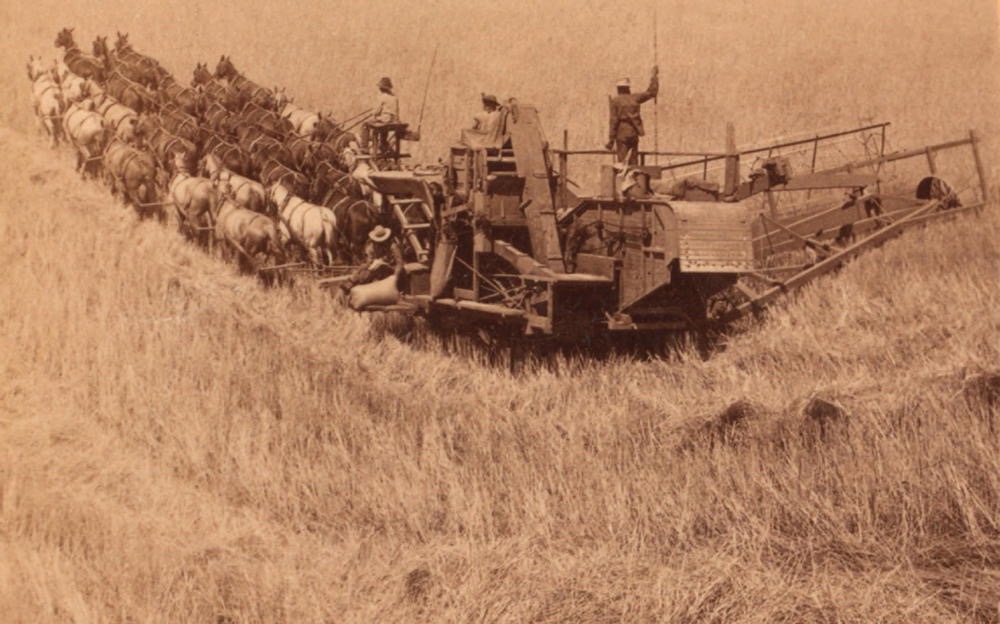
Evolution of sickle and flail, 33-horse team harvester,
cutting, threshing, and sacking wheat, Walla Walla, Washington. (1902)
Stephen A. Schwarzman Building / Photography Collection,
Miriam and Ira D. Wallach Division of Art, Prints and Photographs,
New York Public Library
"I visit her every Memorial Day."
The Gods decided, as The Gods always decide such things, in mysterious ways. After my mother's grandparents met as neighbors and then as step-siblings after each lost a parent and their surviving parent married their neighbor, they married and settled down on what appears to have been the neighboring ranches south of Condon, Oregon. They came of age in dryland wheat country, so they raised dry-land wheat, an incredibly labor-intensive effort. During harvest, scores of seasonal workers arrived to frantically work for a month or so before returning to from wherever they came or moving on to the next crop. Wheat harvest would melt into apple harvest, and the crews would disappear into the Yakima, Walla Walla, or Hood River Valleys to take advantage. In the days before the railroad came and before the co-ops built grain elevators, wheat was harvested into burlap bags, each holding three bushels and weighing about 180 pounds. The bags would fill on the harvester, and a worker would quickly whip-stitch them closed before slipping them off for later gathering.
My maternal grandfather, Elza (pronounced El-Zee) Franklin Wallace, worked this sort of wheat harvest, as did my grandmother, Ruby Kenaston, since she grew up on that ranch.
Weekly Writing Summary For The Week Ending 5/02/2024
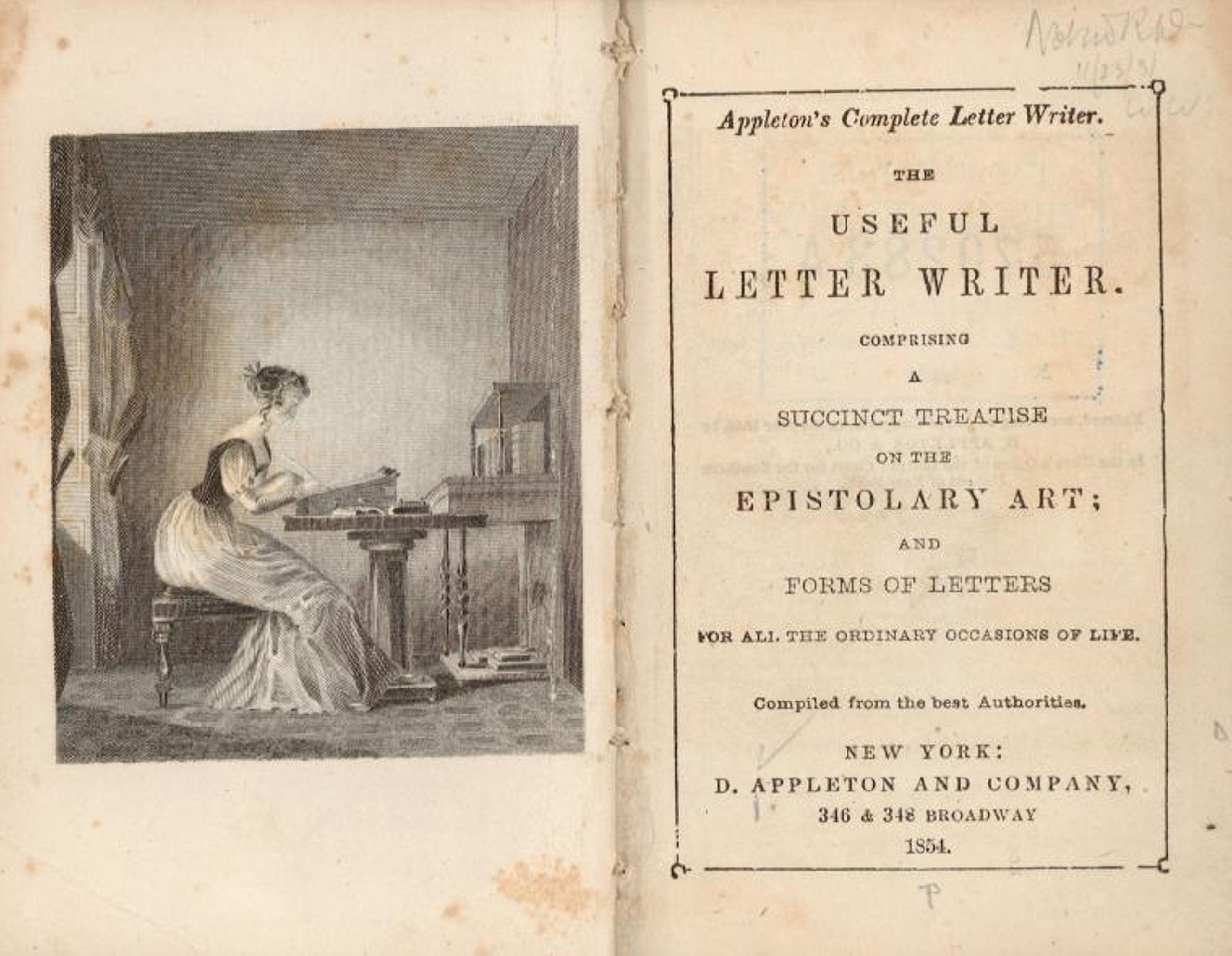
Appleton's complete letter writer..., [Frontispiece & title page] (1854)
With Nothing Remaining To Impart
I face a dilemma going further forward into these Fambly Stories. I’ve almost accomplished what I imagined I might have achieved when I started this effort, but I’ve only used half the time I’d allocated. Working a theme until the season ends has long been my practice. Into this twenty-eighth iteration, I’ve been faithful to this pattern. It has become a defining element of my work and has been unquestioned until now. I’m not quite finished, but I can see that it shouldn’t take too awfully many more stories to bring all the disparate threads together. My original vision will be satisfied once my parents meet and marry. Now, I’m wondering what I should include that I could not foresee before I found myself immersed in producing these stories. What might have been the deeper hidden purpose behind this whole exercise? How have these stories informed my perspective? What have I learned, and what have I lost? I guess I will continue writing this series until its popsicle stops giving flavor and turns into a clear icicle with nothing remaining to impart.
AGreatDepression
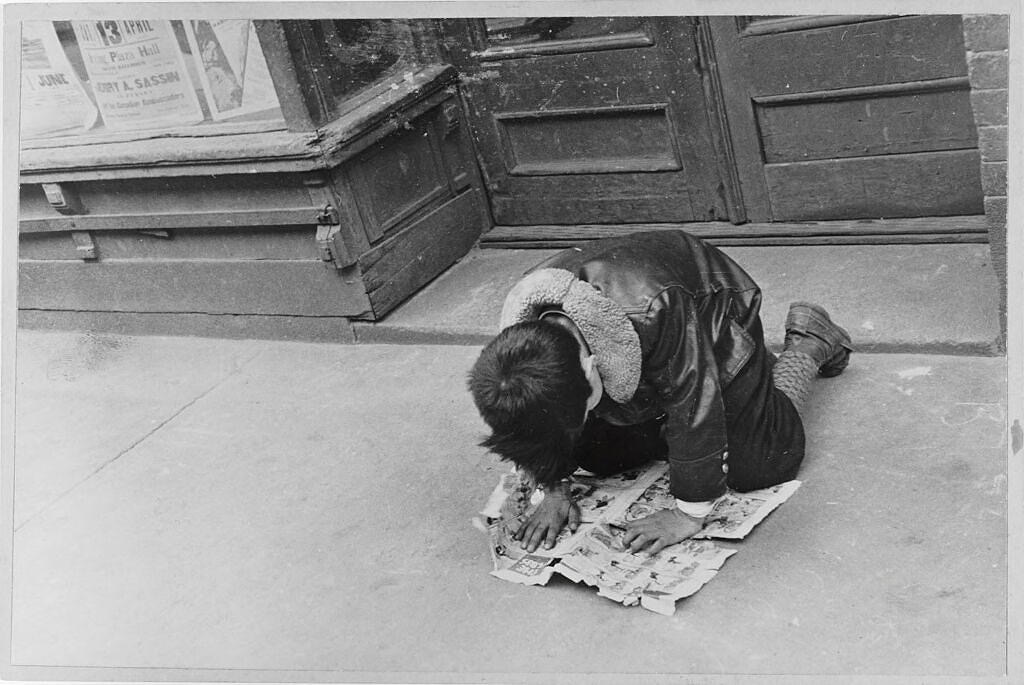
Ben Shahn: Untitled [Greenwich Village, New York City] (1935)
" … the reason I had a chance to be alive."
My father's brother Dan was born three and a half months after his parents were married in 1921. They were married far away enough from Mt. Angel to ensure that none of the locals would witness the scandal, his mom having recently been the local pharmacist's wife. They lived that first year or more in St. Helens, a town sufficiently distant that nobody who knew anything would likely bump into them. They returned with, as I mentioned earlier, a remarkably mature infant. My father, Robert Clancy Schmaltz, arrived shortly after that. The couple settled into a tiny house—"a cottage small near a waterfall"—in nearby Scotts Mills, a few miles out of Mt. Angel, but distant enough to avoid daily scandal. My grandfather Nick assumed responsibility for Schmaltz & Sons’ deliveries on that side of the county. The kids, Dan and Bob, settled into school and small-town life. Their parents divorced sometime after 1930. Their mom, Cassie, had been carrying on with Ed, a mechanic whose shop was just down the alley from their place. This separation injected fresh chaos into everyone's lives.
My dad and Dan began spending more time with their grandparents, even attending the Catholic school near their place.
MtAngel
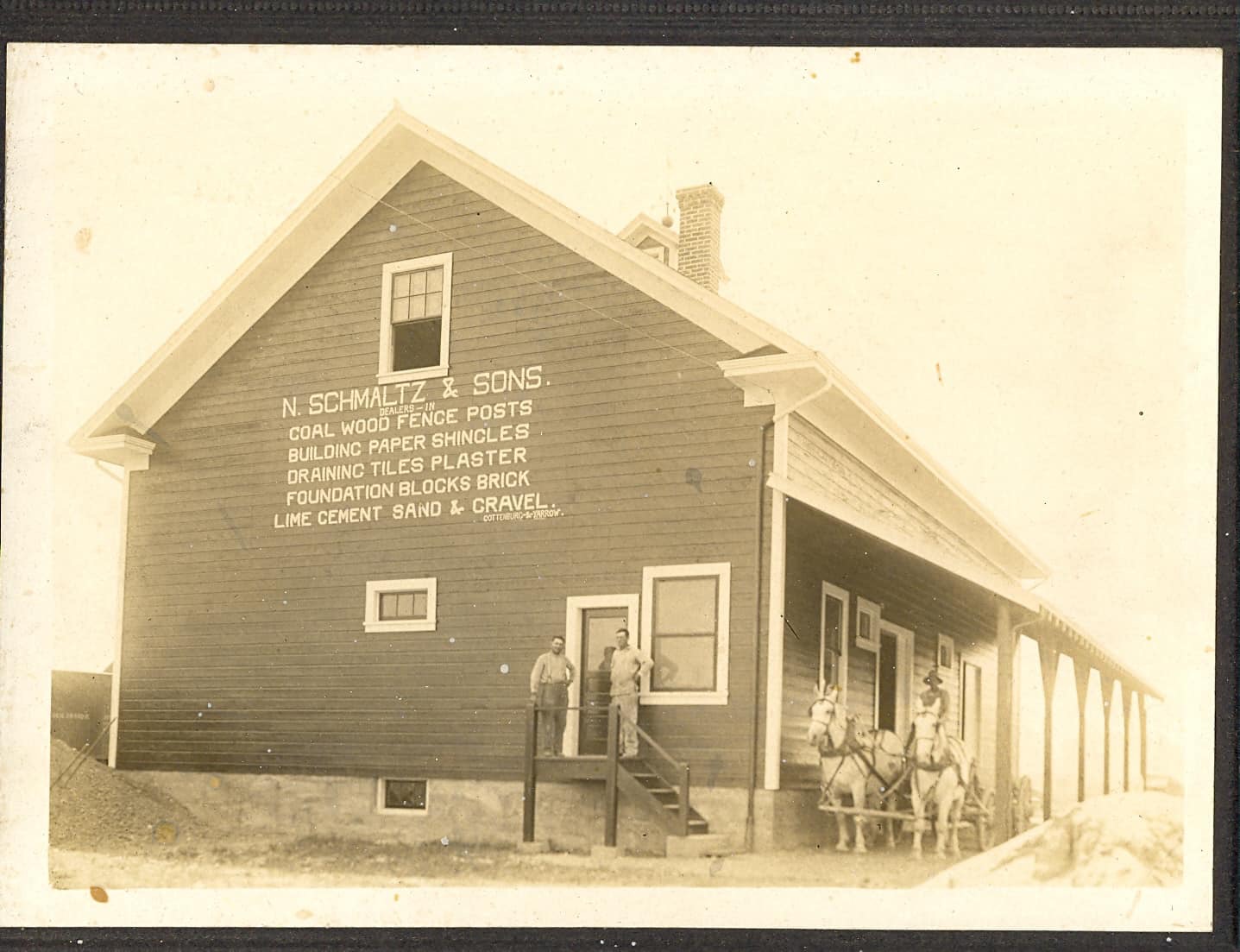
Schmaltz & Sons Warehouse, Mt Angel, Oregon (circa 1910-15)
Mt Angel Historical Society
"There's only a plaque there now …"
Nick and Elizabeth Schmaltz had relocated from Devil's Lake, North Dakota, to Mt. Angel, Oregon, by August of 1909 when their youngest daughter, Lucy, was born. Fifteen years after emigrating from Ukraine, Nick had arrived in his Eden at the End of the Oregon Trail, a small city tucked into the northern edge of Marion County, Oregon. We no longer have cities like Mt. Angel in pre-WWI Oregon. Today, we classify Mt. Angel as a small town with few services. Then, it featured every service any city required. One could hop on a train connecting you to Salem or Portland. It featured a hotel with a ballroom. A pharmacy. A hardware store and, most prominently, Nick Schmaltz & Sons farm supply.
Further, Nick built a fine two-story home, the finest in town, across the square from the church. He served as a board member overseeing construction while no doubt supplying building materials properly discounted for ecclesiastical purposes.
NewWorld

Lorenzo James Hatch: Locomotive (19th-20th century)
" … that success would ultimately cost him plenty."
As in every previous generation, arrival in a NewWorld involved stepping backward in time. The Schmaltzes and Welks had left behind their mature development in Ukraine, trading generations of successful adaptation for generations of even more of the same, starting from about where their displaced great-grandparents had begun when arriving on the undeveloped Steppe from Alsace a century before. Just before the turn of The American Century, North Dakota was closer to where it had been a century earlier than where it would end up a century later. The railroad had yet to cross half the state. Indeed, they arrived just as The Dakota Territory was admitted to the union as North and South Dakota. There were no paved roads in either state then. Settlers were still building sod houses, there being little available lumber or stone to create anything more substantial.
A government survey completed in the 1860s, when The Dakota Territory was first established, concluded that the area might productively host a dozen ranches, given the extreme weather and short growing season, and that most of those ranches might raise cattle rather than crops.
Selz
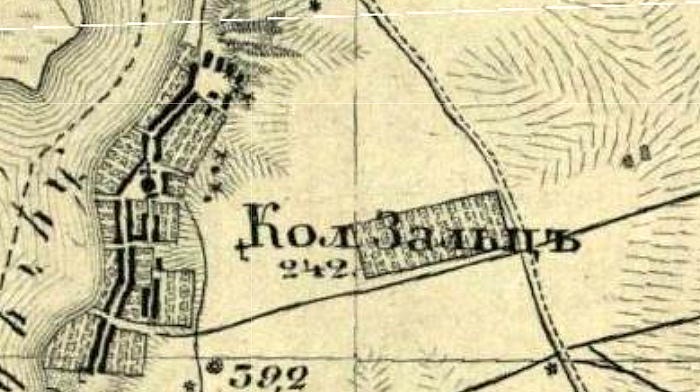
Kolonie Selz. Map by Alexander Ivanovich Mende (Mendt), 1853
"The city ceased to exist after it was evacuated during the Nazi retreat in 1944."
My fifth great-grandfather, Joseph (Josef) Schmaltz, was born on January 11, 1780, in Kapsweyer, Rhineland-Palatinate, Germany. He would die eighty years later in Kuchurhan, Odesa, Ukraine. My fourth great-grandfather, George Wilhelm Schmaltz, and his twin brother Heinrich "Henry," were born in 1804 in Germany. The family emigrated to Ukraine later that year, settling in a new town, Selz, in the Kutschurgan Valley, where the Kutschurgan River flows into the Djnester estuary, about forty miles from the district center, Odesa. This place was sandy river bottom land that melded into black prairie soil further from the river. They initially constructed rough brush huts, later building a substantial town complete with a large cathedral, a park, and extensive orchards.
Being German, much material has been passed down through the generations.
TheDeal
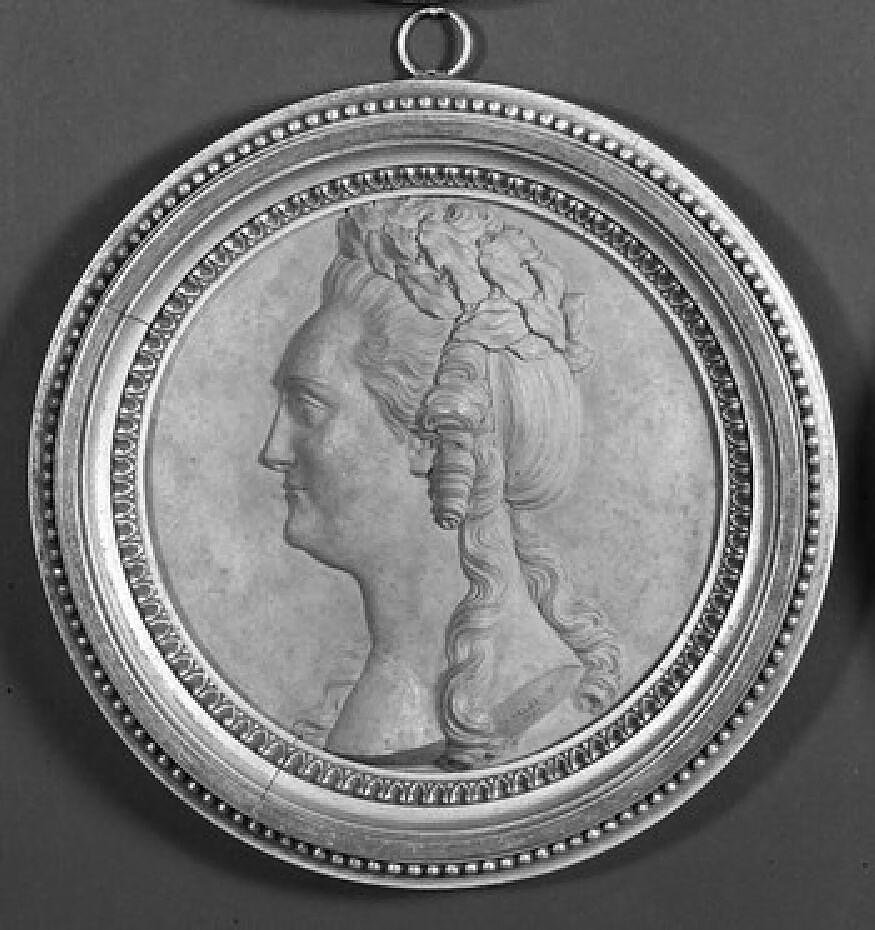
Giovanni Battista Nini: Catherine II (1771)
"Edens tend to come exclusively in their most primitive form."
By the end of The Seven Years' War, the surviving inhabitants of Germany were rightfully exhausted. Once again, squabbling between the crowned heads had devastated their lives. My Alsatian ancestors, still recovering from the Thirty Years' War and The Black Death's devastation, faced yet another displacement. Other German duchies had it worse. Catherine II, the former Prussian princess who'd married into the role of Empress of Russia before displacing her hapless husband once his heir was born, desired to bring Russia up to European economic standards so that she might continue financing her wars of acquisition. Russia remained a nation of serfs, still clinging to the Middle Ages, where a few wealthy landowners held the bulk of the labor captive. There was no entrepreneurial or independent farmer class; there were just serfs and sharecroppers who were successfully enjoined from demonstrating initiative on their own or even on the country's behalf. Catherine had recently won vast tracts of land from wars with Turkey and needed settlers to populate this largely uncultivated country. She proposed a deal she hoped might jump-start the languishing Russian economy to compete with Europe and the rest of the world while bringing that idle land into production.
In 1763, she issued a manifesto offering some rights and privileges to incoming foreign settlers.
Diaspora

Sarah Ann Wilson: Album Quilt (1854)
"My Fambly would attempt to bring their history forward with them and largely succeed …"
Alsace, situated along the Rhine between France and Germany, historically never considered itself a country. Like its neighbors to the east, it considered itself more of a duchy. It never had its own king. The Romans occupied the parts west of the Rhine but perhaps wisely left the other shore to the tribes and hoards, of which there were several in succession. It fell under the protection of the Carolingian dynasties, peaking with Charlemagne, whose sons bickered among themselves, dividing up the formerly united property. After that began the centuries under the Holy Roman Empire, where Alsace, being a border country, was traded back and forth among emerging countries. The Thirty Years' War brought Swedish troops, who tried to enforce Protestantism within its borders, and this seemed to work for Strasburg but failed in the countryside. Its residents looked to the Hohenstaufen emperors like Frederick I for protection and remained staunchly Roman Catholic.
As The Black Death ravaged the region in the mid-seventeenth century, age-old jealousies and hatreds eroded civil order.
Weekly Writing Summary For The Week Ending 4/25/2024
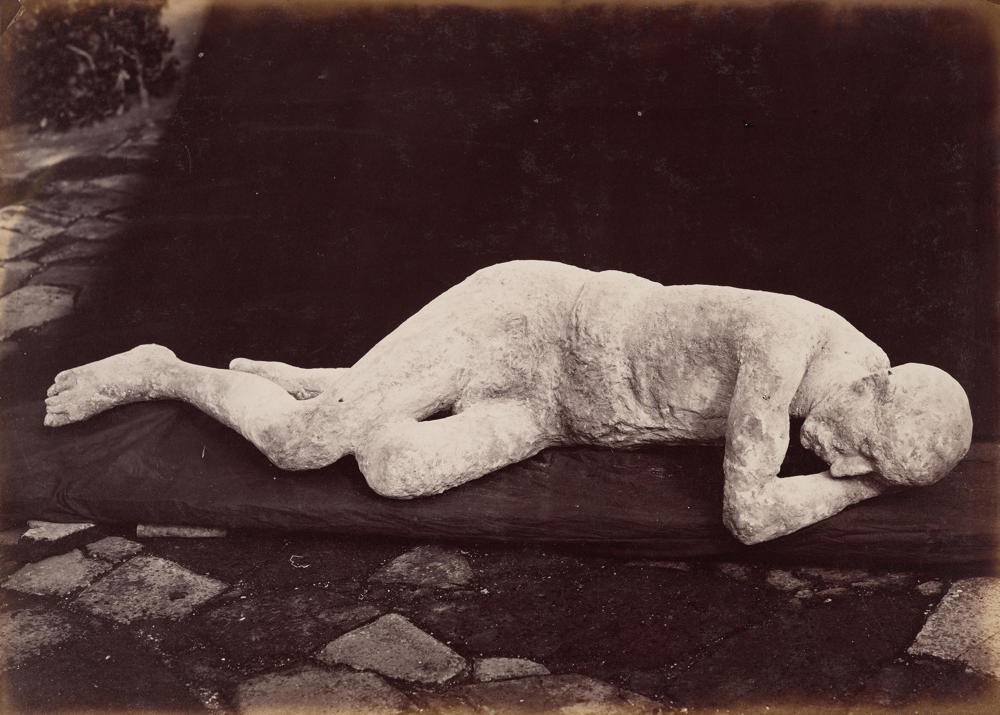
Giorgio Sommer: Plaster Cast of Body, Pompeii (1880)
Resonance Of The Many Contexts
I've learned much about myself and my world in the almost seven years since I began writing a new series each quarter. Fambly will be my twenty-eighth series, my twenty-eighth book-length work since I started Another Summer on the 2017 Solstice. As I've mentioned here innumerable times, my original intention was to chronicle some sense of my manner of living because I always seemed to encounter unanswerable manner of living questions when thinking about my ancestors. They didn't leave very much of a clue about how they lived. I sometimes fear that I've left far too much information, for my descriptions sometimes seem, even to me, scaled a little too close to one inch equals one inch, more detail than could ever prove useful. Still, I figure whoever's interested might just as well have too much as too little information. I didn't start this experiment to starve my future genealogists. Those few scraps of writing in my forebear’s own hand featuring their unique phrasing and misspellings are genuine golden treasures. As I have been reassembling the stories of my forebears, I treasure the contexts I discover more than any other part of their stories. Fambly's much more than accomplishments and dates, but the resonance of the many contexts through which we've passed.
ProgressReport
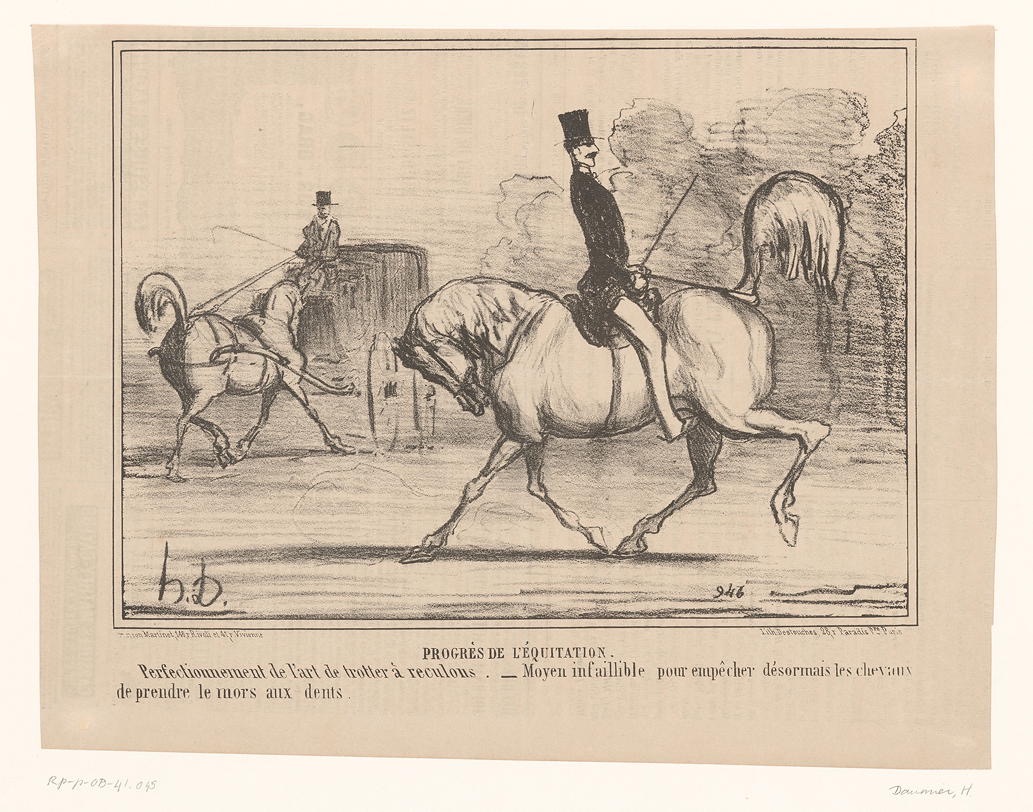
Honoré Daumier:
Karikatuur van een ruiter die achterstevoren rijdt
Caricature of a rider riding backwards (1856)
" … they were engaged in a diaspora away from their Eden …"
Everyone goes through a phase where they find their family an embarrassment. This often occurs during the teen years, when separation seems necessary to affect individuation. We gain the superpower capable of rendering siblings invisible lest we be associated with individuals so unlike us. One genuinely feels they were probably inadvertently switched at birth with some family that already had a color TV. Chores became beyond boring. I seemed to lose respect for myself. If Only became a near-constant refrain as I grieved over my sorry fate. I realized far too late just how fortunate I had been to have been born then, in precisely the right place at exactly the right time. I'd honestly never suspected. I never knew.
It might be true that we're all born into unfathomable ignorance.
APrefectOfGaul
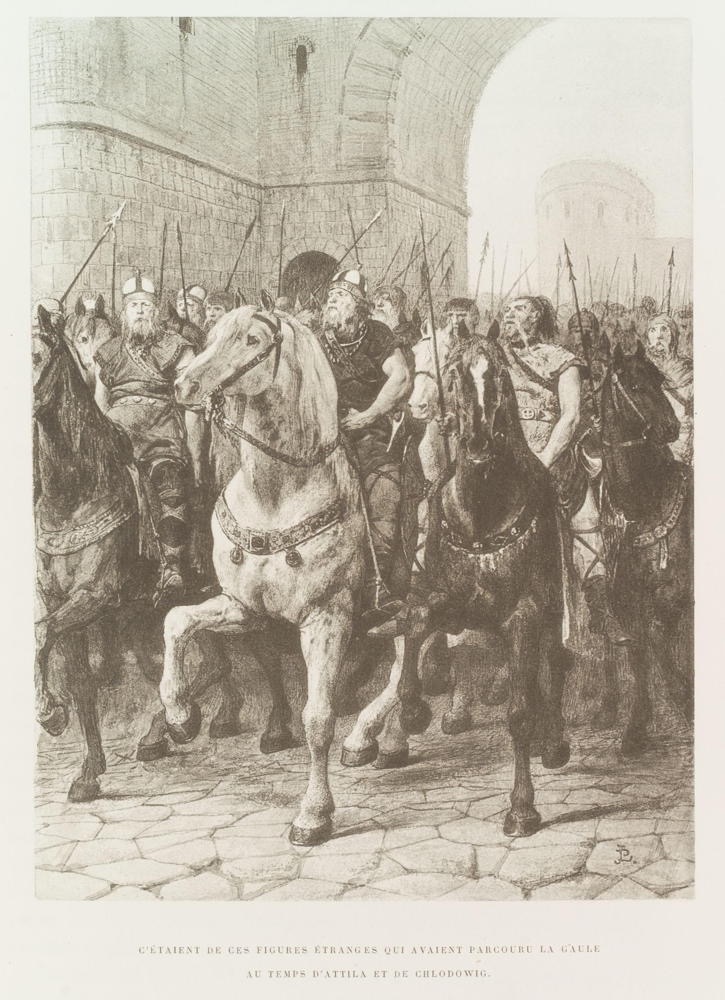
Jean-Paul Laurens:
C'étaient de ces figures étranges qui avaient parcouru la Gaule au temps d'Attila et de Chlodowig
They were one of these strange figures who had traveled Gaul in the time of Attila and Chlodowig (1887)
" … some vestigial memory created forty-seven or eight generations ago …"
My Fambly tree starts petering out around my 47th and 48th great-grandparents. That any record of them still exists amounts to either a significant miracle or a minor research error, though the record had withstood some scrutiny. Contrary to what I'd always heard, the end of the Roman Empire was not some cataclysmic fall. As with all enormous bureaucratic institutions, the end was prolonged and featured unexpected bedfellows. In my notion of that history, ravening hoards tore down walls and took no prisoners. In the real world, even the conquerors understood that vanquishing an army would win much less than half of any battle. The population would need to be governed, and not merely by military dictators, for commerce and trade would continue to be an essential part of any post-status quo arrangement.
My 47th Great-Grandfather seems to have been just such a character, a political operator capable of working across aisles and collaborating with once-sworn enemies to accomplish mutually beneficial ends.
The37thGreat-Grandson
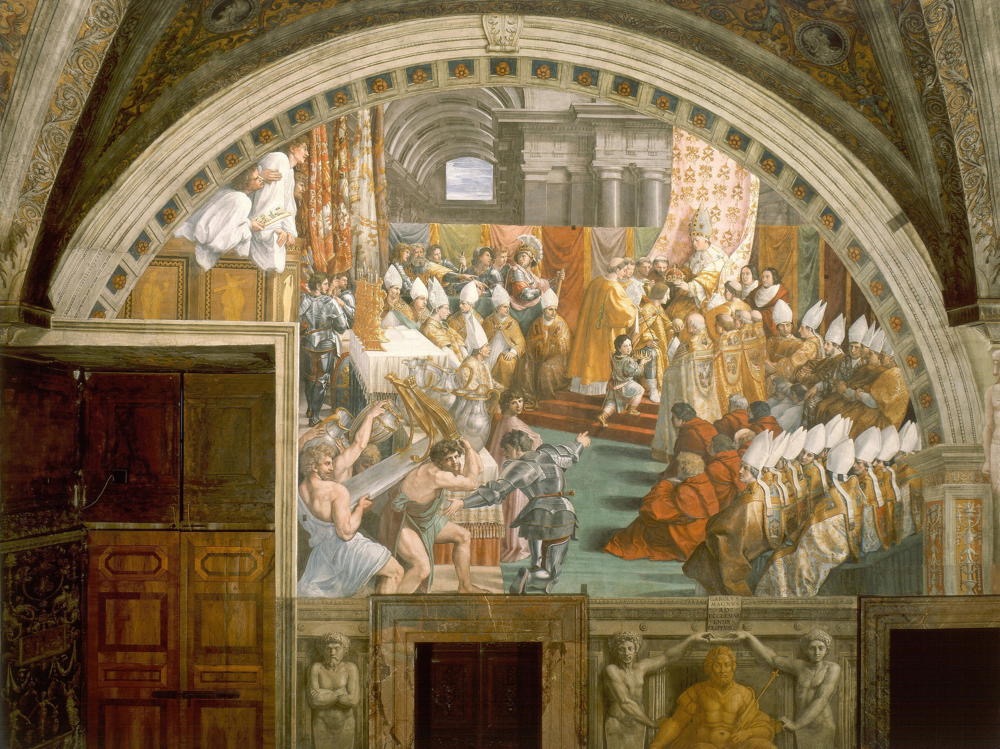
Students of Raphael: Coronation of Charlemagne (1514-15)
"I had better consider myself worthy of all that bother."
His cat awakened the Thirty-Seventh Great-Grandson. He'd taken the day before off to nurse a painful muscle spasm and wasn't quite ready to face the day. The cat insisted. I can confidently report that this cat has our Great-Grandson wrapped around his paws. The Grandson cannot deny him anything, regardless of how shoddily that cat might choose to treat him. He might annoyingly yowl, but the Grandson never loses his ardor for that animal.
Unlike his Thirty-Seventh Great-Grandfather, our Great-Grandson was never instilled via coronation.
Swirling
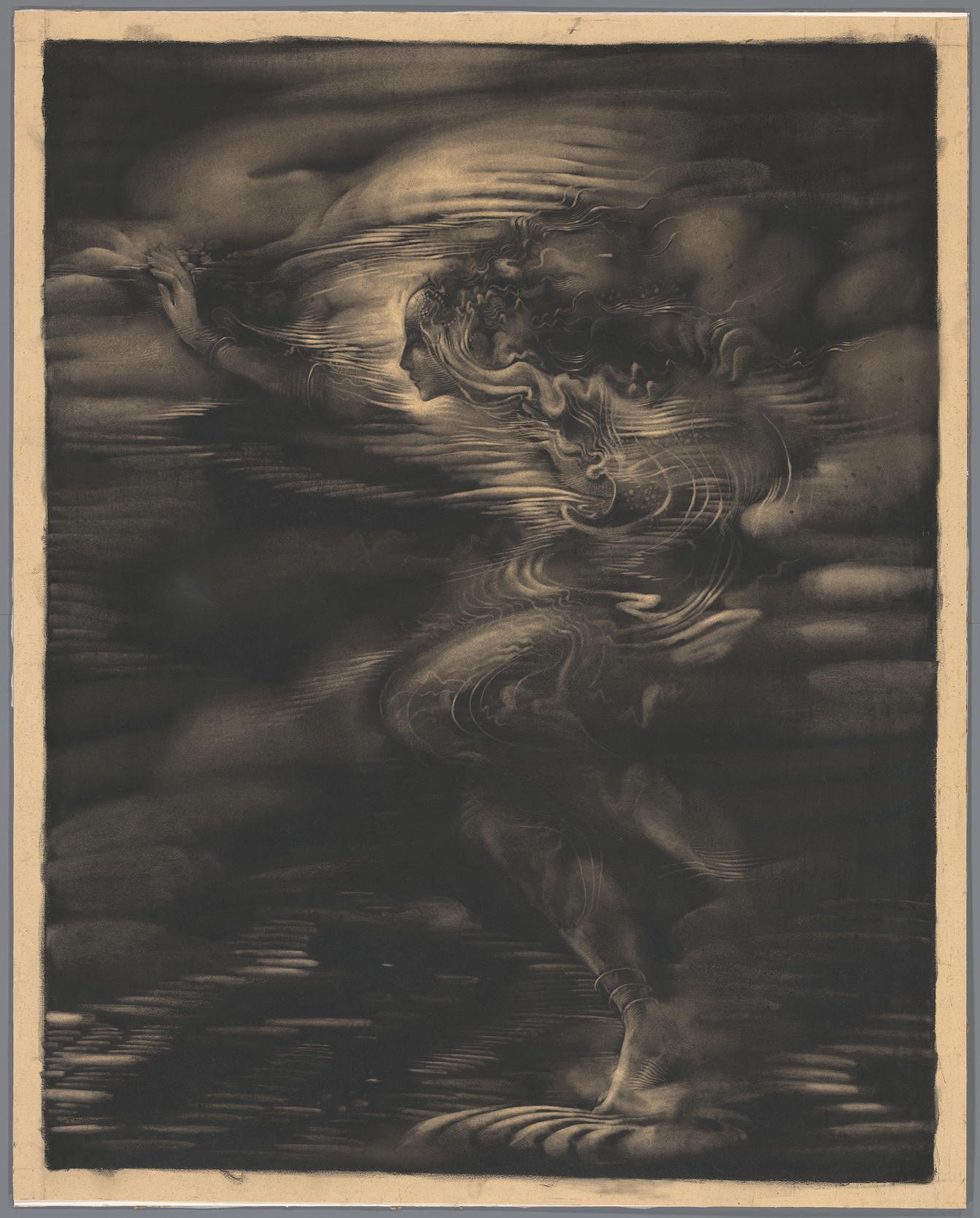
Frans Stamkart: Salome (1910 - 1915)
"This world won't allow what couldn't ever come about."
A point comes when I can no longer comprehend the context within which I find myself dabbling, for I can no more than dabble in the incomprehensible British peerage system. My forebears did not lose all their standing when they were forbidden the right of ascension. They entered the netherworld of dukes, earls, and sirs alien to the American all-men-created-equal creed. Infinitesimal differences seemed to yield enormous shifts. Even seven or eight generations after JohnOfGaunt's era, his X-times great-grandaughters remained in The Peerage, and marriage to them elevated their husband's standing. Through successive marriages, the bloodline migrated to Ireland, where generations of husbands and sons participated in the subjugation of Irish natives.
The British colonized everything they could.
JohnOfGaunt
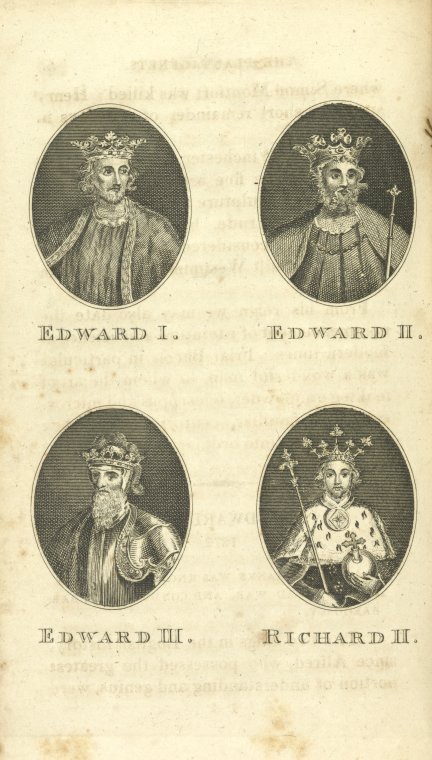
Publisher: William Godwin:
Edward I. Edward II. Edward III. Richard II (1815)
"We're certainly directly related to almost everybody."
How does the progeny of a King and Queen of England manage to lose their rights of association? It was always easy to lose the right of ascension. That required no more than the good fortune not to be the first-born male. The rights of association proved tricker, though, for they depended upon custom and political positioning. Stay in good graces with the crown, and you and your offspring might hang around the household for centuries. Somehow fall out of favor, and you and yours will disappear, sometimes into formal exile and other times more permanently. There seems to have been little permanent sentimentality between members of the upper reaches of royal society. Anybody—and I do mean anybody—could be excommunicated on any premise on the whim of a king, queen, or even senior advisor. Not even offspring were necessarily excepted.
Rejected ones could try again by attempting to marry themself off to some handy neighboring monarch.
Eleanor-of-Castile
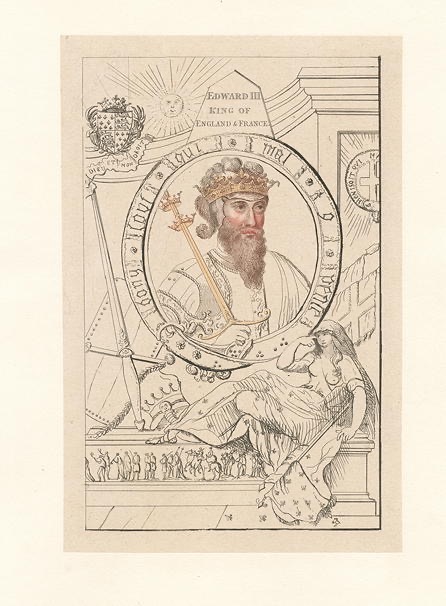
Print: Edward III, King of England and France (1817)
"I might just as well consider myself not even distantly related."
My twenty-first great-grandmother was twelve or thirteen when she married the love of her life, himself only fifteen at the time, and future king of England, on November 1, 1254. Eleanor of Castile qualified as genuine royalty with an ancestry dating back centuries, from before the beginning of the Dark Ages to around 500 AD, starting with a Prefect of Gaul and disappearing into doubtless royal parentage before. Since then, her forebears had fulfilled roles as varied as manager of an early Frankish Duke's household to kingships in what would later be Germany, France, Spain, and Portugal. If anything, my Fambly's history speaks to the absolute absurdity of generational wealth. Edward and Eleanor were perhaps the wealthiest monarchs in British history. A few offspring by mistresses and great-grandchildren don't receive any split of King great-Grandpa's pot. A few patricides engender hard feelings, especially within the immediate family.
Eleanor bore Edward III's first child at thirteen while still on her honeymoon.
Weekly Writing Summary For The Week Ending 4/18/2024
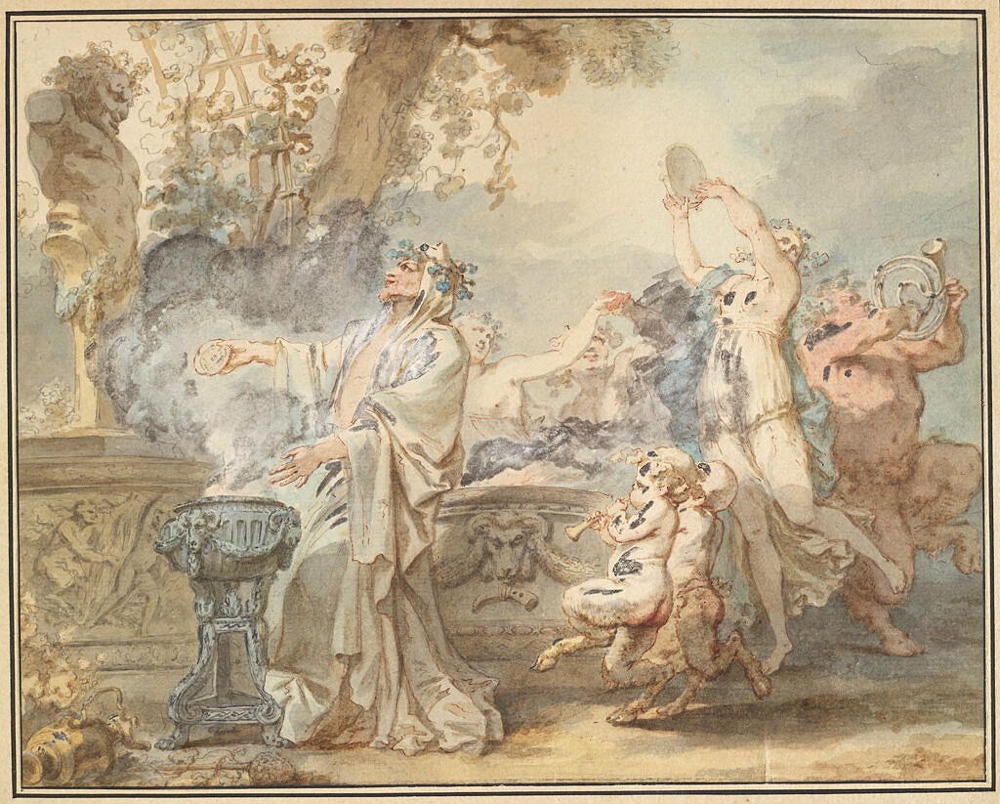
Jacques-Philippe Caresme:
Priest Making an Offering Accompanied by Nymphs and Satyrs
(18th century)
They Become More Real
I’m starting to believe that history might mostly be about patterns. Individual stories and actions might matter most when reduced to patterns. One instance might prove entertaining, but a half-dozen similar stories spread over centuries might better inform. I’ve been stumbling into possible crossovers, where one great-grandfather ended up in the same place and time as another and where every damned family that followed that trail ended up with almost the same story. These revelations shift my attention away from accomplishments toward responses. It might be that The Cumberland Valley, for instance, provided a context that tended to tease out the same behaviors from a variety of different people, that it might not have mattered what historical place your family hailed from or what religion they practiced, but that they fell under the subtle influence of a place they happened to share. I wasn’t there, but their stories sound more than accidentally similar. They almost seem like they were pulled from a book of valid plot lines or merely works of fiction. They become more real once they start showing their similarities.
SideTrips
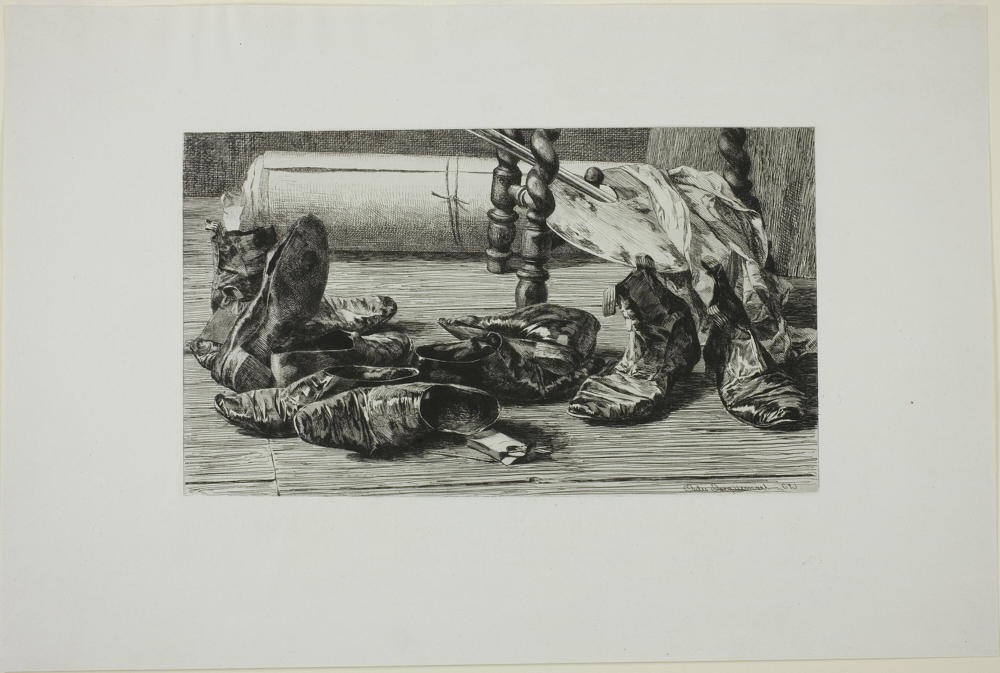
Jules F. Jacquemart: Mementos of a Trip (1862)
" … they insist we were all created equal."
Every forebear contributed their share of what eventually became me. My mother and father provided equal amounts of each of themselves as their parents did before them. Likewise, their grandparents did their part, too, and their parents before them. Over succeeding generations, a single generation's contribution gets diluted, but the formula holds. My twentieth great-grandmother contributed just as much as my twentieth great-grandfather. Yet, I tend to follow the family name backward rather than engage in many SideTrips to see what my umpteenth great-grandmother's family might have provided. Not every SideTrip goes anywhere, for only the elites ever inherit much of a family tree. It takes notoriety to guarantee that anybody remembers anybody, that, or a string of very conscientious and fortunate grandmothers. This kind maintain records in bibles and never loses their homes to fires. It's a wonder many records survive at all.
I felt curious about my second great-grandmother, Elizabeth Lovelady, who died in childbirth along the Applegate extension of the Oregon Trail on November 13, 1845, leaving my great-grandfather John Bird Bounds an orphan at twelve.
BoundUp
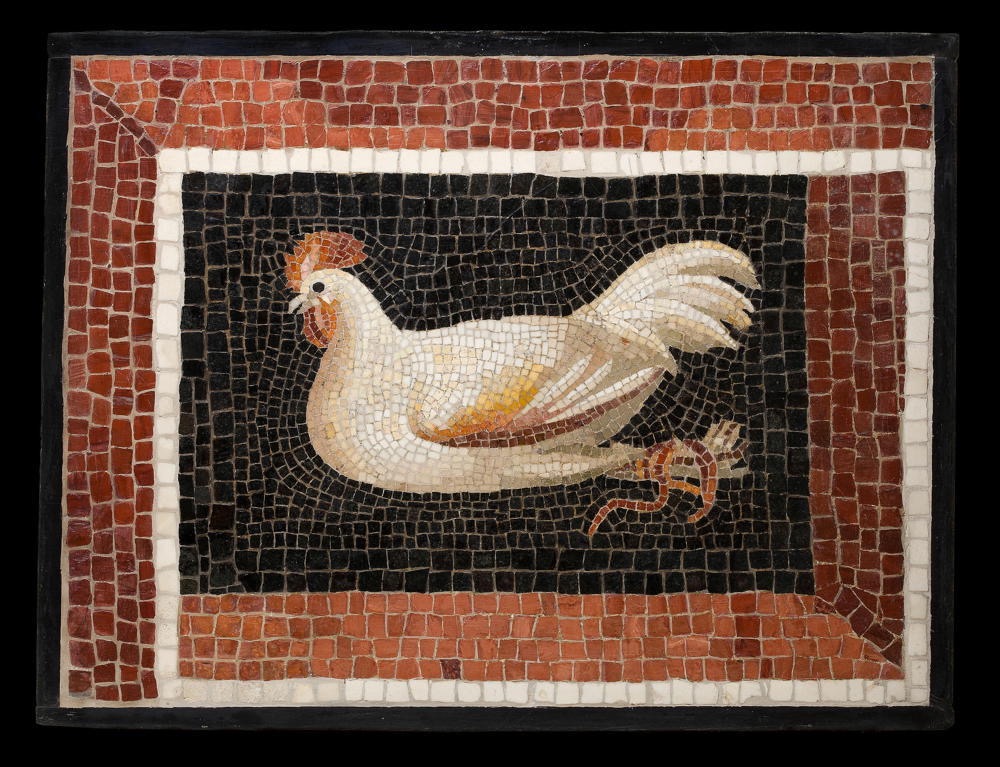
Roman; Rome, Italy: Mosaic Floor Panel Depicting a Bound Rooster
(2nd century)
" … so I almost fervently imagine."
I cannot definitively declare anything about my paternal grandmother's family. Everything I ascertain seems based upon questionable scholarship, the result of seekers perhaps desperate to confirm their most craven convictions. Everyone secretly believes their family comes from royalty. Everyone imagines they're due some long-lost inheritance. Everyone imagines they come from noble characters, dukes, and dutchesses if not grand viziers. It sometimes even seems clear how to get there from here. Just log into Ancestor.com and follow the threads if you can. Nobody adequately imagines how much speculation went into those records and how little source documentation was ever discovered. Those who retain old family bibles might have the best documentation possible. Still, in the case of those immaculate births where the offspring seemed remarkably mature for a newborn, even the Good Book might contain fiction, if for all the very best reasons.
So, I try to take my discoveries with hefty spoonfuls of sand.
Leaps&Bounds
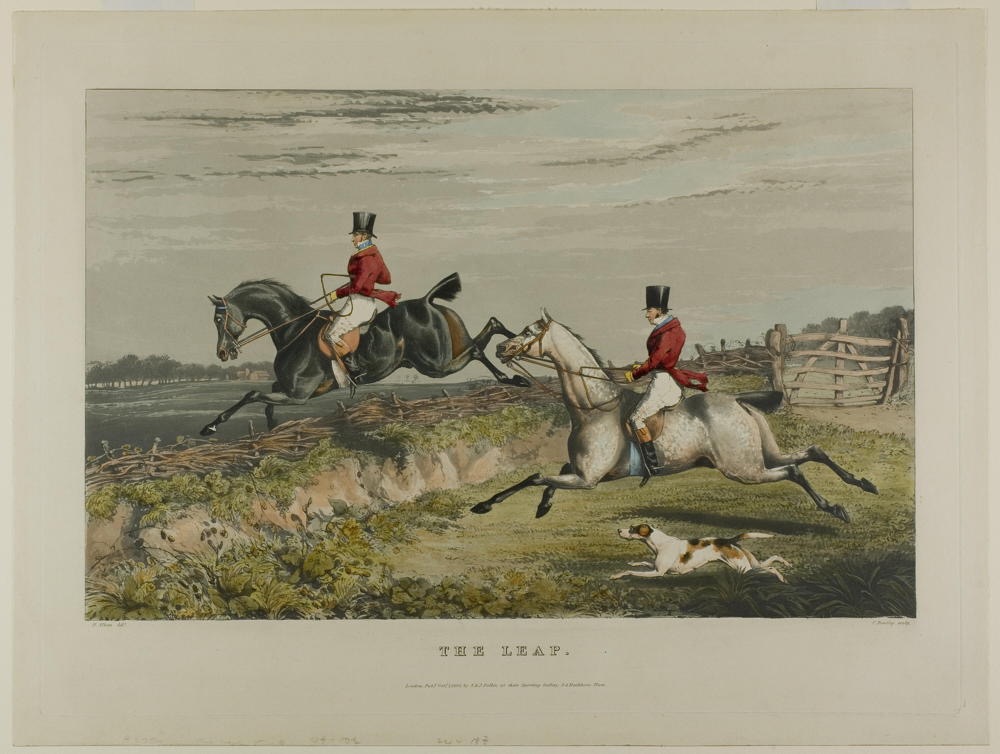
Charles Bentley: The Leap, from Fox Hunting (1828)
"She ultimately came to carry even her trauma well."
Caroline (Carrie) Pat Bounds, my paternal grandmother, was nobody's notion of aristocracy in action, though her ancestry strongly suggests aristocratic blood. Belief in the supremacy of aristocratic ancestry seems to be similar to believing in white supremacy or any inheritance-based privilege. These were stories concocted to encourage acceptance of other than democratically-elected rulers. Science suggests that genius does not run in families, though enough examples convince most that it certainly must. I swell with pride when I imagine my German genes giving me an advantage. As the history of paternal hierarchies demonstrates, good governance was never inheritable; neither was good sense. Each generation brings certain privileges and deficiencies into play. Very little's ever decided on day one.
The environment one's raised in might better determine later successes and failures, but ample stories suggest that almost anyone can overcome nearly anything in this life.
GilliamCounty
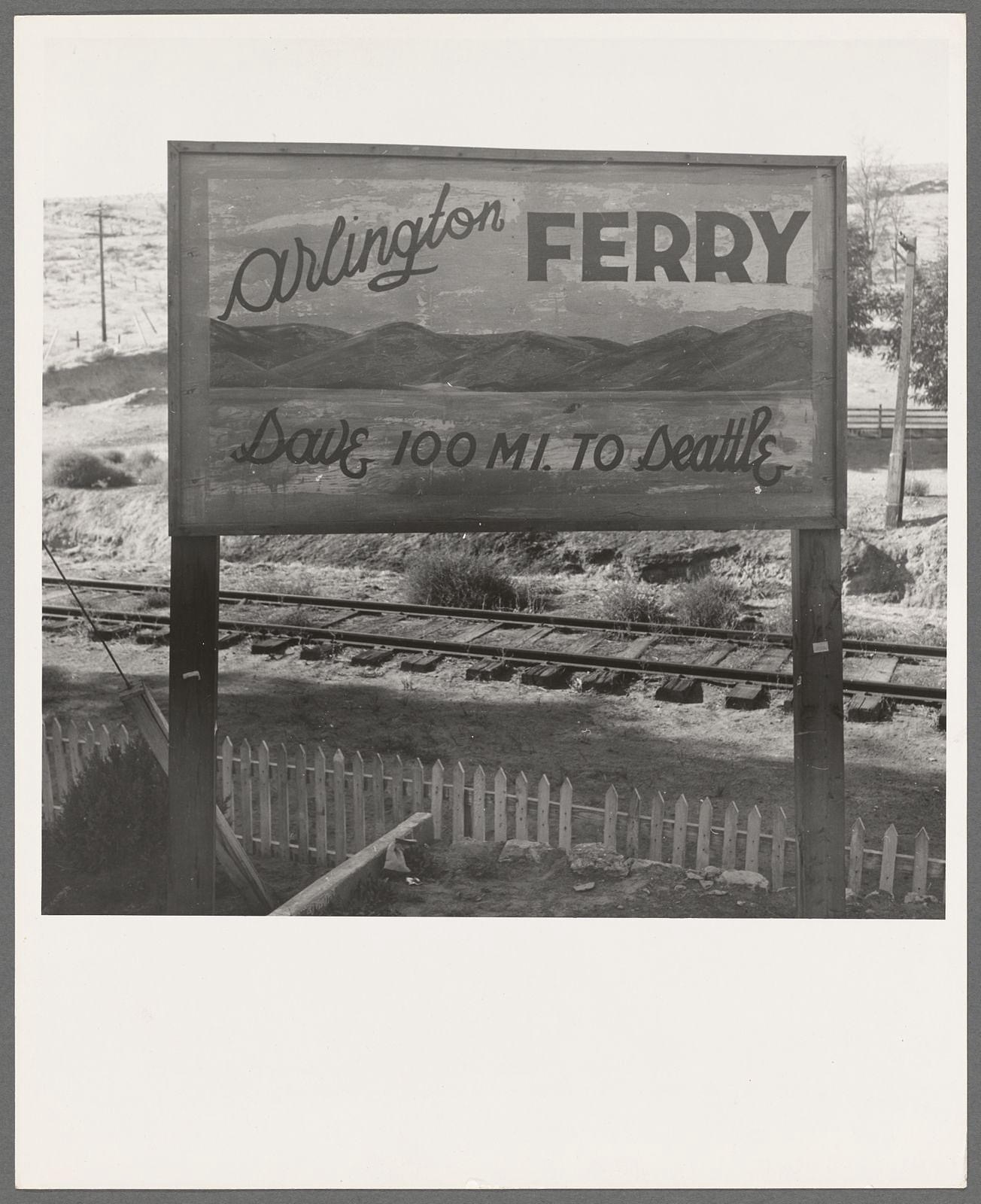
Dorothea Lange: On transportation outskirts of a small Oregon town
on the Columbia River. Arlington, Gilliam County, Oregon (1939)
"Those churches held the records."
My second great-grandparents were mostly late arrivers in Oregon. Those who weren't late arrivers found their farm after lengthy delays. Somewhere around 1885, Alonzo Kenaston and Maria (Seward) Kenaston finally returned to Oregon after their thoroughly discouraging honeymoon trip in 1865, this time by train. They'd homesteaded in the Nebraska Sandhills after dropping four children in Illinois and Missouri, including my great-grandfather Luther, in 1875. Four more in Nebraska, only two of whom lived, left them with five kids ranging from twenty-one to two by July of 1886 when Alonzo finally died of His Troubles, the effects of the Rheumatic Fever he'd contracted while marching barefoot in the snow during the Civil War. They'd finally realized their dream, acquiring acreage on Buckhorn Road just West of Mayville, Gilliam County, Oregon.
Another set of second great-grandparents had recently acquired the land next to the Kenaston spread.
TrackingProgress
![]()
Julius Gari Melchers: Mother and Child (c. 1906)
"This world moves exclusively in mighty mysterious ways."
I can track my forebears’ migrations by noticing where they dropped their babies. Those prior generations seem to have been constantly on the move, though vagaries of time might better explain their apparent restlessness. I can relive a decade in a minute, but they lived it a minute at a time. The births maintained a background rhythm that seems extraordinarily regular today. Another child would appear every eighteen to twenty-four months, most with a birth location attached. By tracking where and when those babies arrived, I easily visualize a map of their progress. They generally kept moving West, with settled periods of varying lengths. My fourth great-grandfather, James Emsley Mayfield, returned to Central Tennessee from his birthplace in Albemarle, North Carolina, and raised his family there in apparent proximity to his extended family. Born just after The Creek killed his father in 1780, he lived until he was 75 and died in 1855 in Montgomery County, Illinois, near the end of what was known as The Great Highway, the primary route between the headwaters of The Potomac in Maryland and The Mississippi.
Interestingly, that country was where James Emsely Mayfield's father had served with William Rodgers Clark in The Revolutionary War.
AndrewJackson
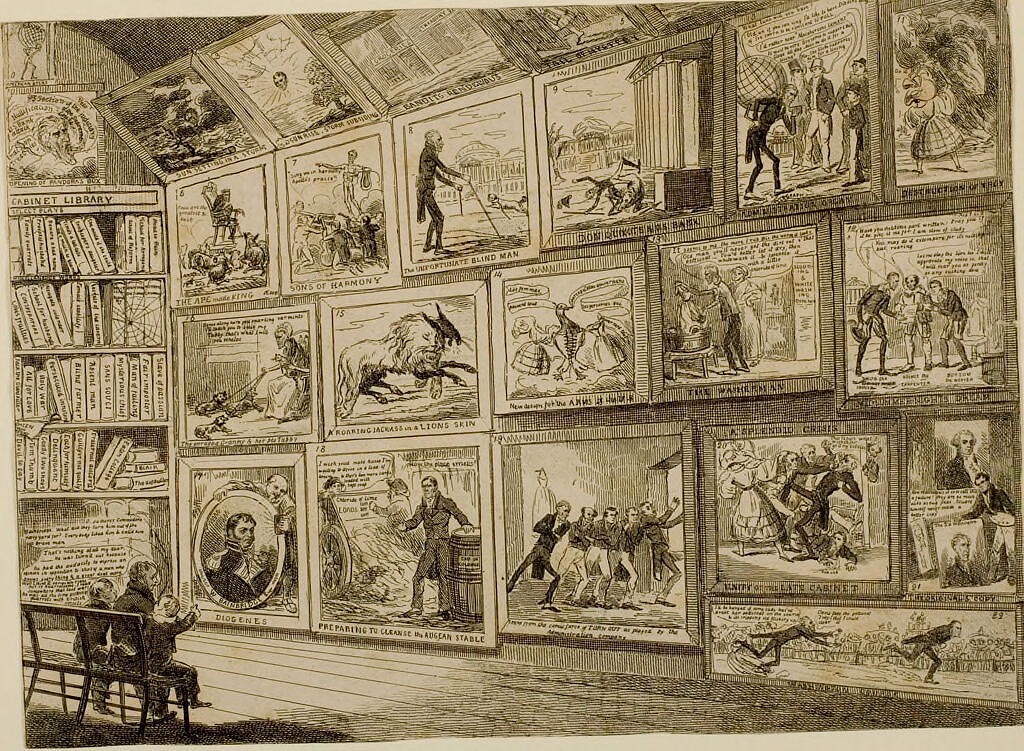
David Claypoole Johnston:
Exhibition of Cabinet Pictures: Satire on Andrew Jackson (19th century)
" … this swirl of stories constitutes adequate justification …"
I've long wondered why two of my great-grandfathers were named Andrew Jackson Mayfield. What must have moved the senior AJ's father, James Emsley Mayfield, to name his firstborn after that future President? What experience could have been so significant to move that son to name one of his sons similarly? The answer might lie in where AJ senior's grandfather, James M. Mayfield, my fifth Great-grandfather, settled after he slipped over the Cumberland Gap and into Indian Reserve territory sometime before 1780.
Mary Carter's book Fifteen Southern Families states, "The Mayfield family all seemed to have been of the caliber of Daniel Boone, David Crockett, and other frontiersmen.
Weekly Writing Summary For The Week Ending 4/11/2024
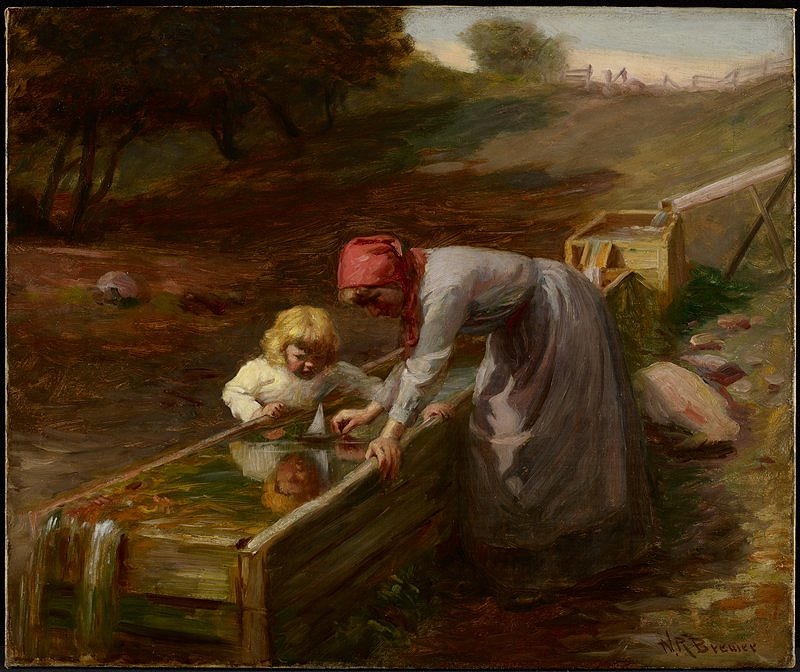
Nicholas Richard Brewer: At the Spring (c. 1895)
How Utterly Renewing!
It must be that expanding one dimension also expands others. Shoving deeper into the past might naturally nudge further into some future, too, like one of those graphic images with 'preserve dimensions' enabled. When I push my Fambly history further into the past, my future seems to extend itself in sympathetic balance. The result broadens, deepens, and heightens to keep all dimensions in synch. The result seems like a net expansion but with much less effort than expected. I shove one single edge, and the rest harmoniously maintain their relationship relative to me. Who knew that delving into history might invoke principles of physics? My world seems in ever greater balance as a direct result of my effort to dot a long naked 'i' and advance what I figured needed to be advanced. There will be no finish. Finishing could not possibly be the purpose of this series. I have been discovering myself in the stories I've been uncovering. Blow off the moss and rust, and they might be as fresh as they ever were. My history, like yours, presents as extended metaphors. I dare not interpret the least of them literally, yet I dare not interpret them in some way. How utterly renewing!
RatHoling
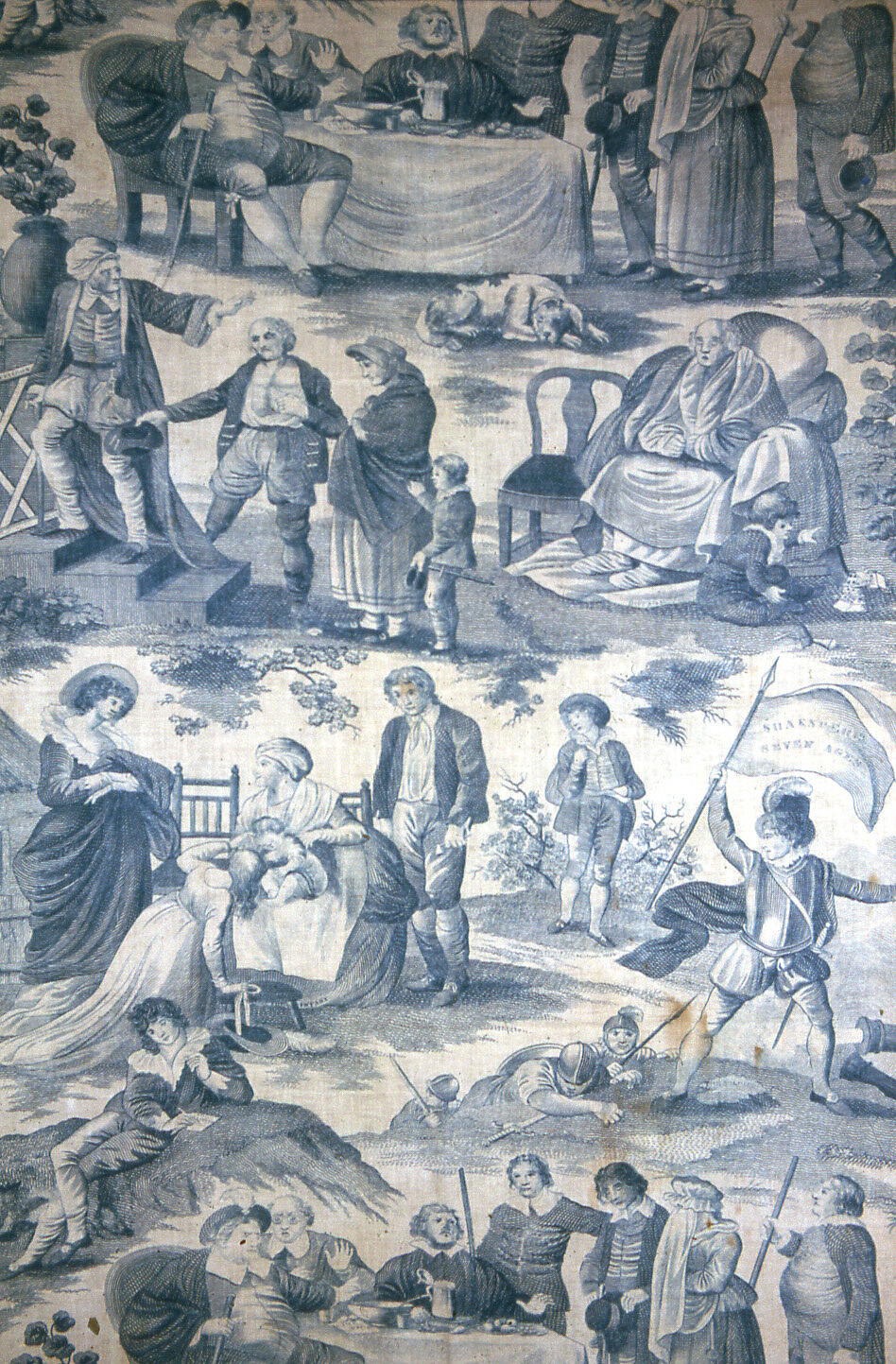
Engraved by John Slack:
Shakespeare’s Seven Ages (c. 1805)
"You may now safely refer to me as "Sir."
I'd always felt bothered that I had so little information about the Mayfield family's background. My Great-Grandmother was a Mayfield before she became a Kenaston, and I had a wealth of stories about the Kenaston clan. The Mayfield story petered out in the South just before the Civil War. I suspected they were separationists and Confederates, though, because two generations of the line, my 3rd and 4th Greats, were named Andrew Jackson Mayfield. My stories about them went no further. I suspected them of Southern sympathies during The War because they'd lived in Tennesee, and the elder Andrew married a woman from Georgia. I understand why my forebears revered Andrew Jackson. They loved him because he refused to shine a British Officer's boots during The War of 1812, then routed them out of New Orleans. They probably liked him better because he helped open land for settlement in Florida and Georgia, west to the Mississippi, killing or exiling the natives. His Trail of Tears was cause for enthusiastic cheers for those would-be pioneers waiting for openings from East of the Alleghenies.
So, I started following the stories and checking a variety of sources.
NewAmsterdam
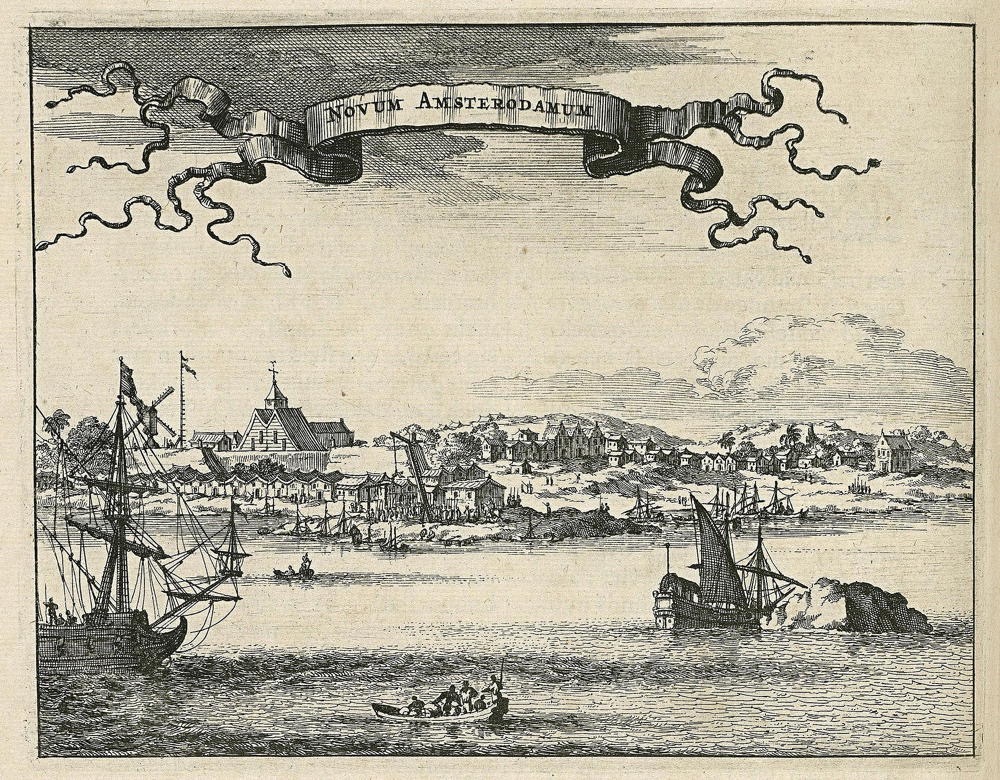
Jacob van Meurs: View of Nieuw Amsterdam.
Novum Amsterodamum (1662)
" … there were many mysteries involved in their history."
The Northern Netherlands began building their foreign trade early in the seventeenth century. They were late to the party. England, Spain, and even Portugal were well ahead of the Dutch in creating colonies. The Dutch weren't even a complete country yet, for they had split themselves in trying to separate from Spanish domination, the Southern portion of the country still Hapsburg Catholic clinging to Spain and the Northern part just exploring an identity as an independent nation. They were still trying to invent an identity when their Dutch West India Company began exploring territory in the New World: New Netherland. A contract English captain, Henry Hudson, investigating the possible existence of a shortcut to the Far East, "discovered" The Hudson River, resulting in a Dutch fur trading settlement in what would become Albany, New York. Manhattan, adjacent New Jersey, and Long Island were likewise claimed as New Amsterdam.
By 1636, The Dutch West India Company was importing contract laborers to colonize this territory, including my tenth great-grandfather Cornelis Aertsen Van Schaick.
Evan&Sara
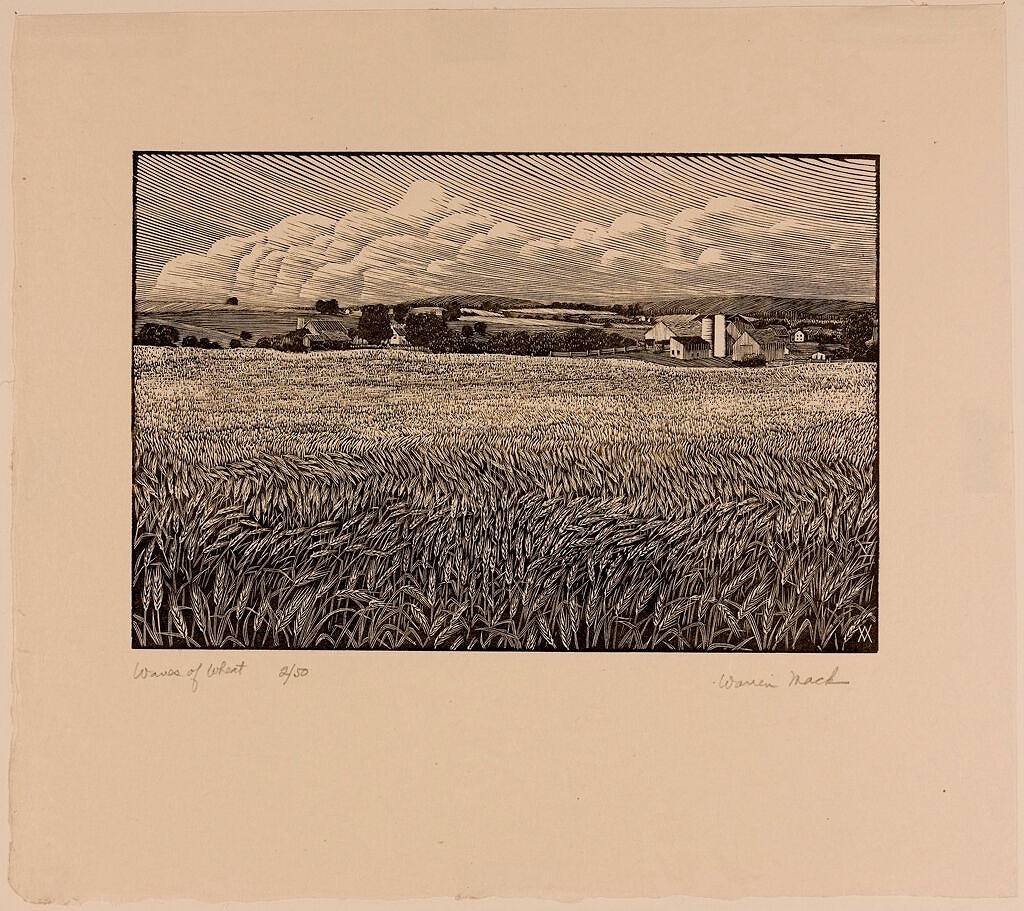
Warren Mack: Waves of Wheat (20th century)
"It should be no wonder."
According to a history written by their daughter Ada, my 2X great-grandfather Evan Arthur Wallace, born in Marysville, Iowa, in February 1847, married my 2X great-grandmother, Sara Adeline Jackson, born in March 1851, on August 16, 1868, at Lovilia, Iowa. They moved onto a farm situated between Lovilia and Albia, Iowa, where they brought three sons into the world: Theodore Penn (1869), my great-grandfather Nathaniel Parker (1871), and William Elmer (1874). When Elmer was three weeks old, they left Iowa with all their belongings that they could carry in a buckboard and set out for Fort Dodge, Iowa, intent upon joining an emigrant train bound for Salt Lake City. They expected to buy a covered wagon, supplies, and tools, then travel overland to Dayton, Washington. Reports of "Indian trouble" along the route convinced them to take an overland stage instead. "There were no roads, just wagon tracks, and driver knowledge. Women and children rode inside the stage while men rode on top with rifles at the ready." They were frightened by Indians twice, and at The Great Oregon Divide, women and children left the stage to walk rather than ride over that narrow passage.
The stage took them to Walla Walla.
CreatingHistory
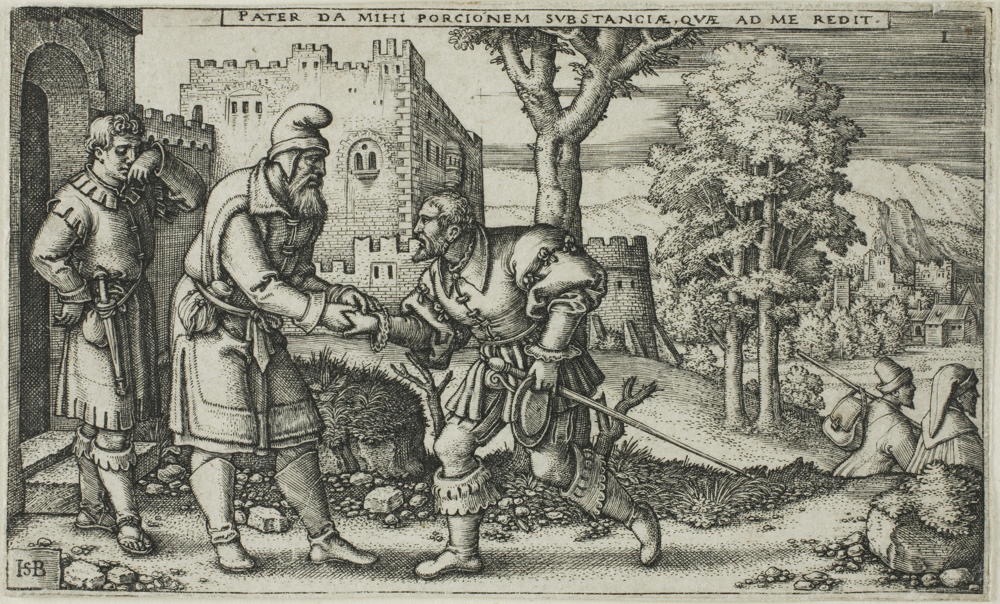
Sebald Beham:
The Departure of the Prodigal Son,
plate one from The History of the Prodigal Son
(Early Sixteenth Century)
"We are actively, if extremely subtly, becoming the very stuff of our transcriptions …"
It seems unlikely to me that I am at this moment CreatingHistory. I began creating this Fambly history under the mistaken impression that I would just be transcribing previously assembled information when it seems more likely that I have been CreatingHistory instead. I realize that this unfolding story had never been told before now. Oh, bits and pieces of it have certainly previously crossed lips, but never these particular configurations. The stories sure seem familiar, but they include fresh particulars. It seemed that every time I told a story, it became different. I can't quite claim to have been the source material, but I must admit I significantly changed it in assembling it, I included some speculation but tried to clearly identify when I was guessing. I wasn't really creating my history, but my Fambly's. Still, I must admit to having been the author.
Where does history originate?
TheWallaceProblem
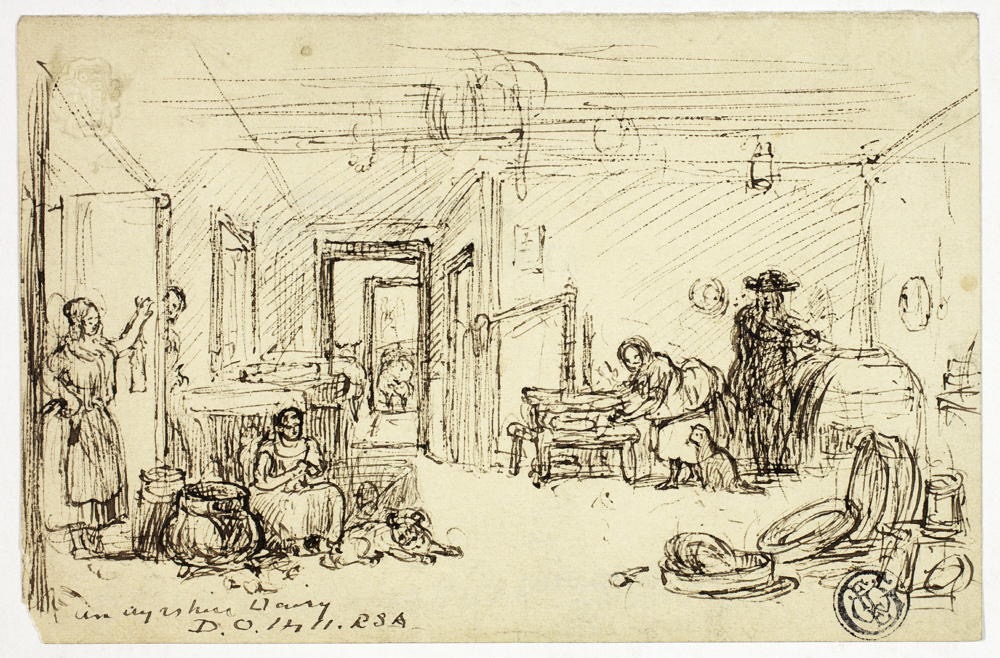
David Octavius Hill: In Ayrshire Dairy (1822-1870)
"Geneology seems indistinguishable from vanity … "
My mother's maiden name was Wallace. Wallace ain't quite Smith, but it seems an uncommonly common name. People wondered if she was related to THE Wallace, the one depicted in Braveheart. There's plenty of genealogical information on the Wallace Clan, and I can employ the term 'clan' because it's an authentically Scottish surname, as Scottish as Burns or Bruce. The wealth of information brings both ease and complication. The fame has attracted hoards of researchers before me, and they've left the rough equivalent of a muddy trench where a path might otherwise lie. Almost every query quite naturally slipped into that trench. Before I knew it, I was twenty-eight uninterrupted generations back to the true Patriarch of every Wallace since: Elmerus Galeius of Wales around 1100. That such a quintessentially Scot hailed from Wales carries no wee dram of irony. I suspect such contradictions underlie some of what the world recognizes as the Scottish attitude.
I feel suspicious of my own research.
Patriarch
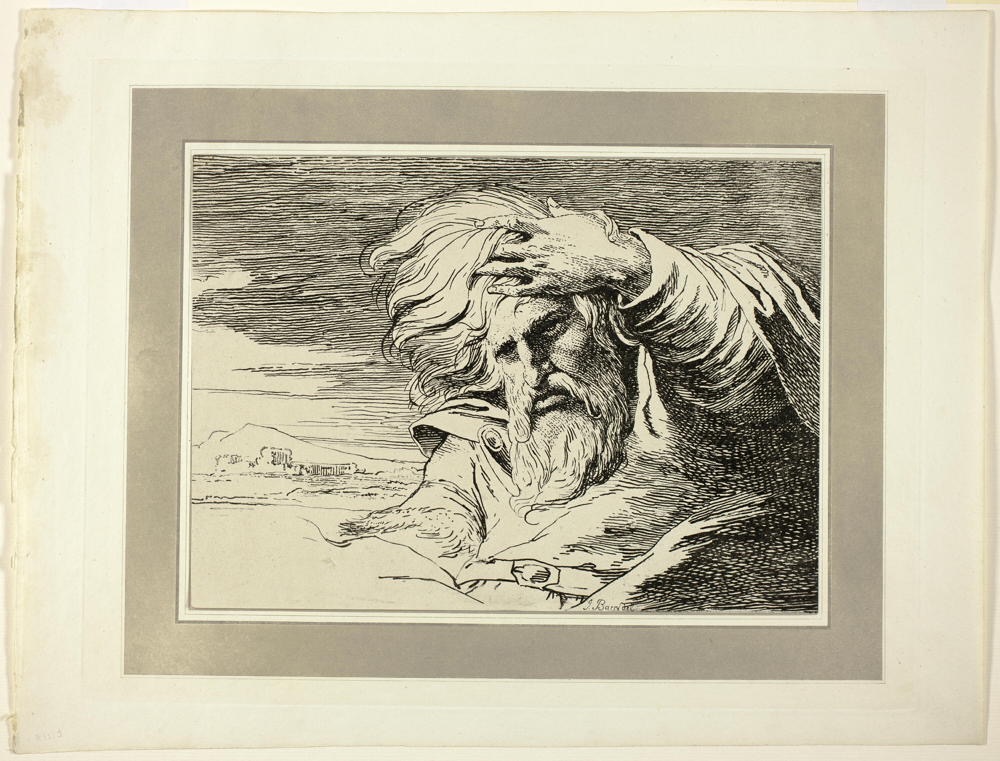
James Barry: Eastern Patriarch (1803)
"sate in stocks for railing."
Patriarchy can prove to be slippery to determine. In some ways, each generation produces a patriarch, though some generations produce especially noteworthy ones. Those who serve as the center point of a grand convergence or the point of exceptional dispersal most often earn the label. In practice, assigning this title must surely prove arbitrary, with little besides opportunity or convenience deciding. In the Kenaston clan, I choose to name John Keniston, my 8th great-grandfather, born in 1615 in Manchester, England. (Spellings were fluid then; Keniston remained with an 'i' until around 1700 when the 'a' replaced it.) He arrived in Dover, Massachusetts Bay Colony, in 1623 at the age of eight. His parents, Henry and Elizabeth Leeze, and his sister, Mary, and brother, James, died of "The Sickness" shortly after their ship, Margaret and John, arrived.
At age thirty, in 1645, he married Agnes, daughter of The Reverend John Moody, and settled into the fishing village of Strawberry Banke, now known as Portsmouth, New Hampshire.
Weekly Writing Summary For The Week Ending 4/04/2024
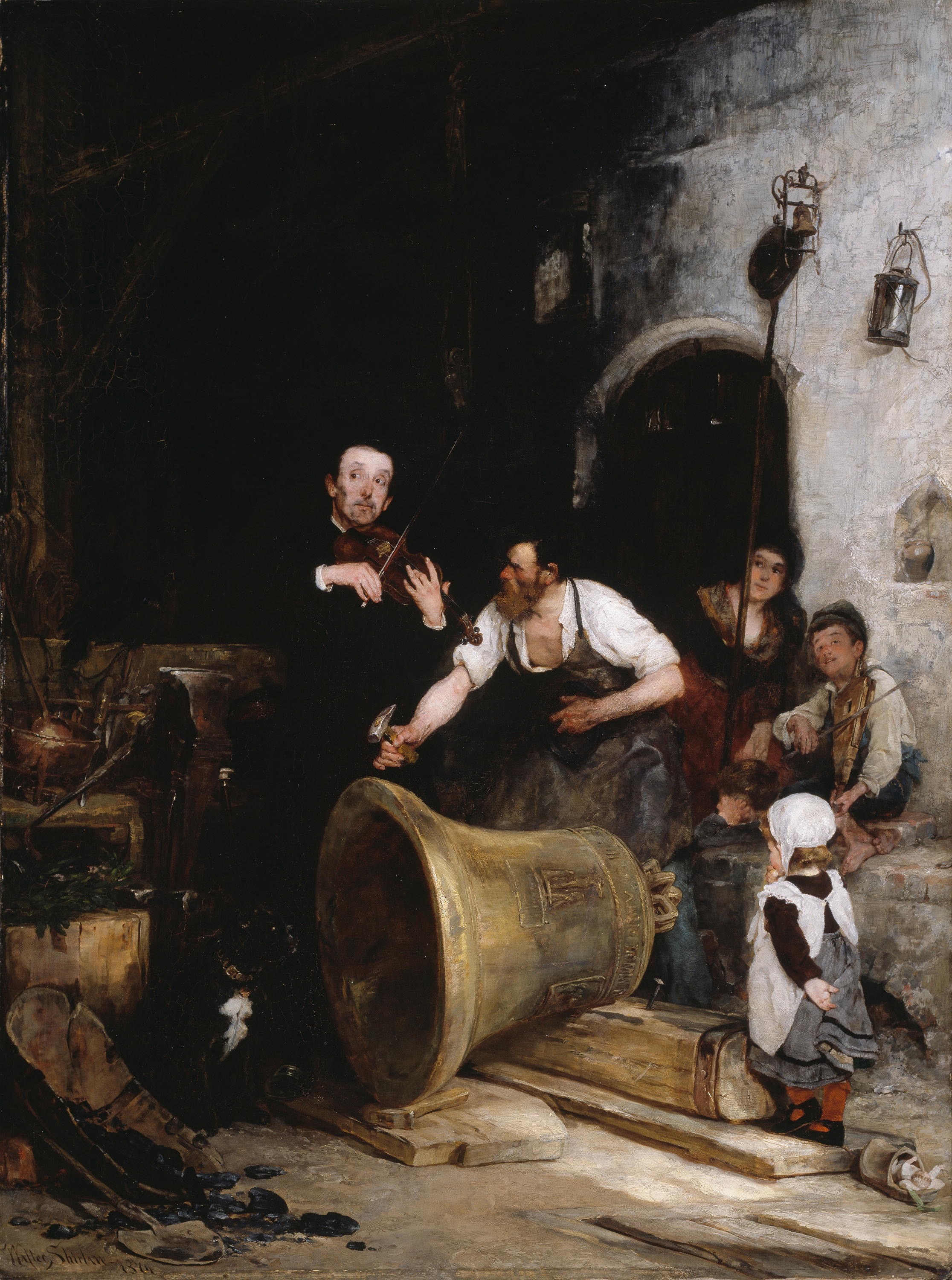
Walter Shirlaw: Toning the Bell (1874)
I Couldn't Possibly Be Any Different
The seasons shifted and I find myself already past Easter, past Passover, and screaming toward summer. The distress the receding winter visited upon me was unremarkable in retrospect, though it seemed anything but unremarkable as it was passing. Retrospection rarely carries any existential dread. It sugarcoats experiences and unavoidably misrepresents. As I create these Fambly histories, I remain almost painfully aware of all I cannot capture in them. I might curse the incompleteness I encounter in the surviving records while acknowledging that I am choosing not to mention some details. I attempt to capture essences without knowing what might comprise them. Merriweather Lewis believed dread to be an unforgivable sin. He insisted that he should move forward without much concern about the immediate future. That will sort itself out without anticipation. I might productively progress into indifference, too, interested in how my story unfolds and confident that I'm capable of coping with whatever unfolds. The historian seeks to know what happened next but dares not dwell too much on precisely where he's propelling himself. Not one of my forebears ever once knew how their stories would turn out. I might accept that I couldn't possibly be any different.
Kenaston
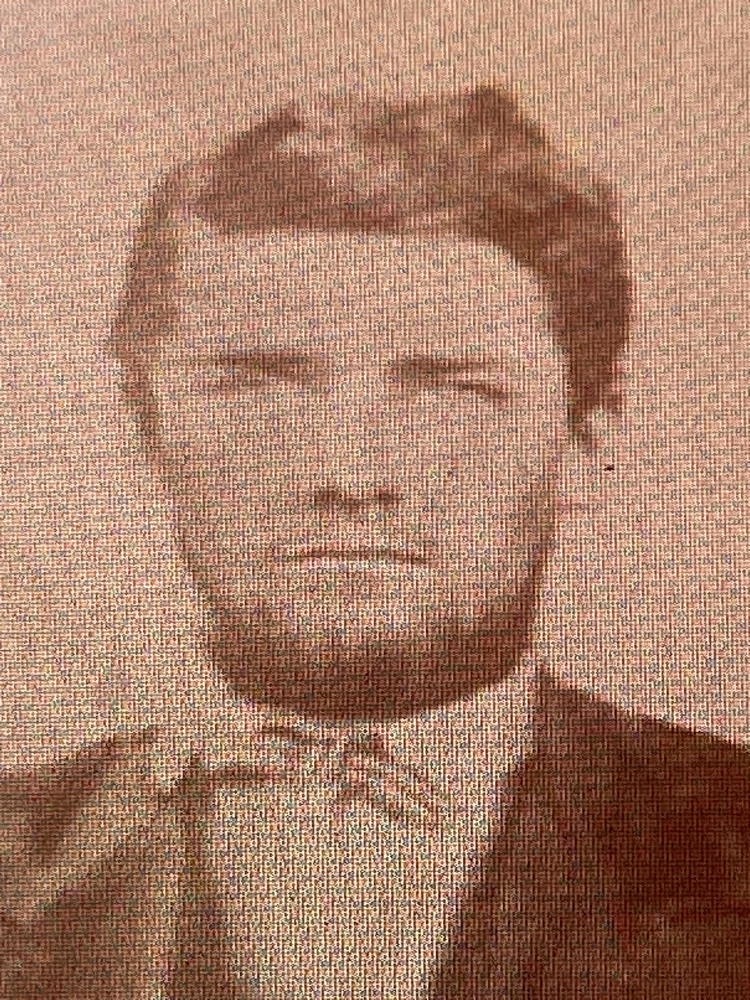
Alonzo Trembel Kenaston
1843 – 1886
My 2X great grandfather
"History seems to happen exclusively by accident on purpose."
All of his adult life, my two times great-grandfather, Alonzo Trembel Kenaston, suffered from a condition he referred to as his Troubles, which began with his service as a nineteen-year-old in the Army of the Cumberland's Kentucky Campaign in the Autumn of 1862. He was a fresh recruit from Illinois with only three weeks of training before he marched into Kentucky to chase Bragg's Confederate force out of the state. The campaign achieved its objective, but at ruinous cost; the Union lost battles but managed to scare off its opponents with sheer numbers. The march proved ruinous enough, that country having suffered through the summer drought, leaving little water for fifty-five thousand Union and seventeen thousand Confederate troops. The campaign became a pursuit for the Union, hampered by rough and hilly terrain culminating in an unseasonal wet snowfall, which left the barefoot troops at great disadvantage.
Seward

John Bunyan:
The pilgrim's progress, frontispiece (1684)
"Time exclusively moves in both tiny and enormous increments."
William Seward and his wife Grace (Norton), my eighth great-grandparents, arrived from England in what would become Guilford, Connecticut, in the late summer of 1639. They were genuine pilgrims and pioneers. They slowly built a town that eventually spread beyond the land they'd initially purchased from the female chief of the local natives. Tensions built over time. They and their son John survived King Philip's War, a two-year tangle between colonists and local natives that left a thousand colonists dead and more than two thousand natives killed or enslaved. In 1682, the second generation of native North American-born Sewards arrived, John, Jr. He would start a migration further North. My fifth great-grandfather, Aaron, John Jr's tenth child, would marry Elizabeth Clark in Granville, MA, in 1757, then serve in the Revolutionary War, father nine children, and end up in Kortright, New York. I suspect he received a land grant for his service in the war. The matriarch Grace's headstone remains legible, built into a fine wall constructed in Guilford when the original burying yard and town square were repurposed. They had prospered.
I used to believe that my Sewards were somehow related to President Lincoln's Secretary of State because that Seward also hailed from upstate New York, but I was mistaken.
Spokes
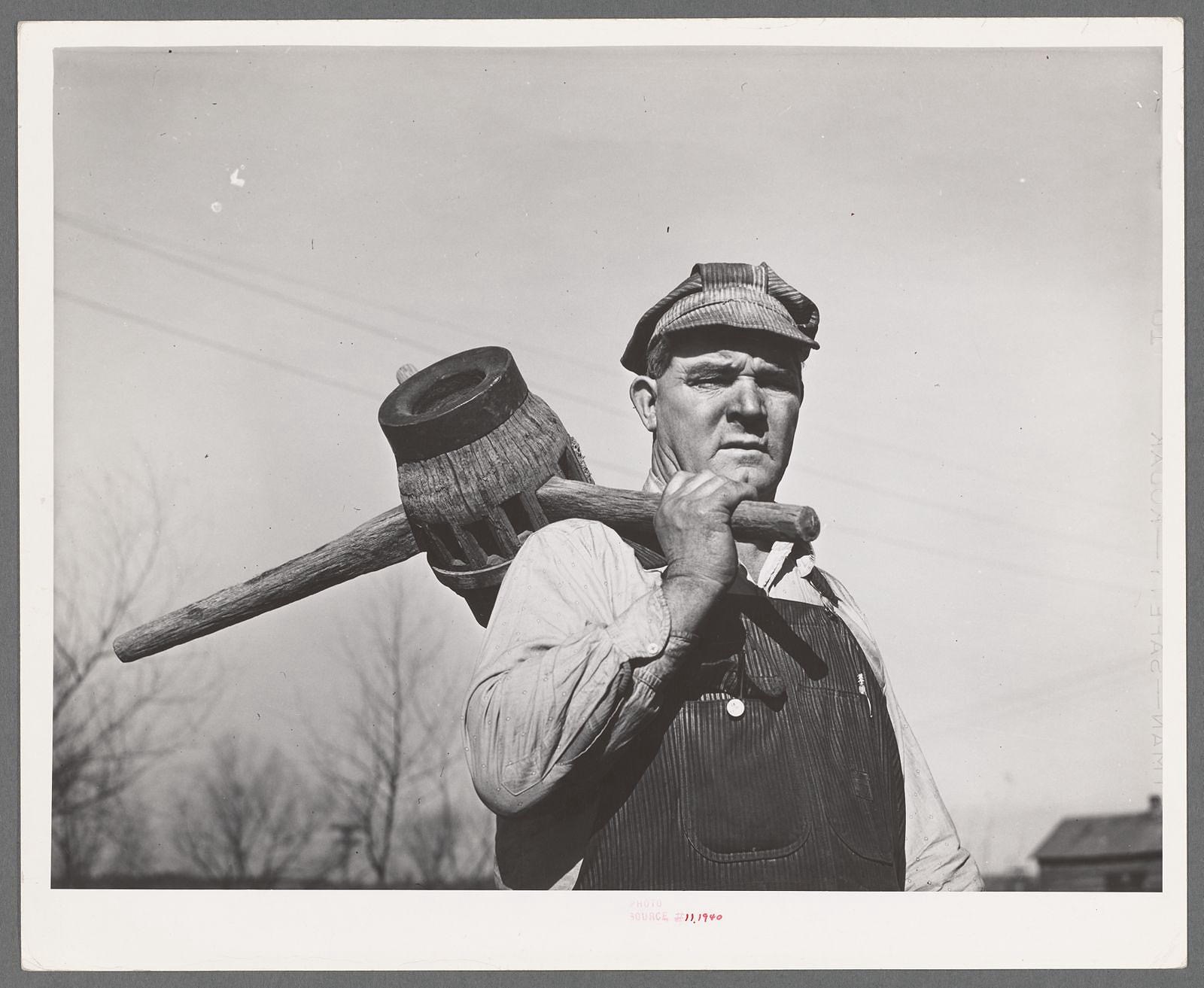
Lee Russell: Blacksmith with wagon wheel hub and spokes. Depew, Oklahoma (1940)
"Silences must frame meaning."
I earlier characterized history as being like tributaries. Like all metaphors, this one should seem imperfect in practice. Imperfect but also essential, for some visualization appears necessary in order for me to produce an orderly—or orderly-seeming—exposition. I dare not just jump all over the place, a practice I've engaged in when performing oral representations of my histories. Short stories don't demand the quality of continuity insisted upon by broader themes. I've more than once already considered that my mission might have always been impossible, even at the beginning when I felt energizing motivation. Like many endeavors, this one began as a Bright Idea! Bright Ideas! bring their own motivating forces with them and require little goosing. Bright Ideas!, however, seem fundamentally different from projects. They might prove to be the seed of a project but will need to mature into something characterized by other than blind enthusiasm. Coherence insists upon something different and much more complex.
I've been amending my original notions about this history since I started laying down the first story.
MigratingHomeward
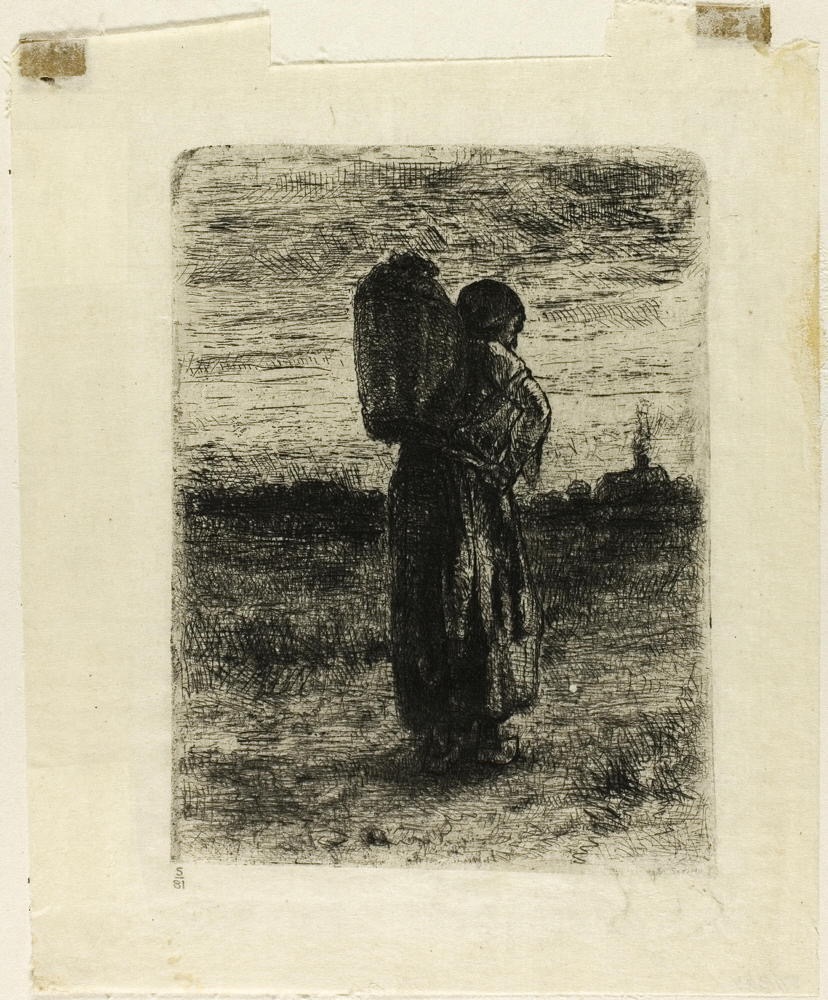
Jozef Israëls: Homewards (not dated)
"I am the product of apparently inexorable attraction, destinies manifest."
After 1800, the Swift family's arc shifted westerly. Its second century in the Americas would watch it move into, then through the so-called heartland. If family history was a race, the Swift progeny were to win it, for they would be among the first to see The Eden At The End Of The Oregon Trail. They would have to leave the Eden at the other end of that trail, though, and Grayson County, Virginia, clearly also qualifies as an Eden. Even the area of North Carolina where the Thomas Swift family first settled after traveling down The Great Highway from Maryland still seems Eden-like, it having been the setting of the old Andy Griffith Show's Mayberry, a museum in Andy's honor is located near the old Alamance Battlefield. The forces driving western migration were growing, though. Of course, my interest focused on those who left rather than those who stayed. Those who left became my forebears, while those who stayed behind will forever remain ever more distant aunts and uncles, cousins and hangers-on.
The records turn fuzzier after Flower Swift left Grayson County with his discredited son Thomas, probably first for Kentucky.
OddEnds
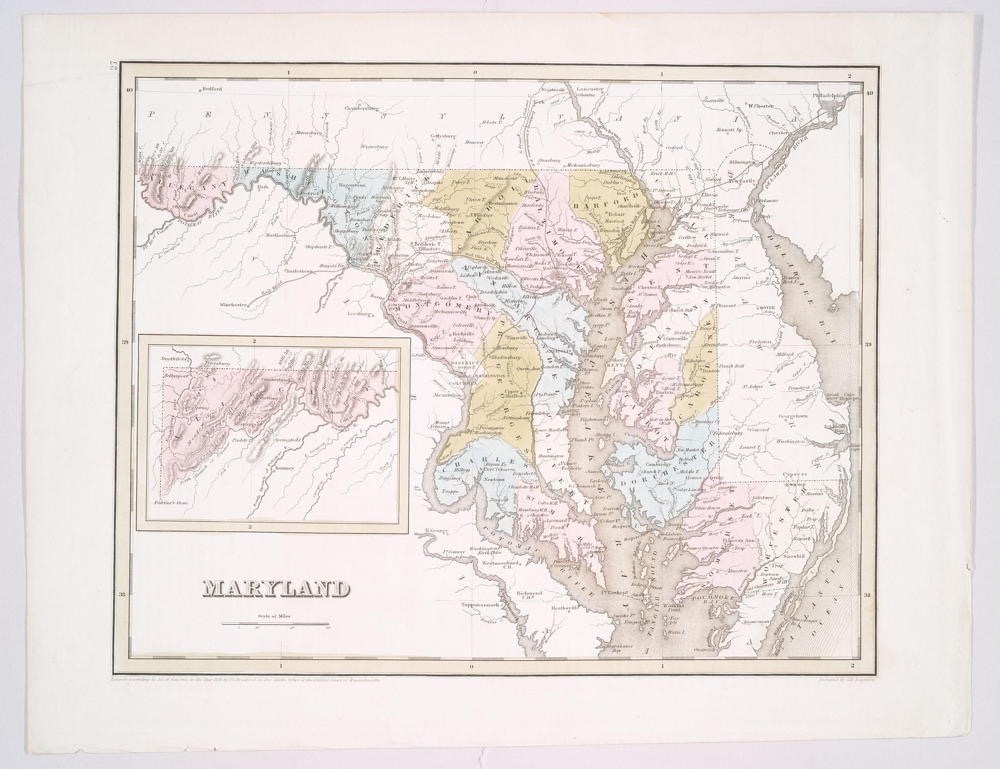
George W. Boynton, Engraver
T. G. Bradford, Publisher: Maryland (1838)
"The story could have been irretrievably lost in any generation."
Over half of the people coming to the British North American Colonies before the Revolution came as indentures. In 1674, one of my ninth great-grandfathers appeared in court in Maryland. A ship's captain, Thomas Jones, brought my forebear, his servant Edward "Teage," before the court, asking the judge to assess his age. The judge decided he was fourteen. The following year, Jones returned to court to claim a "headright" of land granted to him for transporting Edward Teage and three others to Maryland. A headright claim could grant land to anyone transporting people to the Maryland colony. Typically, those transported then worked as servants to the transporter for some period of years; after, if they survived, they would be free to do whatever they pleased. Fewer than half survived their indenture. Teage survived.
In 1695, Teague was back in court, claiming the right to 300 acres of land.
Prominence
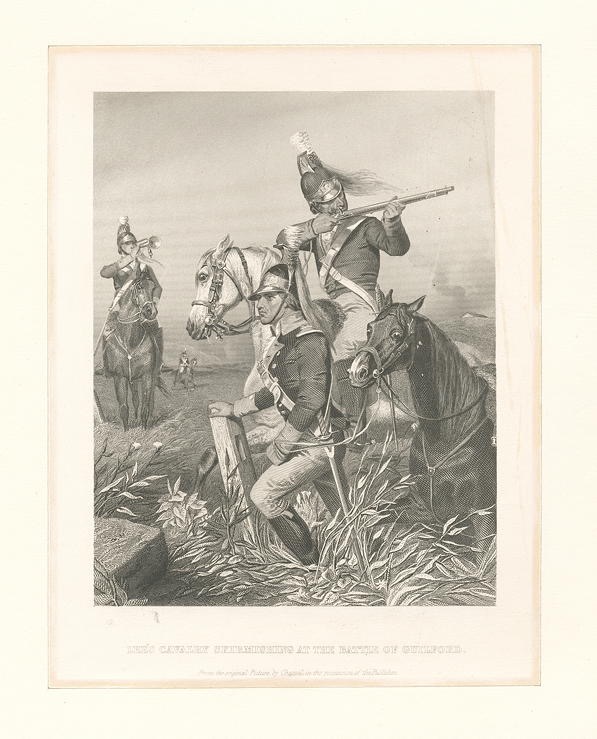
Unknown Artist: Lee's cavalry skirmishing at the Battle of Guilford.
(Print Issued 1789 - 1880)
"He left his Prominence behind."
Perhaps due to his Militia service in the Revolutionary War, my fifth great-grandfather, Flower Swift, rose to Prominence. With this came close brushes with several famous personalities. He served with distinction, though few details have been passed down. Those that survived show him to have been plucky, taking full advantage of his good fortunes. After Charleston's fall but before Camden, he was captured by a Tory patrol. As was the custom, he was disarmed and immediately paroled. Still, before he was dismissed, he overheard two British officers speaking of a planned assault on a crucial Rebel lead mine in his district. He reported this information to his officers, who passed it up the chain, clear to the offices of Virginia's Governor, Thomas Jefferson, who mustered additional militia units, appointing William Campbell, Patrick Henry's brother-in-law, to lead the expedition, and Walter Crockett, Davy's great uncle, as second in command. Swift's company most certainly fought under these in the following Battle of Guilford Courthouse, a pyrrhic victory for British forces that helped weaken the British before Yorktown. He certainly also fought at King's Mountain and in some expeditions against the Cherokee in Tennessee.
Swift served as a quartermaster when not riding or fighting.
Weekly Writing Summary For The Week Ending 3/28/2024
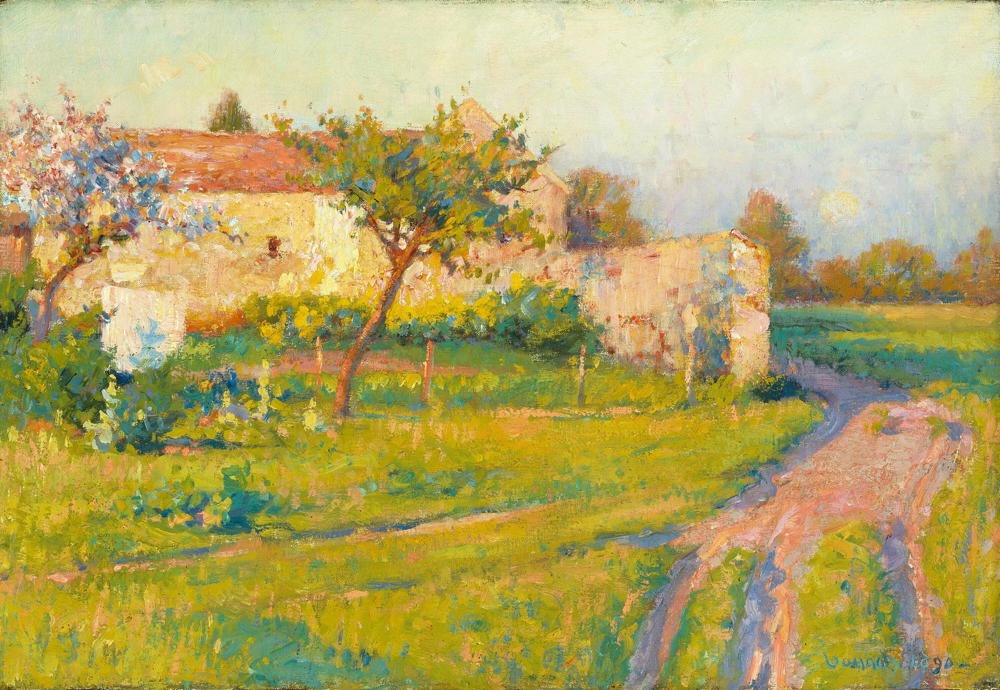
Robert William Vonnoh: Spring in France (1890)
Stories That Might Never Manage To Be Completely Told
Writing history seems very similar to writing fantasy. The writer must focus on coherence and continuity in both genres, for every story demands these. Nobody ever foresees what any story will demand of them. Research always proves wanting. I've been pouring through papers I have been collecting for decades, stumbling upon fresh details, and choosing which might fit into these stories, for no history scales to one inch equals one-inch granularity, and their continuity ultimately relies upon omissions. Complete histories must prove to be utter confusion; ditto with complete fantasies. Infinite effort might eventually prove the most satisfying. John Cage insisted that silence serves as the soul of all music. Mattisse allocated white spaces on his later canvasses. My progeny might easily use my history as a departure point to create some related, perhaps even more pleasing installments, for history seems alive and ever-growing. The actors eventually depart, but they leave behind their more resilient parts, stories that might never manage to be completely told.
Militia
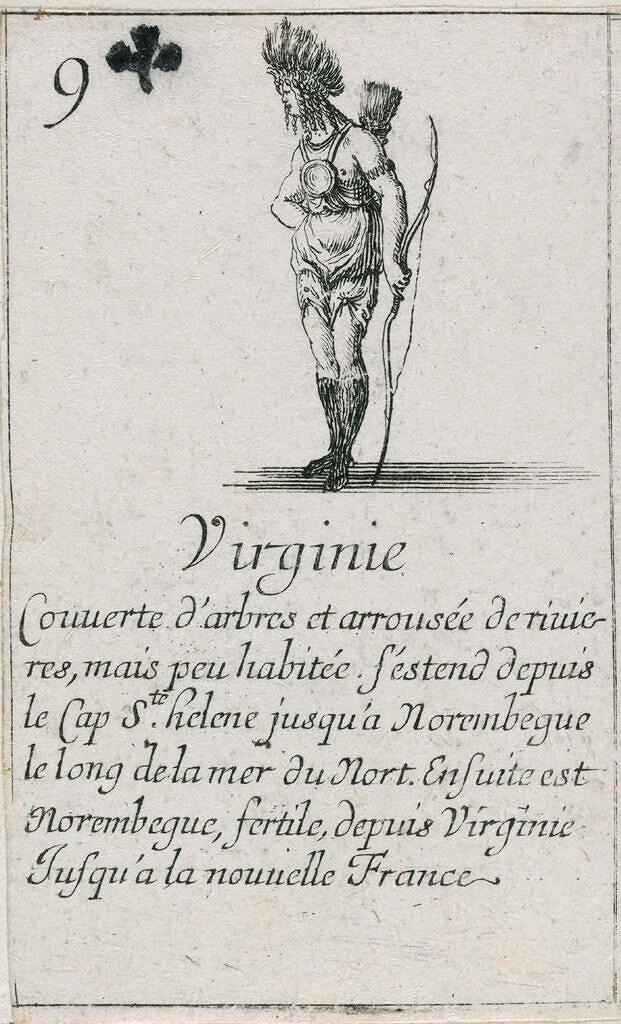
Stefano Della Bella: Virginia (17th century)
"Eye for an eye justice ruled the rough Western edge of our emerging nation."
Some accounts describe Flower Swift as a Quaker, while others report he was likely Baptist. Such distinctions made little difference along Virginia's Western Frontier in the last quarter of the eighteenth century. Swift's wife, Mary Bedsaul, was most certainly a Quaker, having come from an acknowledged Quaker family, and it's recognized that the militia company Swift led, first as a Captain and then later as a Colonel, was labeled a "Quaker" company. He might have been deemed qualified to serve to lead Quakers because he had Quakers in his extended family. Quakers might seem unlikely members of any military force, for even in colonial times, they refused to take the otherwise required oath of allegiance to the Commonwealth:
"We whose names are hereunder subscribed do swear that we renounce all allegiance to George Third, King of Great Britain, his heirs’ successors,
Flower
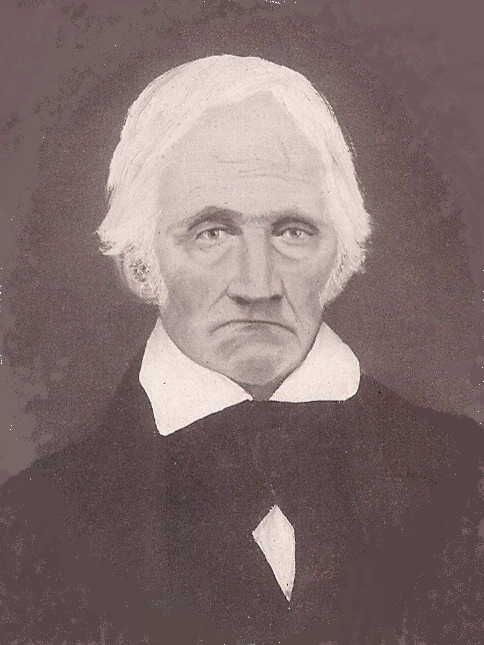
Flower Swift, a fifth Great-grandfather
(artist unknown) circa 1810
"The Revolutionary War was brewing … "
In the decades following the Lewis and Clark expedition, geographers and surveyors scoured the inner-mountain West, attempting to create accurate maps of the newly discovered territory. They were able to produce credible maps, too, which were certainly helpful enough to guide the upcoming pilgrims who would soon be flooding the Plains. Genealogy seems a similar occupation, for I'm scouring unfamiliar territory, seeking the source of incoming flows. If I find evidence of an ancestor, I wonder where they originated. I spot the higher peaks, knowing that more water will likely come off them. The high peaks in genealogical research tend to be the more famous people, for their notoriety encourages more researchers to focus and, therefore, discover more incoming flows.
The highest mountain in my family's history contains the unlikely name of Flower.
Jackson

Sidney E. Morse: Iowa (1842 - 1845)
Lionel Pincus and Princess Firyal Map Division
New York Public Library
" … only a little more than one-sixty-fourth of my DNA."
When she died in 1826, my fourth great-grandmother, Rachel Parker Jackson, left behind a four-year-old son with a high falutin' name, Nathaniel Parker Jackson. His paternal grandparents would raise him and his two surviving siblings to maturity near the Ohio River in Miller Township, Indiana. Shortly after his twenty-first birthday in 1843, he would head West toward Iowa territory in an oxcart with his new bride, Elizabeth Jane Teas. There were rumors that his grandparents had been stern replacements for his deceased parents and that he was anxious to get out on his own. I've always wondered why he set out so late in the year, for starting a westward journey in the Spring was more common. They left late in the year and made it only as far as the Burlington, Iowa, Mississippi River ferry crossing before disaster struck. Elizabeth slipped on the ferry and fell into the freezing river. She contracted pneumonia and died on her honeymoon, buried in Burlington, Iowa.
Ferries then were not yet steam-powered.
PilGrimEconomics
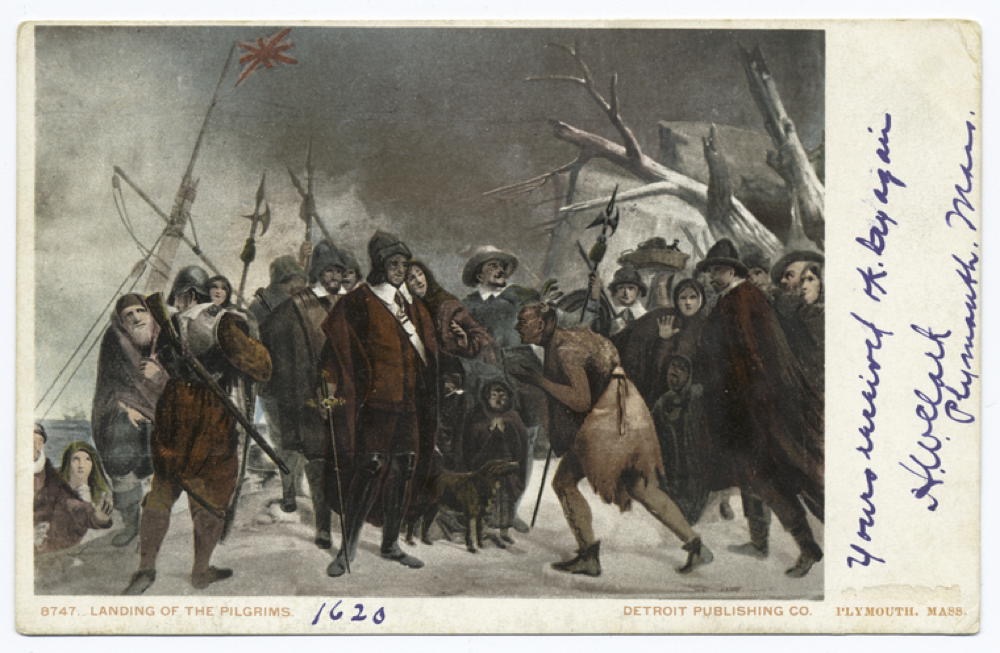
Postcard: Landing of the Pilgrims, Plymouth, Mass. (1898 - 1931)
"Their future insisted upon first routing them through their distant past."
Today, our Pilgrim ancestors are most often characterized as religious people who fled Old World oppression to found a new world rooted in religious liberty. Most pilgrims didn't believe in religious freedom. Besides Roger Williams, who founded a break-away colony in Rhode Island, Pilgrims were the soul of intolerance. Their intolerance was not solely rooted in spiritual conviction but perhaps primarily in economics. They'd mortgaged themselves as well as their ideals to fund their colonies. Not even in the early seventeenth century did money grow on trees. A wealthy congregation member didn't fund their expedition; stock investors did. They fronted our ancestors with the explicit expectation that they would be repaid and expected to be repaid handsomely and quickly, for they imagined they'd outsmarted the market to get in on the bottom floor of unlimited profits. Wasn't that New World brimming with resources ripe for plundering?
As always, the wild-eyed investors wildly underestimated the challenge, as did their Pilgrim debtors.
Perils
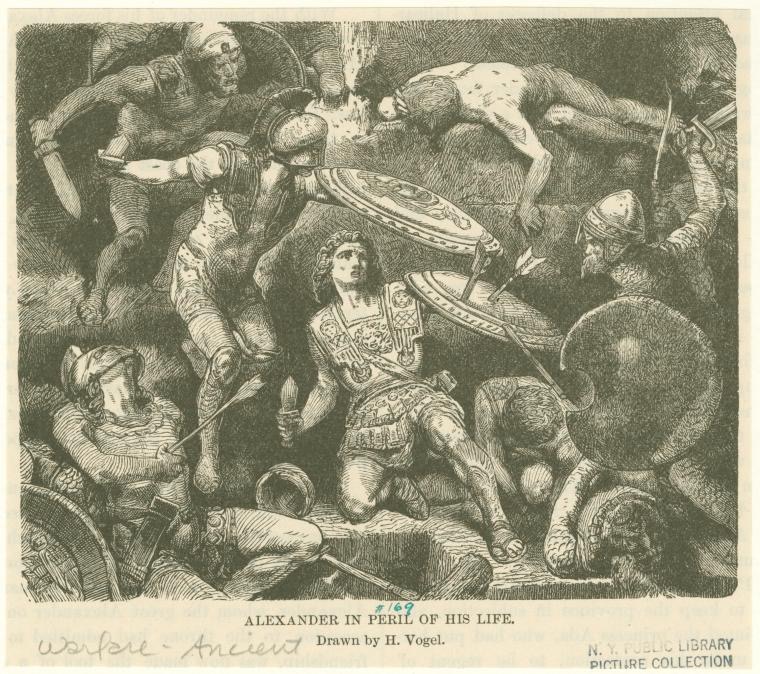
Hermann Vogel: Alexander in peril of his life 1885
" … what it must have meant … "
Writing history seems much more risky than writing my usual Philosophical, Autobiographical, Historical Fiction in the same way fantasy seems less exacting than fact. In fantasy, space wars rely upon thrusters and explosions spouting blossoms of flame that, in reality, simply could never happen. Real space battles would seem dull in comparison. Lest history seem tedious, the seduction to embellish hovers nearby. Who wouldn't want to characterize their forebears as noble? The inherent ambiguity present in any history leaves plenty of room for interpretation. Should I explain that the displaced local natives referred to my great great great grand pops as "a good white man," or am I indulging myself in whitewashing if I mention this, however much truth it might hold? I find myself surrounded by such judgment calls, each a dilemma with no entirely defensible resolution.
I choose. I feel forced to choose blindly.
Parker
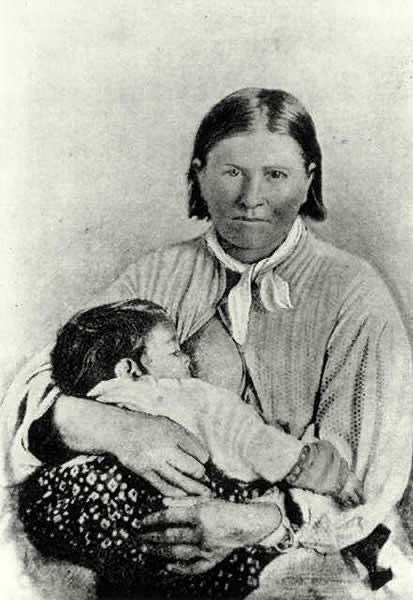
Cynthia Ann Parker, or Narua (Was Found),
and daughter, Topsannah (Prairie Flower), in 1861
" … I carry some of their life lessons within me …"
Cynthia Ann Parker, the niece of my fourth great-grandmother, Rachel Parker, might have been the most famous person in the history of our Fambly. She was the granddaughter of famed frontiersman and Revolutionary War soldier John Parker, Rachel's father, who was also a Predestination preacher of a Calvinist sect so conservative that it would have probably refused to grant Calvin admission into their congregation. Parker's vitae reads like a library full of dime-store frontier novels. He helped clear the frontier with Daniel Boone (stay tuned; there's a direct relationship with one of Boone's children in a later chapter), subdued the Cherokee, and generally made life miserable for natives and, later, Mexicans. Steven Austin invited him to migrate into Texas territory in the immediate aftermath of the Alamo debacle, where he founded a fort named after him, which is now Fork Parker State Park near the Texas town of Groesbeck. He was my fifth great-grandfather.
Shortly after he arrived in Texas, his rough blockhouse fort was overrun by Comanche, who killed him and four of his sons, along with other settlers.
Weekly Writing Summary For The Week Ending 3/21/2024
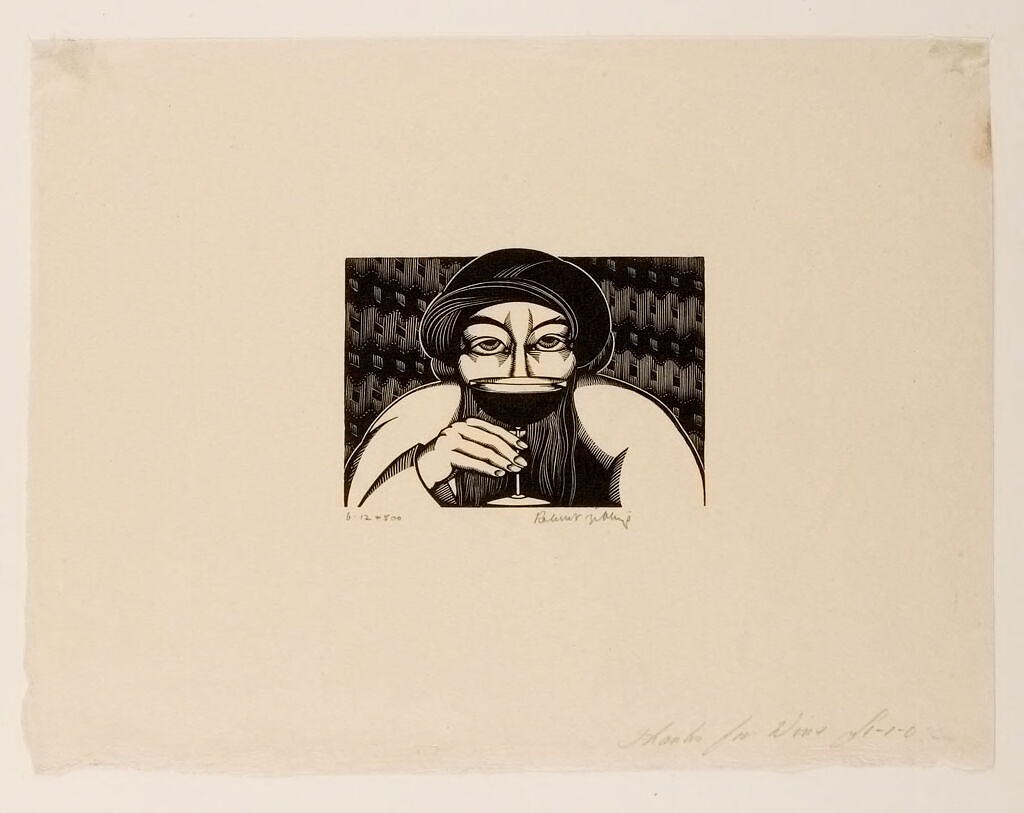
Robert John Gibbings: Thanks for Wine (20th century)
The Freedom To Not Quite Notice
I write without an outline, reorienting myself each morning depending on what I created the day before and how I feel in that moment. My intention involves letting the plot-line emerge rather than concocting it beforehand, though this practice guarantees a few inconsistencies. I cannot return to make up a missed day, for my practice depends upon accepting whatever happens. If my laptop crashes and refuses to produce, I have no net to catch me. My iAlogue Series weighed in at only eighty-five stories rather than the usual ninety due to technology failures and some winter ennui, perfectly normal disruptions. My writing practice depends upon an uncertain amount of innocence on my part, a dedicated absence of artifice. I sometimes embarrass myself, but fortunately for me, I rarely notice. One of the joys of naive practice must be the freedom to not quite notice or care when I crash.
Fambly
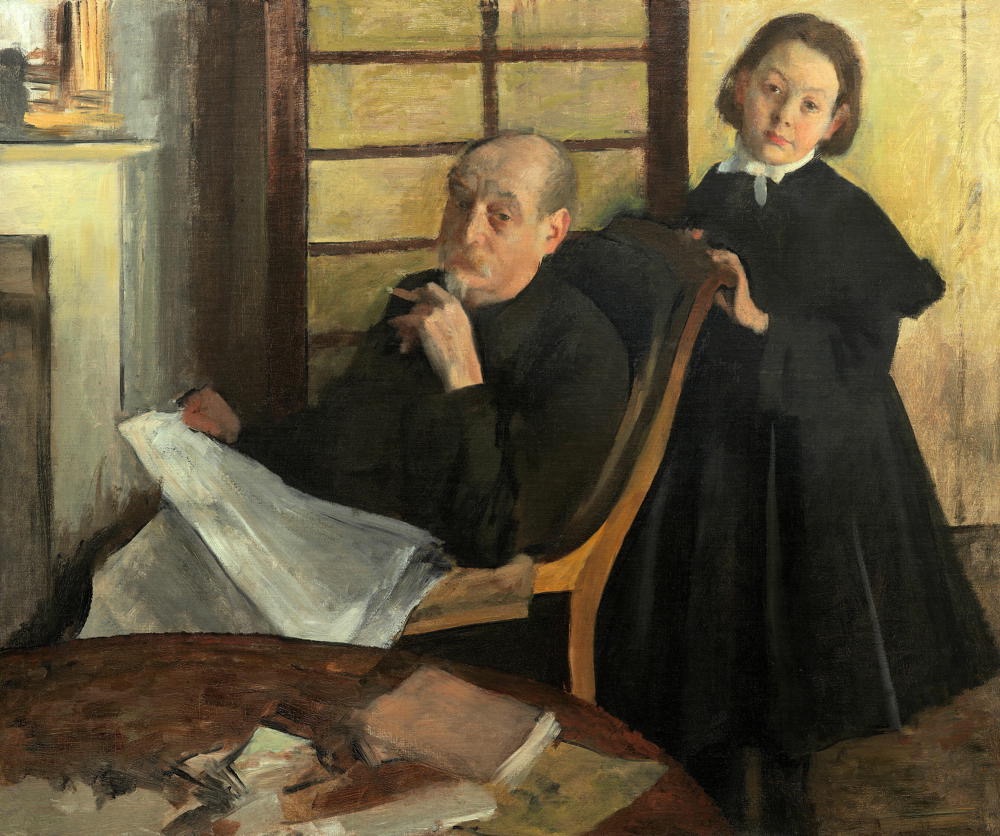
Edgar Degas:
Henri Degas and His Niece Lucie Degas
(The Artist’s Uncle and Cousin) (1875/76)
“ … Their marriage was long and contentious …”
Family's different. Whatever the usual rules entail, notable exceptions exist for family members. Greater patience might seem necessary, and such patience gets granted without making too much of a spectacle. Family served as the primary medium for your orientation in this world, much more than school, church, or other affiliations. It served as the teacher when nobody noticed anybody teaching anything and the student when nobody noticed anybody learning anything. Its lessons were subtle and sometimes profound. They helped set up patterns that would resonate in your behavior for generations. You probably passed some of them on to your children. You might notice a few appearing in your grandchildren, too. They represent the way your family works.
Families create their own language, which is slightly different from every other family's.


